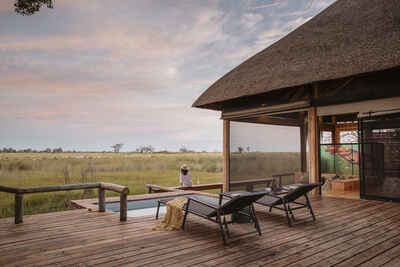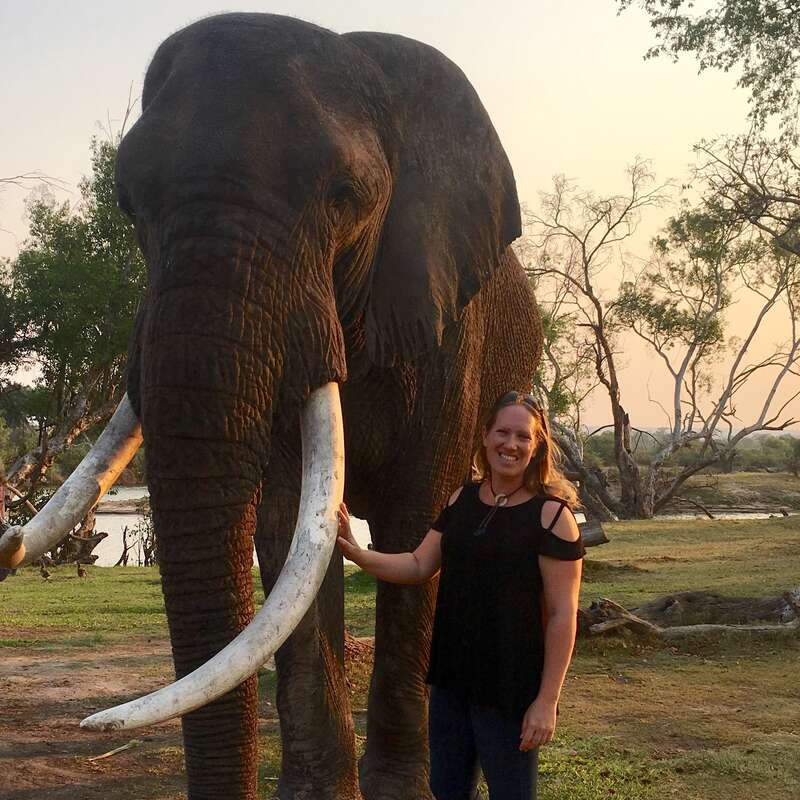About Vumbura Plains
As wildlife is drawn to the diverse Vumbura Reserve, so humans are drawn to the luxurious Vumbura Plains.
To be precise, there are twins here – two near-identical safari lodges run semi-independently to give the discerning visitor a top-of-the-range experience.
Key to that experience are space, standards and service.
Vast, open-plan suites feature floor-to-ceiling glass panels that afford cinematic views across the floodplains. Watch from the huge canopied bed set up on its own platform; from the cushioned sofa; from the extensive deck complete with private plunge pool and shaded daybed.
In the sprawling heart of each lodge, the multi-level approach continues across wooden decks that open onto relaxing sunken lounges, and play host to beautifully laid tables for an excellent dinner under the stars.
Beautifully finished wood is balanced by softly toning fabrics to give a natural yet contemporary feel. And safari bonuses include 24-hour power for hairdryers, binoculars in each suite, a coffee machine that dispenses cappuccinos and lattes at will.
To lure you away, a team of guides is ready to showcase the animals and birds of this diverse reserve, with predator sightings unusually high. Whether you’re on land or on the water, you’ll be in the best company.
Our view
Vumbura Plains is not a typical bush lodge by any stretch of the imagination. Dubbed a “premier” camp, it is unlikely to appeal to someone who is after a more traditional safari camp. However, for those who “want it all”, it offers a very good game experience with exceptionally high standards of service, attention to individual needs, excellent food and luxurious surroundings. While it isn't cheap, we think that this is a camp that delivers.
Accommodation
14 suites
Children
Best for ages 12+
Open
All year
Activities

4WD Safari

Birdwatching

Boat trip

Fishing

Guided walking safari

Helicopter

Mokoro

Night drive

Private activities
Traveller reviews of Vumbura Plains
37 real, un-edited reviews from Expert Africa's travellers.
Arrived 2 Sep 2022, 3 nights
"Vumbura Plains review"
Overall rating: Excellent
Arrived 7 Sep 2022, 4 nights
"Vumbura Plains review"
Overall rating: Excellent
Arrived 8 May 2022, 2 nights
"Vumbura Plains review"
Overall rating: Excellent
Arrived 3 Mar 2019, 3 nights
"Vumbura Plains review"
Overall rating: Excellent
Arrived 24 May 2018, 3 nights
"Vumbura Plains review"
Overall rating: Excellent
Arrived 21 Dec 2017, 3 nights
"3 night stay at Vurumba"
Overall rating: Good
Arrived 1 Nov 2016, 3 nights
"Vumbura Plains review"
Overall rating: Good
Arrived 21 Oct 2016, 1 nights
"Vumbura Plains review"
Overall rating: Good
Arrived 9 Jul 2016, 2 nights
"Great start & introduction to Okavango Delta"
Overall rating: Good
Arrived 19 Nov 2015, 3 nights
"Simply the best"
Overall rating: Excellent
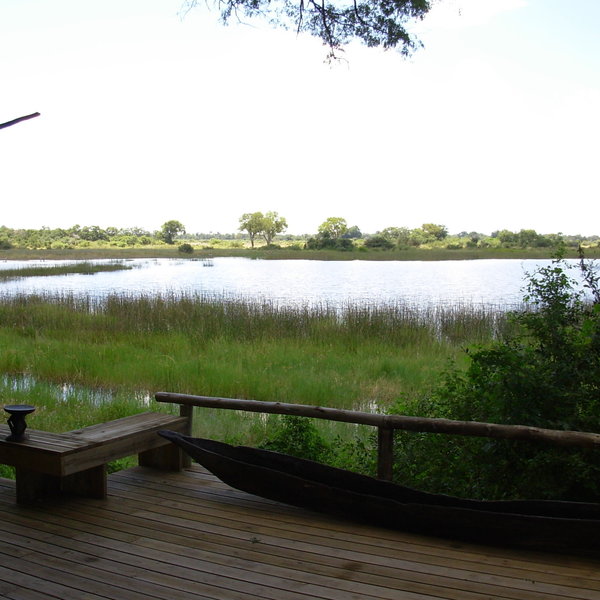
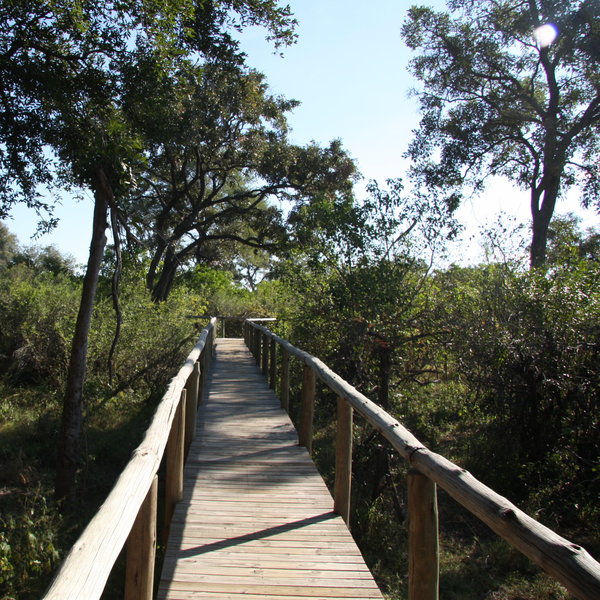
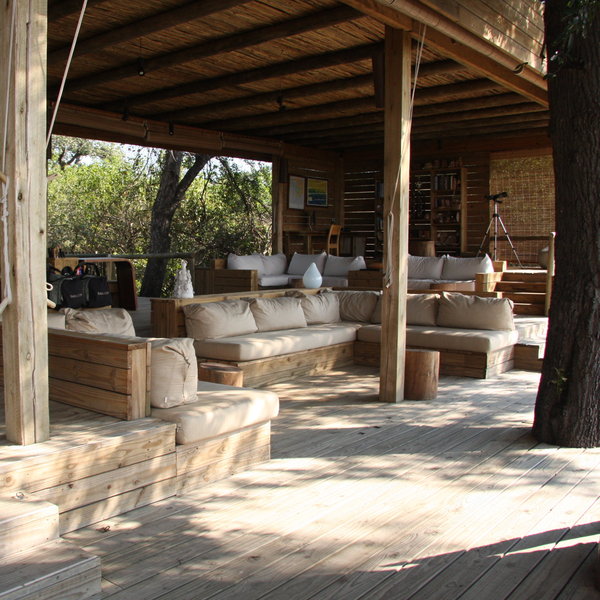
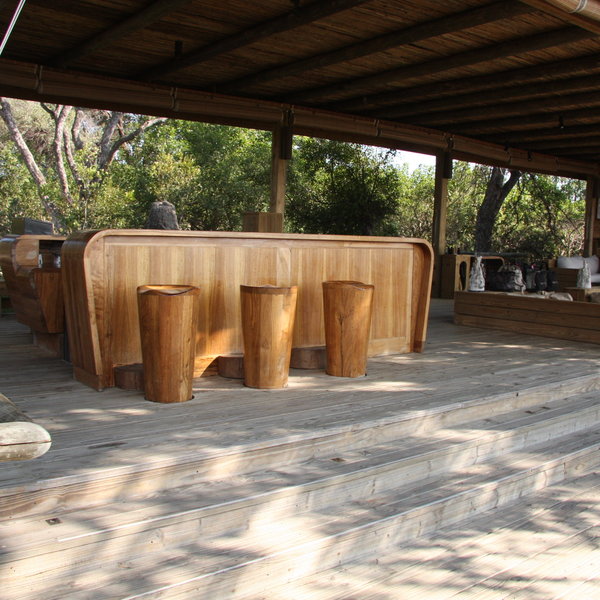
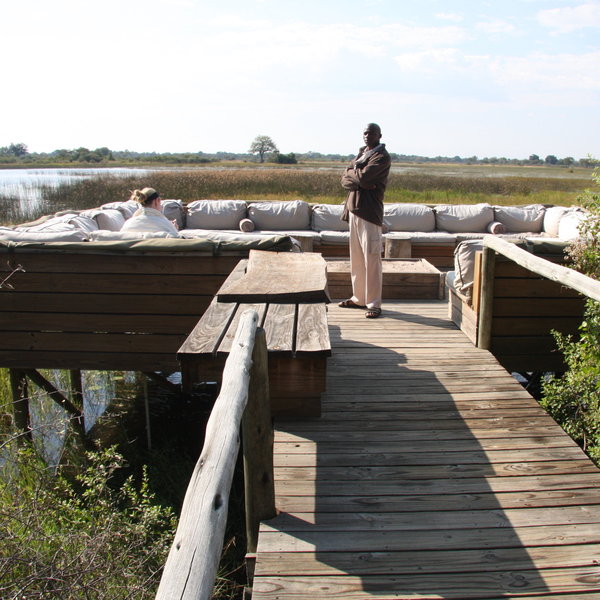
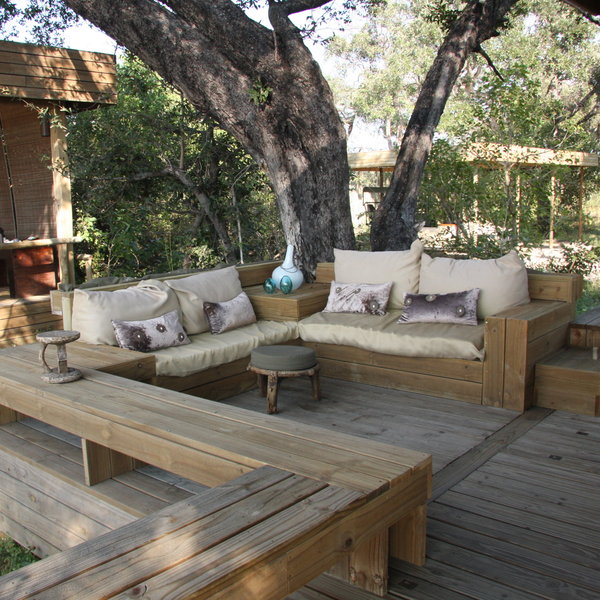
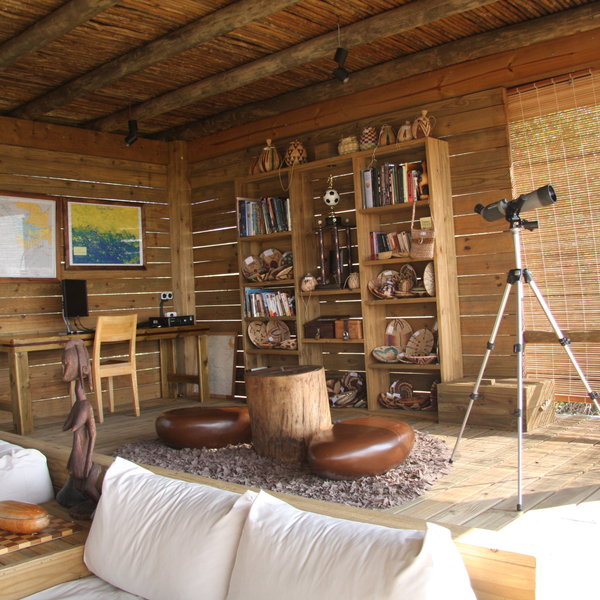
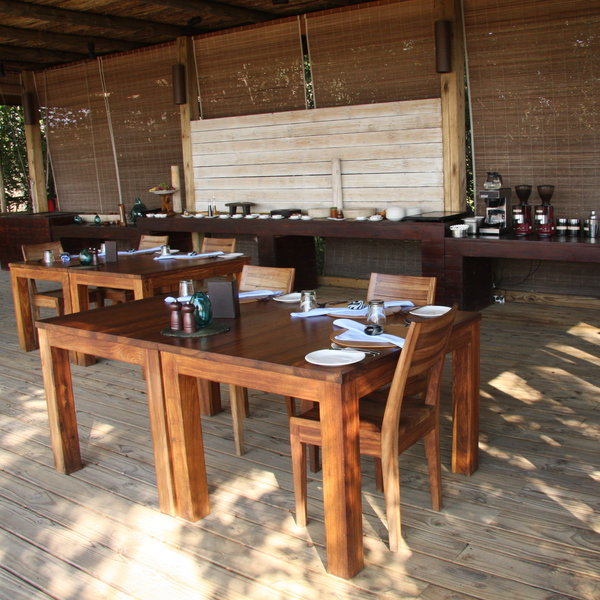
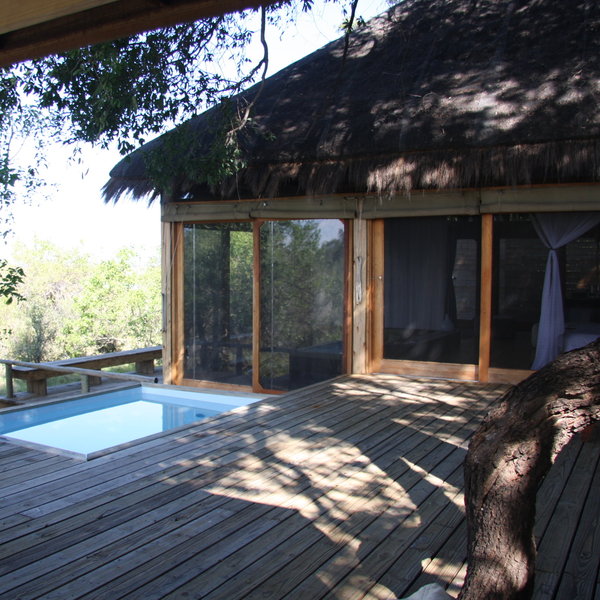
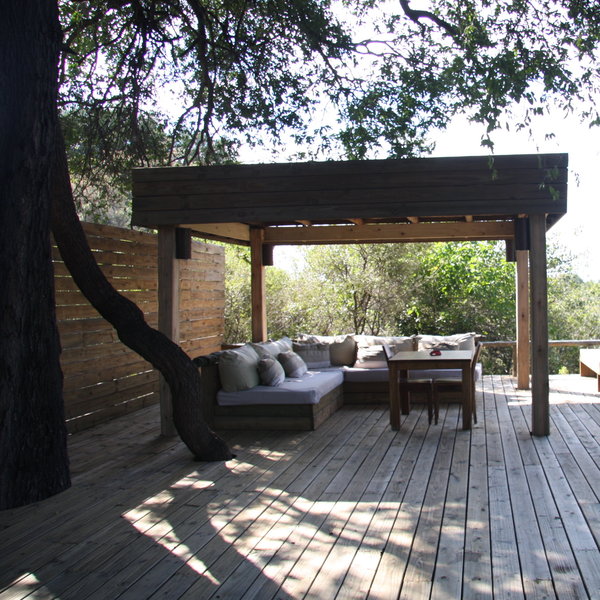
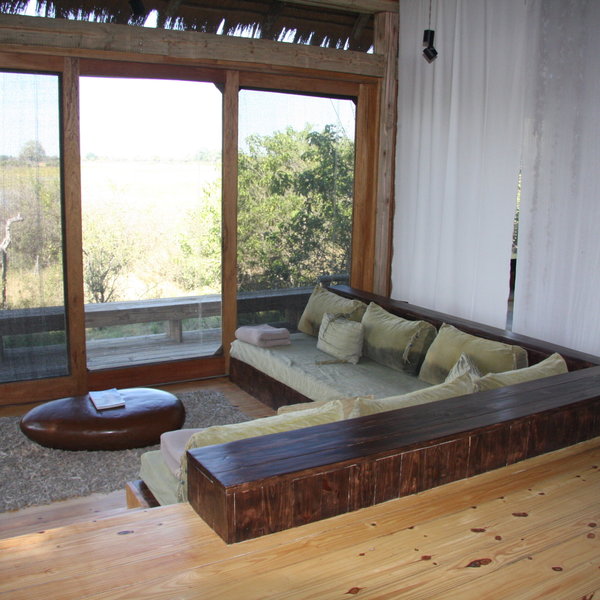
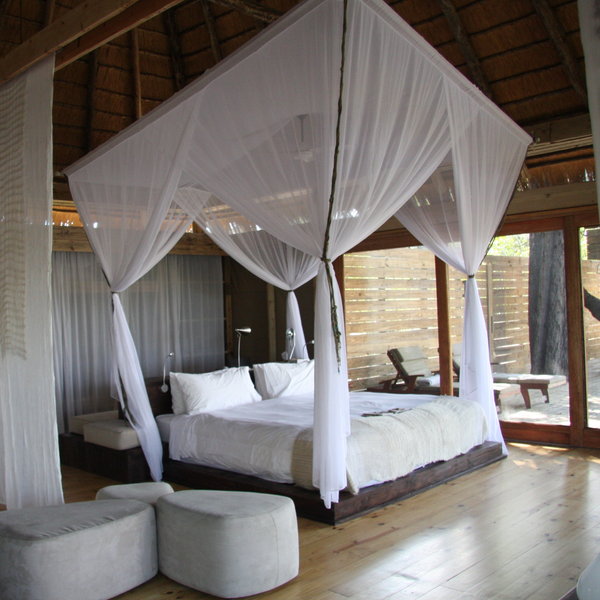
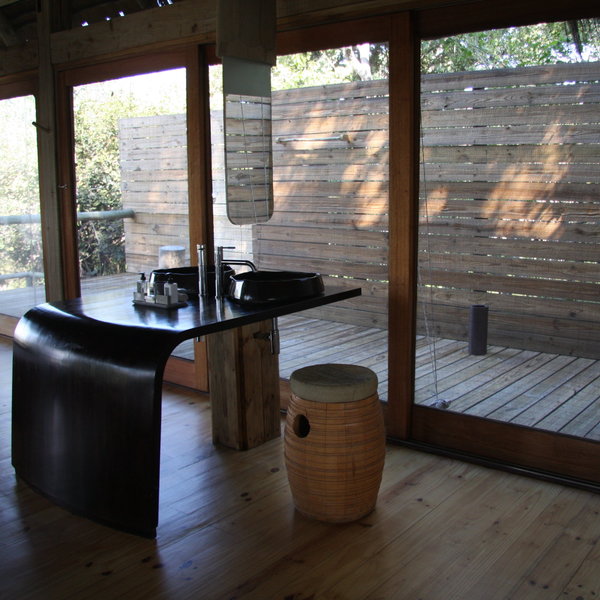
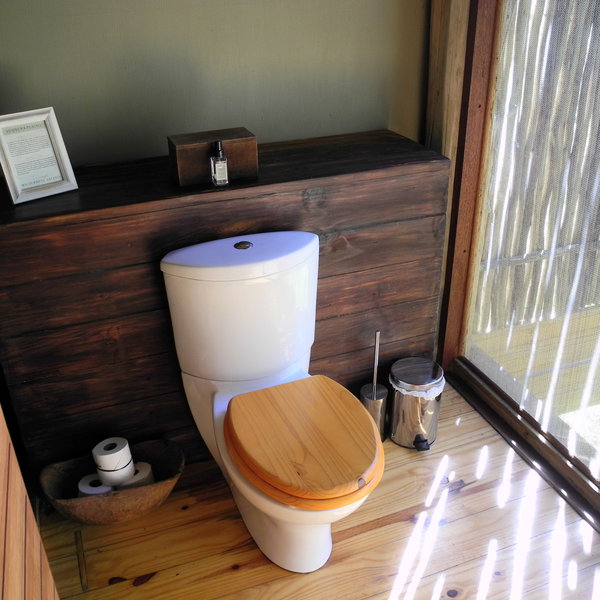
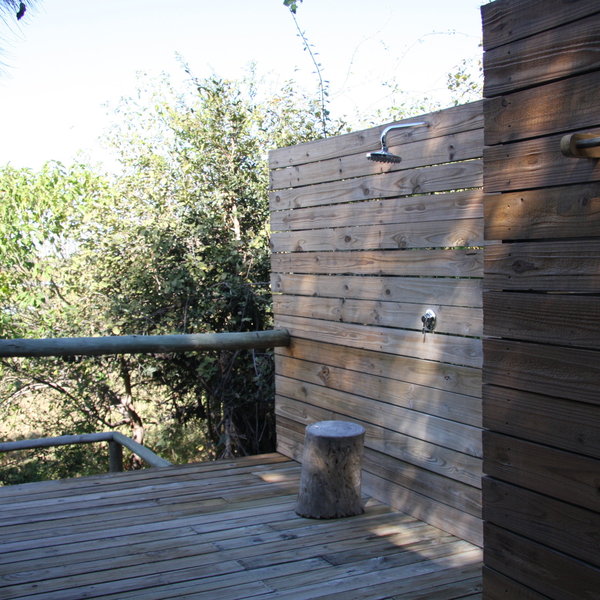
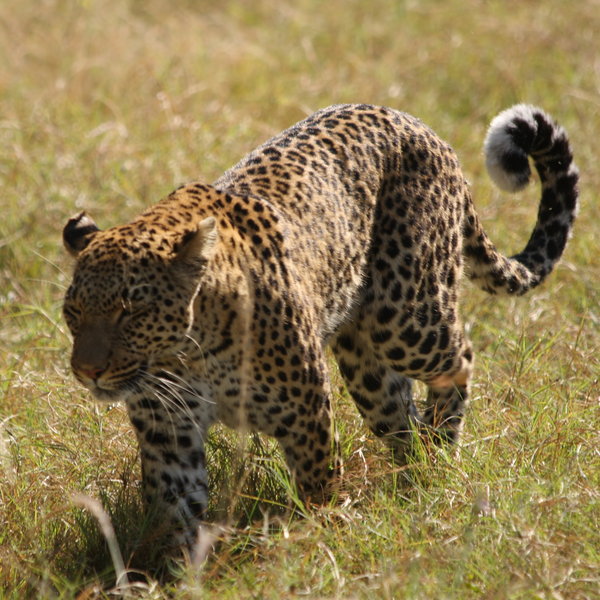
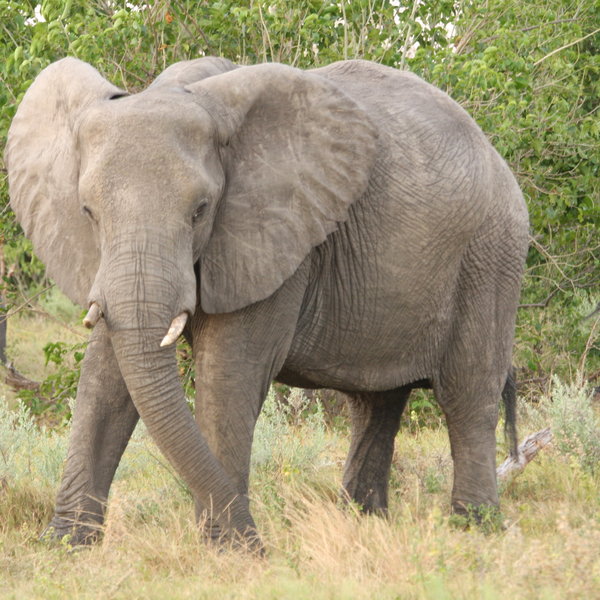
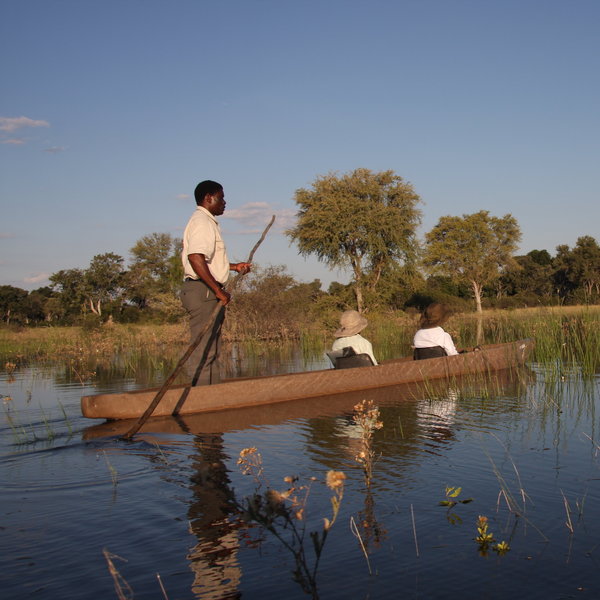
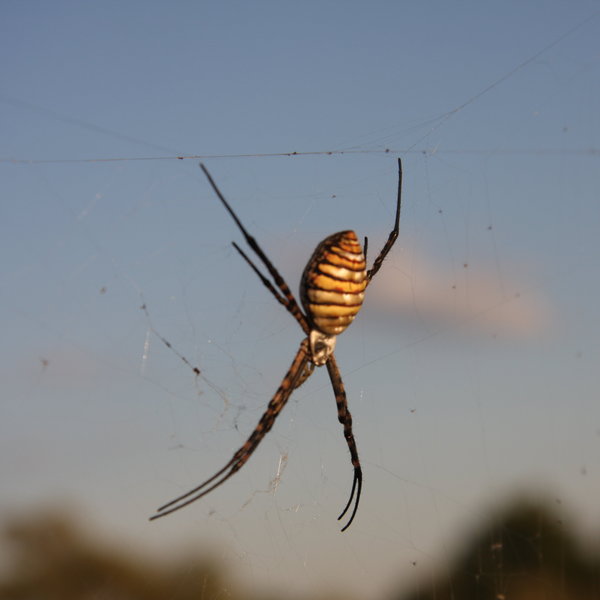
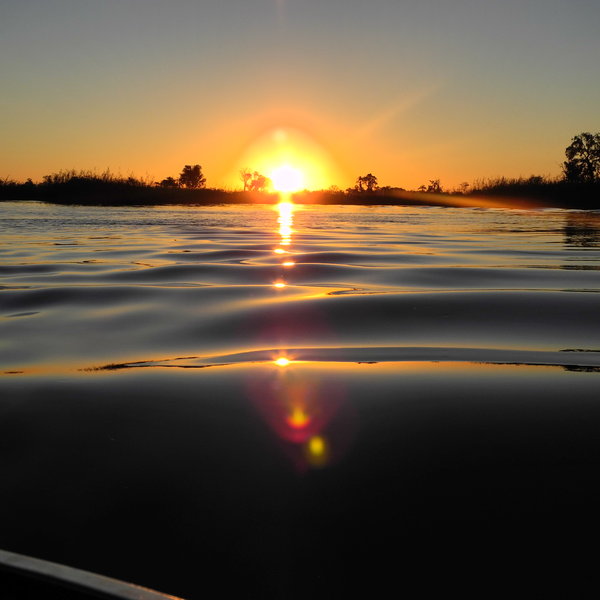
Expert Africa's gallery
When we travel we take lots of photos ourselves to give you a real and un-edited view of the safaris. See our 58 pictures of Vumbura Plains to get the candid view.
View gallerySafaris visiting Vumbura Plains
Just ideas, we'll always tailor-make a trip for you
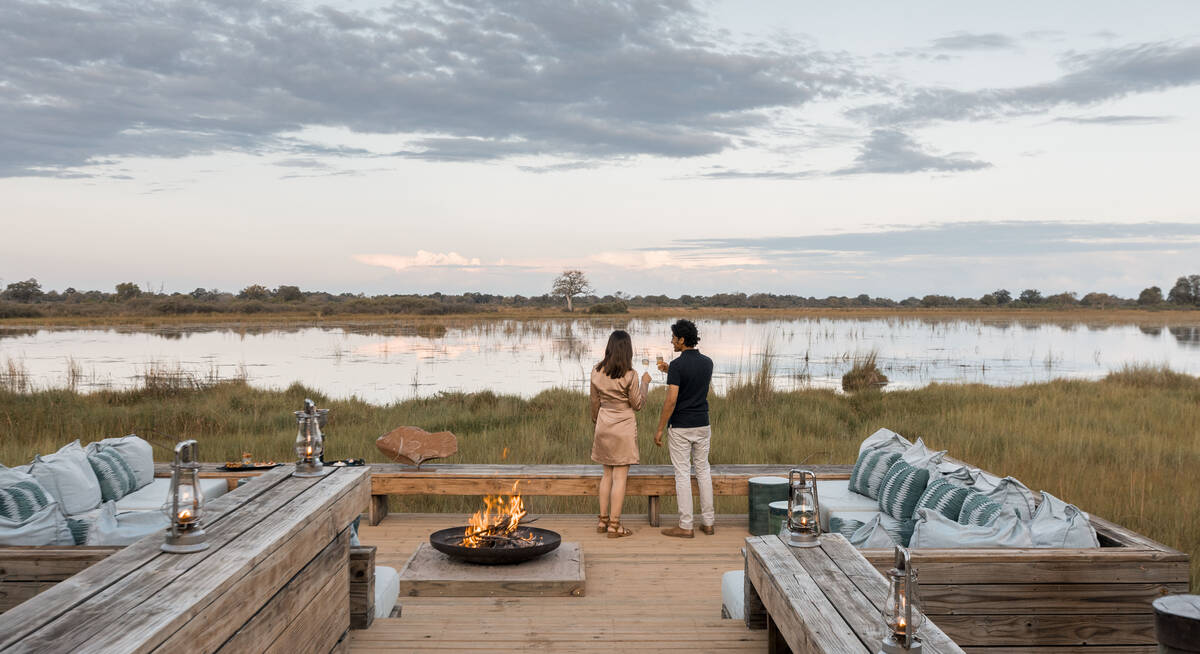
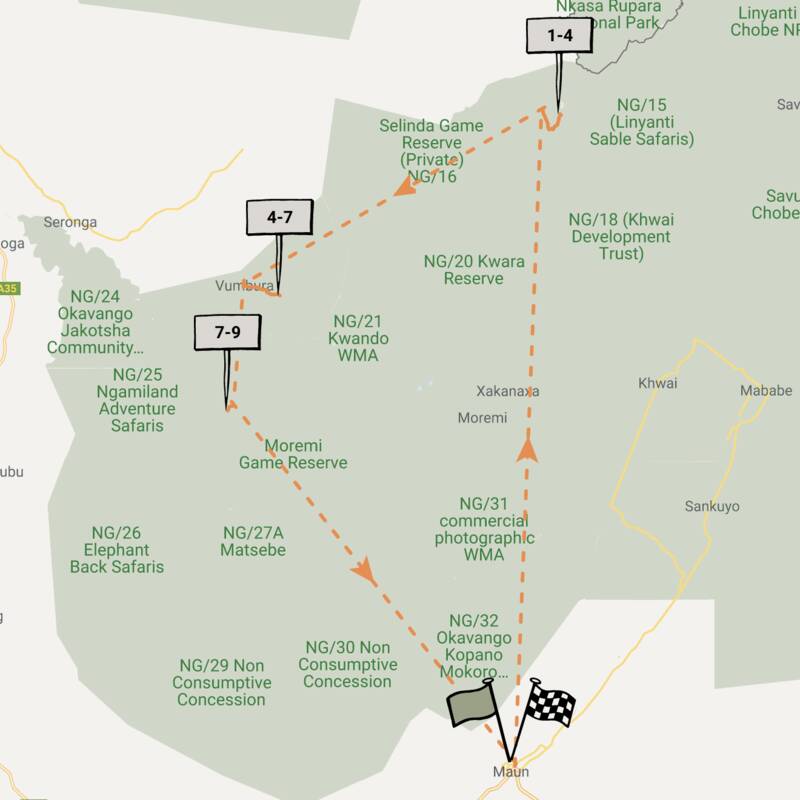
Reedbuck Safari
8 days • 3 locations • 1 country
MAUN AIRPORT TO MAUN AIRPORT
Focussing on the Okavango Delta and combining the crème de la crème of Botswana’s camps – Zarafa, Vumbura Plains and Mombo – this is one of the finest safari experiences in Africa.
Visiting Moremi & Surrounds, Okavango Delta and 1 other area
US$23,410 - US$36,280 per person
Vumbura Plains: Our full report
North of Botswana's Moremi Game Reserve is a series of large floodplains dotted with small palm islands and ...
... interspersed with large forested areas. Here, the Vumbura Reserve – known for wonderfully varied and high densities of game – is home to the two adjacent camps that make up Vumbura Plains. Imagine a luxury hotel of contemporary, minimalist design, deep in the Okavango Delta, and you're nearly there.
The two camps that make up Vumbura Plains – North Camp and South Camp – are run semi-independently, sharing the reserve with their smaller sister camp, Little Vumbura.
Each of Vumbura Plains' camps has seven cavernous suites, spaced well apart and raised up on decks. These open-plan suites with high thatched ceilings really are luxurious, even by Botswana's standards, each with its own very private plunge pool and deck, and lots of safari-chic touches. At North Camp, two of the suites are designed with families in mind, each with two bedrooms.
Inside, the suites are positively palatial. Floor-to-ceiling glass panels frame each suite on three sides, maximising the views of the surrounding bush. Decked out in light wood and natural hues, the bedroom, sunken lounge and bathroom flow almost seamlessly into one another, with only the odd billowy curtain to separate them. The result is a very restful space, although the downside is a distinct lack of privacy.
Set up on a slightly raised platform is a mammoth bed under an equally immense mosquito net, and to the front is a sunken lounge area. The back of the room creates space for a writing desk with plug points suitable for a laptop, charging electrical equipment or the hairdryer, and ample storage space. There is a minibar fridge as well as tea- and coffee-making facilities. All the rooms have a ceiling fan and small safe, with binoculars, umbrellas, dressing gowns, mosquito repellent, insect spray and mosquito coils all provided.
One half of each suite is essentially the “bathroom” area. The shower is open-plan, although floor-to-ceiling curtains can be pulled on one or more sides for privacy. A second large shower is set outside, under the stars. A separate flushing toilet, twin washbasins and a vanity unit complete the picture, complemented by a good selection of toiletries.
Outside each suite is a large private decked area, with its own plunge pool, sunloungers. A covered “sala” is kitted out with a sofa and small table for occasions when you might prefer to “dine in”.
High wooden walkways link the suites at Vumbura Plains with the central areas. Whilst North and South camps are not identical, these sprawling areas are similar in style and provide the same facilities. In each camp, the deck seems to flow into sunken lounges with their blend of muted earth-coloured and green cushions. The purposeful use of shapes lends a stylish, almost organic feel, albeit very modern.
Guests are encouraged to help themselves from the bar – although there will usually be a member of staff on hand to help. Fancy a latte? Craving a cappuccino? No problem! You can indulge in both, courtesy of a rather elaborate coffee machine.
A large portion of the deck is dedicated to the dining area – part of it under cover and part under the stars – adorned with wooden carvings and interesting African sculptures. A short boardwalk from the main lodge brings you to a quirky “loo with a view” (and it's a rather good view too).
Vumbura Plains offers a wide choice of activities, including day and night 4WD game drives, mokoro trips and sometimes short walks – although because of the density of big game, walks are always at the discretion of the guides and managers. When water levels are high enough, the nearby channel is also used for motorboat trips – and on one visit we were offered the opportunity to do a spot of catch-and-release fishing.
Over numerous visits to the Vumbura Reserve, stretching back to around 1990, we've consistently noted how varied the game is here, including the predators – and how it has gone from strength to strength. Lion are relatively common, and the open areas suit cheetah and wild dog, which sometimes den in the vicinity. Leopard and spotted hyena are also seen frequently.
While we didn’t stay overnight on our most recent visit, in November 2019, on previous stays at Vumbura Plains the guiding has always been very good and there has usually been an exceptional array of sightings, emphasising the variety and densities of the game in the reserve. Over the years we have encountered lion, leopard, elephants, zebra, wildebeest, giraffe and a particularly large range of antelope, including red lechwe, impala, tsessebe and kudu. The birdlife is equally varied, ranging from wetland species such as wattled cranes to woodland species such as the bateleur.
Geographics
- Location
- Okavango Delta Safari Reserves, Botswana
- Ideal length of stay
- A stay of three nights is ideal at Vumbura Plains.
- Directions
- Access to Vumbura Plains is usually by light aircraft, followed by a 30-minute drive from the airstrip to the camp. There is also a helipad for guests wanting to charter a helicopter.
- Accessible by
- Fly-and-Transfer
Food & drink
- Usual board basis
- Full Board & Activities
- Food quality
- Although the general format of meals at Vumbura Plains is similar to most camps in the Okavango, the lodge aims to be more adaptable than most to the needs of individual travellers. One of the ways they do this is by offering the option of individual table settings rather than communal dining; another is by being more flexible on mealtimes.
Although we didn’t stay overnight in November 2019, on our previous stay, all our meals were excellent – as you would expect from a camp of this calibre. The camp can cater to vegetarians and any other special dietary requirements, if a good amount of notice is given.
A light breakfast is laid out before departing on the morning activity, comprising a selection of cereals, fruit, yoghurt pots, muffins, croissants, cheeses and cold meats – with a cooked option for those who want it.
Brunch is usually available from around 11.00am, after the morning's activities, although some guests prefer to eat a little later. For our brunch, which was served individually upon request, we chose an ostrich tart, but other options were soup, various salads and fresh bread.
Afternoon tea, just before heading out on the afternoon activity, is always a treat. In addition to freshly baked cakes, tarts and savoury snacks, there is often a freshly made smoothie. We particularly enjoyed risotto balls.
Unlike the traditional buffet served at many camps in Botswana, dinner is usually a plated three-course meal, although this depends on guest requests. We started with calamari, then for the main course there was a choice of bream with roast vegetables, or a fillet of local beef with potato dauphinoise. On one visit dinner was rounded off with a very tasty lemon tart with homemade ice cream.
Once a week, usually on a Monday, Vumbura Plains offers a traditional dinner buffet – which for us was served in a clearing not far from camp and beautifully decorated using lanterns. This is usually a very festive evening when guests dine together around a large table, but individual tables can be arranged for those who prefer to dine separately. - Dining style
- Individual Tables
- Dining locations
- Indoor and Outdoor Dining
- Further dining info, including room service
- There is no room service and no telephone, but if arranged in advance, the camp will usually try to accommodate reasonable requests for a main meal to be served in your suite.
- Drinks included
- Bottled water, soft drinks, local beers and spirits and a limited selection of (usually) South African red and white wines are included. Champagne and imported wines and spirits cost extra and, although the cellar is well-stocked, may need to be requested in advance.
Each room is provided with glasses and a flask of filtered drinking water that is replenished daily. Although plastic bottles of water are available, guests are encouraged to top up from the filtered water in the camp's main area. We don't recommend that travellers drink from the tap.
Special interests
- Honeymoons
- For an exceptionally lavish safari honeymoon in Botswana, Vumbura Plains is perfect: a great romantic getaway with a contemporary feel. And if you can bear to tear yourself away from your palatial and luxurious suite, you'll be spoiled with superb game viewing.
- See ideas for Honeymoons in Botswana
- Birdwatching safaris
- Ranging from open floodplains to dense mopane bushveld, Vumbura Plains has wonderful birding opportunities all year round. Species you are likely to encounter include wattled crane, slaty egret, chirping cisticola and possibly rosy-throated longclaw.
- See ideas for Birdwatching safaris in Botswana
- Photography safaris
- Vumbura Plains is located on Botswana’s Kwedi Concession. The range of environments here are not only attractive in their own right but also draw large numbers of wildlife and birdlife. All this makes Vumbura a fantastic stop for photographers.
- See ideas for Photography safaris in Botswana
- Wellbeing
- Vumbura Plains offers in room yoga mats, skipping ropes and small free weights. Coupled with an in-house masseuse and private plunge pools for each room and this is a wonderful place for some rest and relaxation on your Botswana safari.
- See ideas for Wellbeing in Botswana
- Luxury safaris
- Vumbura Plains is a high-end camp that offers – and delivers – excellent standards of food and individual service in luxurious modern surroundings. Enjoy the excellent game experience, or simply retreat to your suite to relax or have a dip in your private plunge pool.
- See ideas for Luxury safaris in Botswana
Children
- Attitude towards children
- Children over the age of 12 years are welcome at Vumbura Plains. The camp may accept those aged 6–12, but private activities must be booked and these will be at extra cost. Children younger than six may be accepted by special arrangement, but only if the entire camp is reserved for exclusive use.
- Property’s age restrictions
- Children under the age of 16 must share a room with an adult.
Note that minimum age requirements mean that children are allowed on boat trips from the age of six years, but may not participate in mokoro and walking trips under the age of 13 years. - Special activities & services
- Vumbura Plains has a new and complimentary “Bush Buddies” programme, whereby a dedicated member of staff is allocated to families with children. This needs to be requested in advance, prior to arrival. Each child is given a safari bag filled with things such as a bug viewer, a safari guide booklet, a water bottle, cap and torch. Activities, variously entertaining and educational, may include arts and crafts, short nature walks around the camp, tracking lessons, bird and animal call identification, treasure hunts, baking biscuits and cooking lessons in the bush (for example, pizza-making in termite mounds), as well as dancing and drumming, star-gazing and storytelling.
The camp will also arrange separate mealtimes and menus for families with young children. - Equipment
- There are two family-style two-bedroom units at Vumbura Plains North Camp, but no special equipment is provided for children.
- Generally recommended for children
- The more individual approach of Vumbura Plains is conducive to flexibility and thus to the needs of families with children. The suites have space for children to play and for the family to relax together. There are no specific facilities or activities for children, however, so the camp is probably best suited to families with more mature children who are genuinely interested in the natural world.
- Notes
- Vumbura Plains is unfenced, and dangerous wildlife, including leopard and elephants, is known to move regularly through camp. The walkways and suites are all raised off the ground, with basic handrails only. The plunge pools are unfenced, and the camp is in close promixity to open water for much of the year. Children must be under the constant supervision of their parents or guardians.
Our travellers’ wildlife sightings from Vumbura Plains
Since mid-2018, many of our travellers who stayed at Vumbura Plains have kindly recorded their wildlife sightings and shared them with us. The results are below. Click an animal to see more, and here to see more on our methodology.

100% success

100% success

100% success

100% success

100% success

100% success

80% success

75% success

60% success

50% success

25% success

25% success

0% success

0% success

0% success

0% success

0% success

0% success
Communications
- Power supply notes
- Power Power is primarily provided by solar energy with generators used as back-up – effectively giving 24-hour power. There are plug points in the suites for charging equipment and it is possible to use hairdryers.
- Communications
- There is no cellphone reception, no direct phone and no email. Communication is maintained with the head office in Maun via radio.
- TV & radio
- There is no television or radio.
- Water supply
- Other
- Water supply notes
- All the suites have plumbed hot and cold running water for showers, and flush toilets. Each room is provided with glasses and a flask of filtered drinking water that is replenished daily. Although plastic bottles of water are available, guests are encouraged to top up from the filtered water in the camp's main area. We don't recommend that travellers drink from the tap.
Sustainability
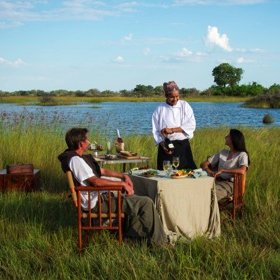
A taste of the local cuisine
The luxurious camp at Vurumba Plains is built on land leased from the nearby villages of Seronga, Gunotsoga, Eretsha, Beetsha and Gudigwa through a concession agreement which ensures tourism activities contributing to the welfare and development of neighbouring communities. But for a healthy partnership to flourish, both guests and locals need to be equally considered. Chefs at Vurumba Plains seem to have found the answer in the local cuisine.
While guests indulge in the authentic cuisine of Botswana - made only with fresh and locally-sourced ingredients (where possible), local farmers and prosperous merchants are expanding their business, thus stimulating an increase in the household incomes of many families. A wide variety of dishes is served, on a seasonal-rotation and depending on individual preferences to please every taste, but one thing remains the same throughout the year: waste disposal. Delivery boxes are collected and returned to suppliers and other efforts such as informing guests and staff about how to separate waste properly made a significant difference in recycling rates.
See more great sustainability projects in Botswana
Health & safety
- Malarial protection recommended
- Yes
- Medical care
- Vumbura Plains' managers are first-aid trained, and a first-aid kit is kept on site. There is a nurse in Maun who is on call and can be contacted by radio 24 hours a day. In the event of an emergency, guests can be flown out to the nearest doctor in Maun. However, please note that it is only possible to fly out of camp during daylight hours as the bush airstrips do not have any lighting at night.
- Dangerous animals
- High Risk
- Security measures
- Air horns are provided in the suites to sound the alarm in case of emergency. Guests are escorted to and from their suites after dark.
- Fire safety
- Fire extinguishers are located in all the suites and in the main area.
Activities
4WD Safari
Birdwatching
Boat trip
Fishing
Guided walking safari
Helicopter
Mokoro
Night drive
Private activities
Extras
- Disabled access
- On Request
- Laundry facilities
- A full laundry service is included and, wherever possible, items will be returned to guests on the same day.
- Money
- All suites are equipped with small electronic safes. There are no money- exchange facilities.
- Accepted payment on location
- MasterCard and Visa credit cards are accepted; Diners and Amex are not. Cash payments may be made in the form of South African rand, GB sterling, US dollars, euros and Botswana pula.
Plan and book your trip with Expert Africa
All of our trips are tailor-made, so we'll always adapt them to suit you. Talk to an Expert and let us plan and arrange your perfect trip.

Talk to an Expert
Call or email us now! We’ll match you with the Specialist in our team who is best suited to help you. Then together we can start planning your trip.

Set up your itinerary
Based on our experience and your ideas, your specialist will create a detailed, costed itinerary. We’ll refine it together, until we have a trip that you’re perfectly happy with.

Prepare for your trip
The same Specialist will make the seamless arrangements for your trip, send you detailed travel documents, and be available to answer any questions before you depart.

Travel with peace of mind
After you set off, you’ll be cared for by our partners in Africa, most of whom have worked with Expert Africa for decades. And if you ever need us urgently, we’re available 24/7.

When you return
We love to learn about your trip, and so will always be grateful if you’ve the time to give feedback to your Specialist when you return.
Vumbura Plains's location
Look closer at the environment and surroundings of Vumbura Plains.
Excursions from Vumbura Plains
Optional extra day-trips and excursions possible whilst you're staying at Vumbura Plains. Talk to us: these are usually best arranged before you go.
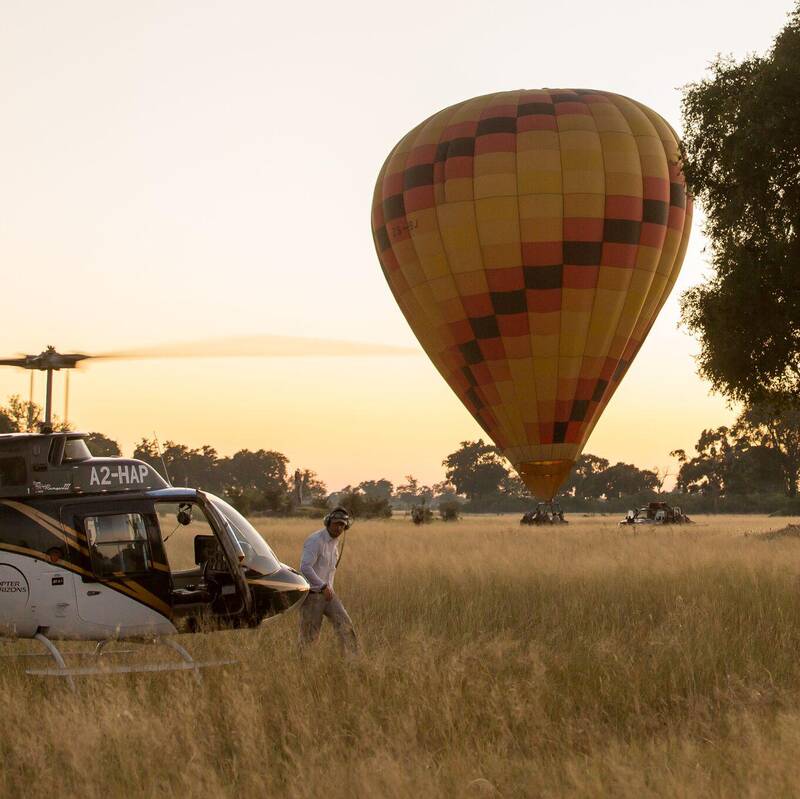
Ballooning in the Okavango Delta
Half day - mornings only
Airborne over the Okavango Delta is always magical - not only for its beauty, but also for insights it gives you into the patterns of channels, lagoons and floodplains. Floating silently at dawn, watching the early sun light up the misty palms islands and spotting the animals as they wake up is particularly enchanting.
More about Okavango Ballooning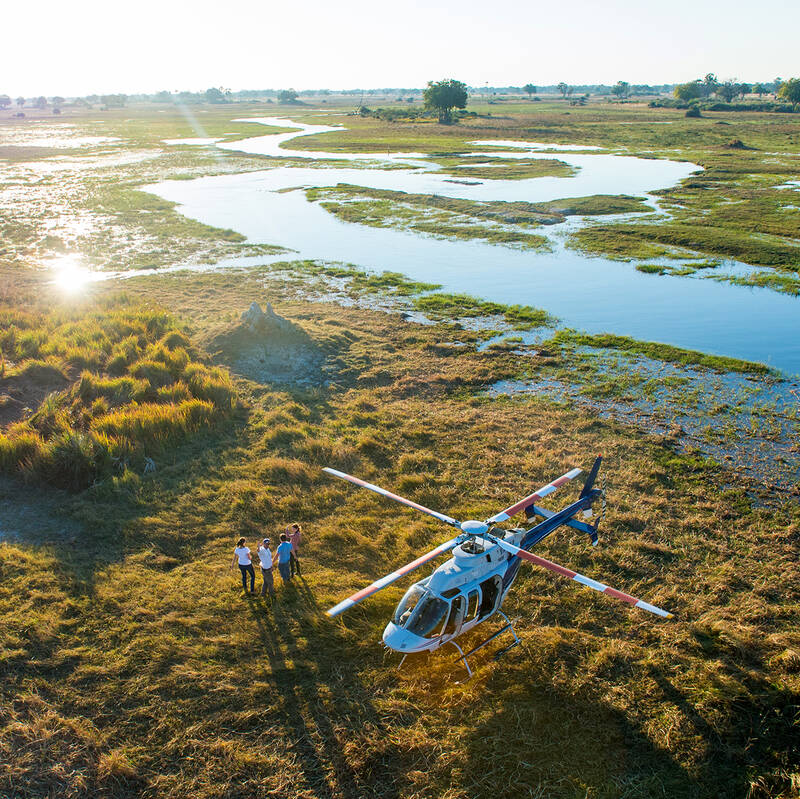
Helicopter Flight - Botswana
Various: from 30 minutes to half a day.
Low-flying, agile and offering superb views, helicopters are an ideal way to move around the Okavango Delta.You can use them instead of fixed-wing inter-lodge transfers or as an addition to other wildlife watching activities, and of course, helicopters can hover to allow that perfect pic, whereas fixed-wings can’t.
More about Helicopter FlightOther lodges in Okavango Delta Safari Reserves
Alternative places to stay in this same area.
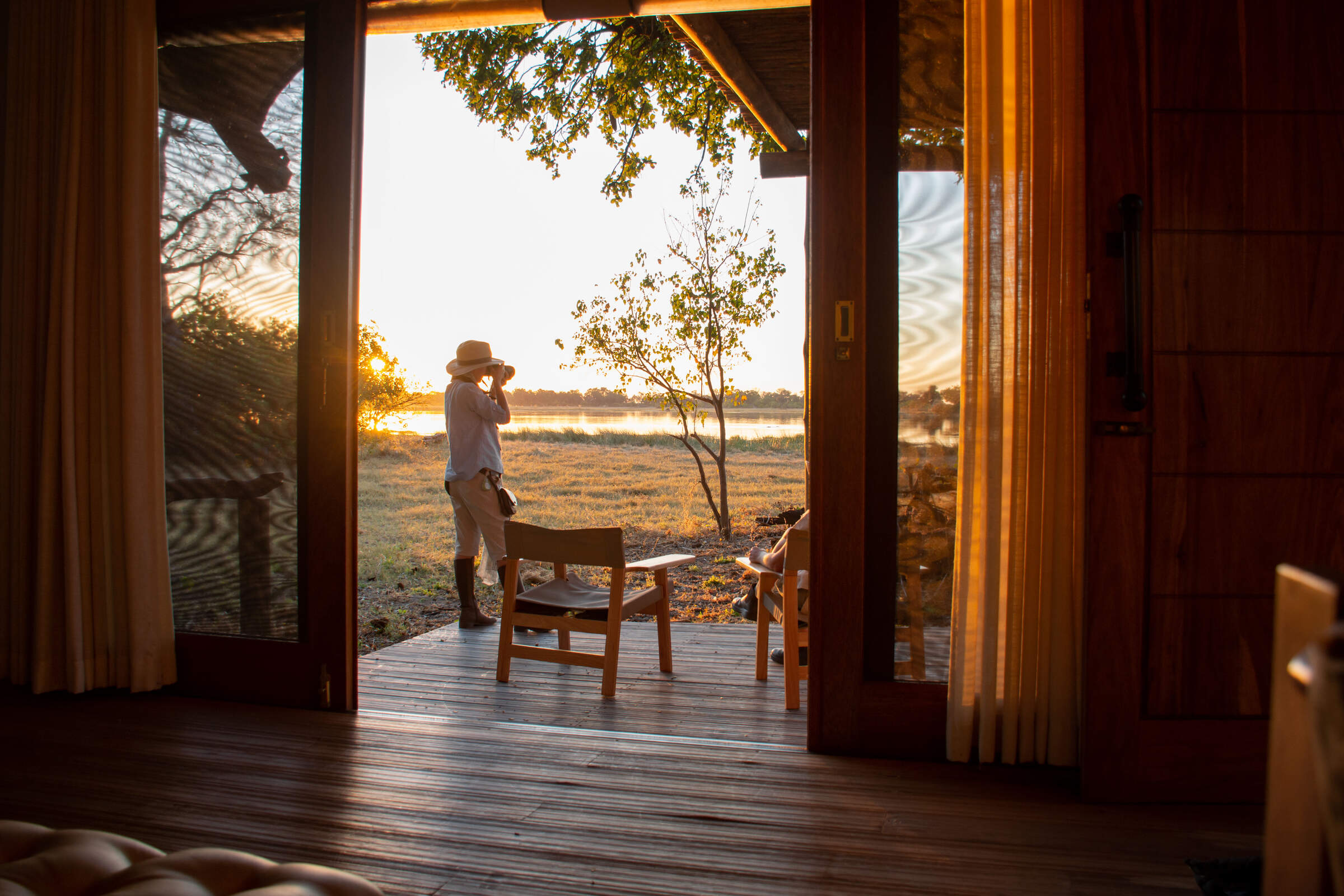
Kwara Camp
Kwara Camp's private reserve boasts land and water activities year-round, with excellent game-viewing opportunities and access to permanent channels of the north-east Okavango Delta.
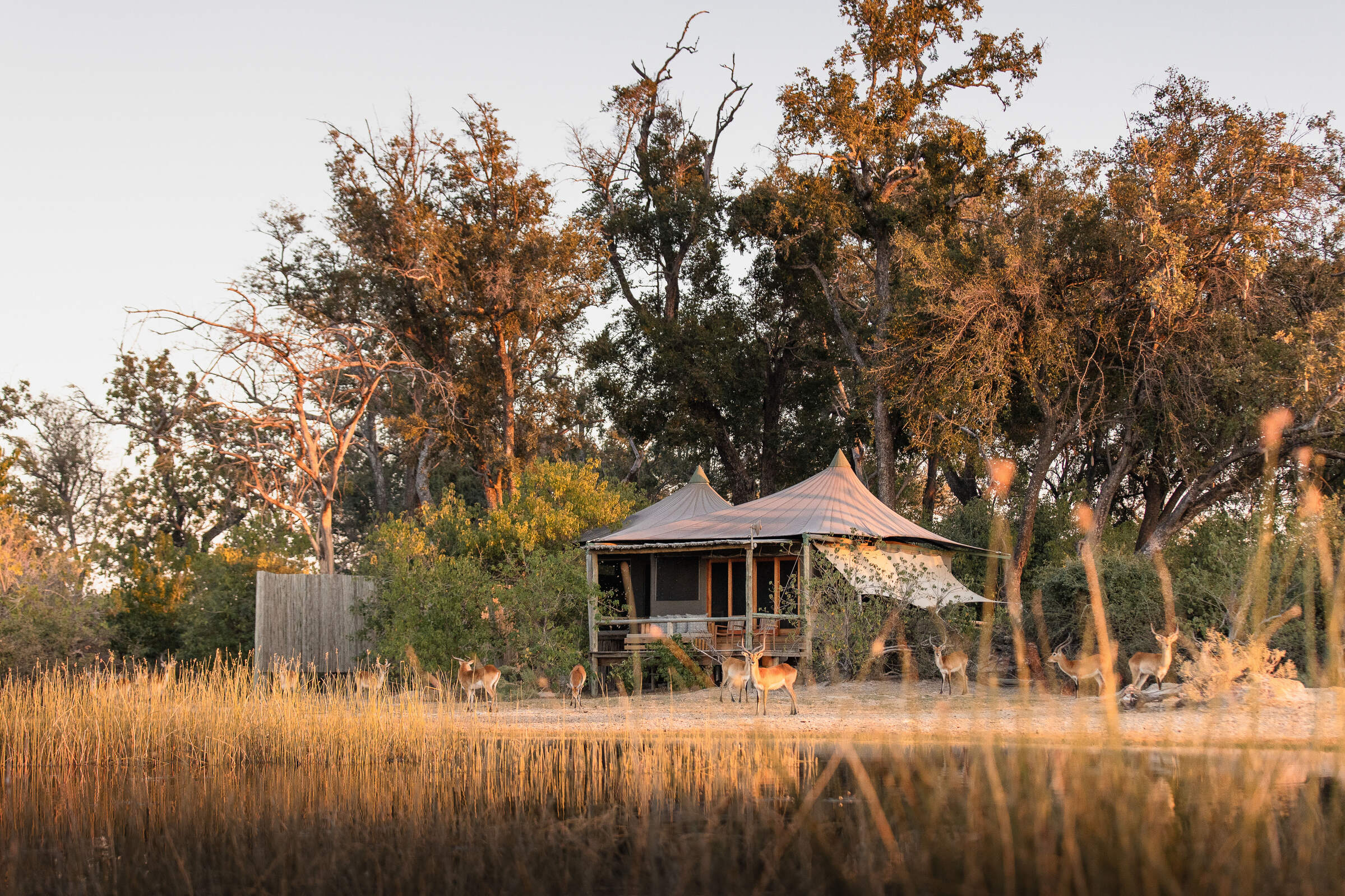
Little Vumbura
On a secluded island within a private reserve, Little Vumbura combines superb game viewing with a broad diversity of habitats in a truly picturesque setting.
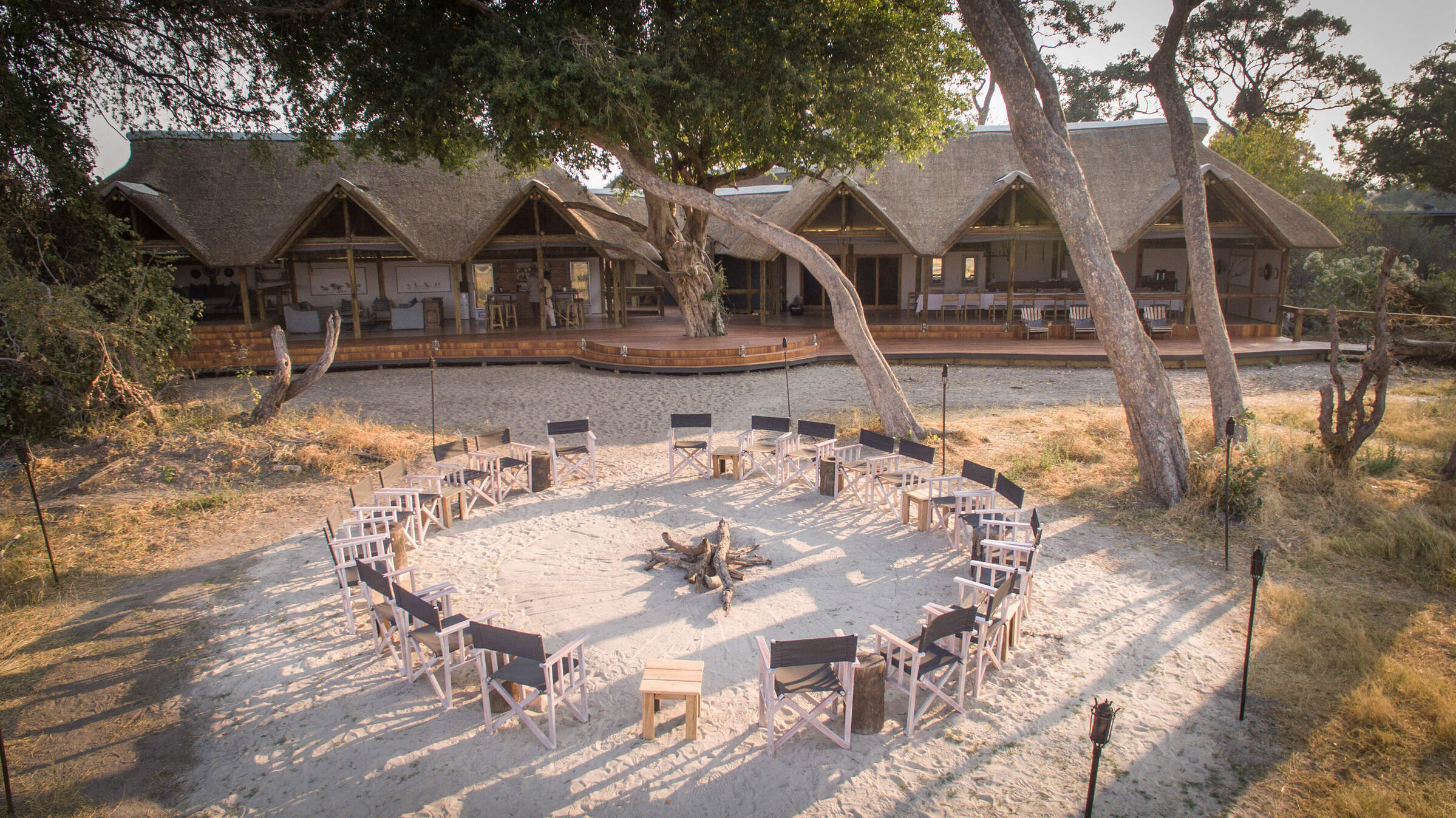
Splash Camp
Set in the Kwara Reserve, offering superb wildlife viewing year-round, Splash offers both land and water activities led by guides with a particular knack for tracking big game.
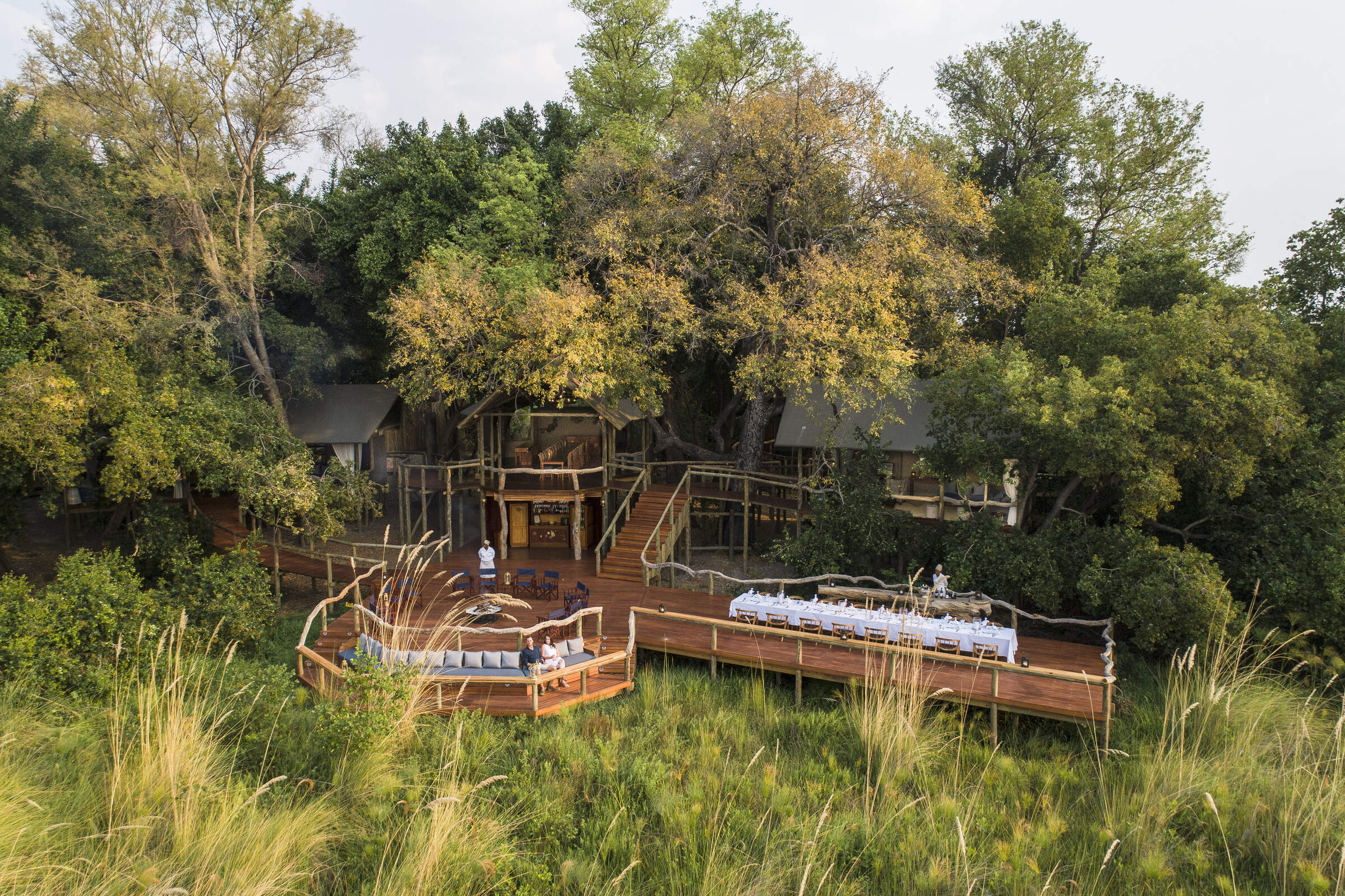
Shinde Camp
With experienced staff and a wealth of activities, Shinde offers a traditional safari in an exceptionally varied and wildlife-rich environment.
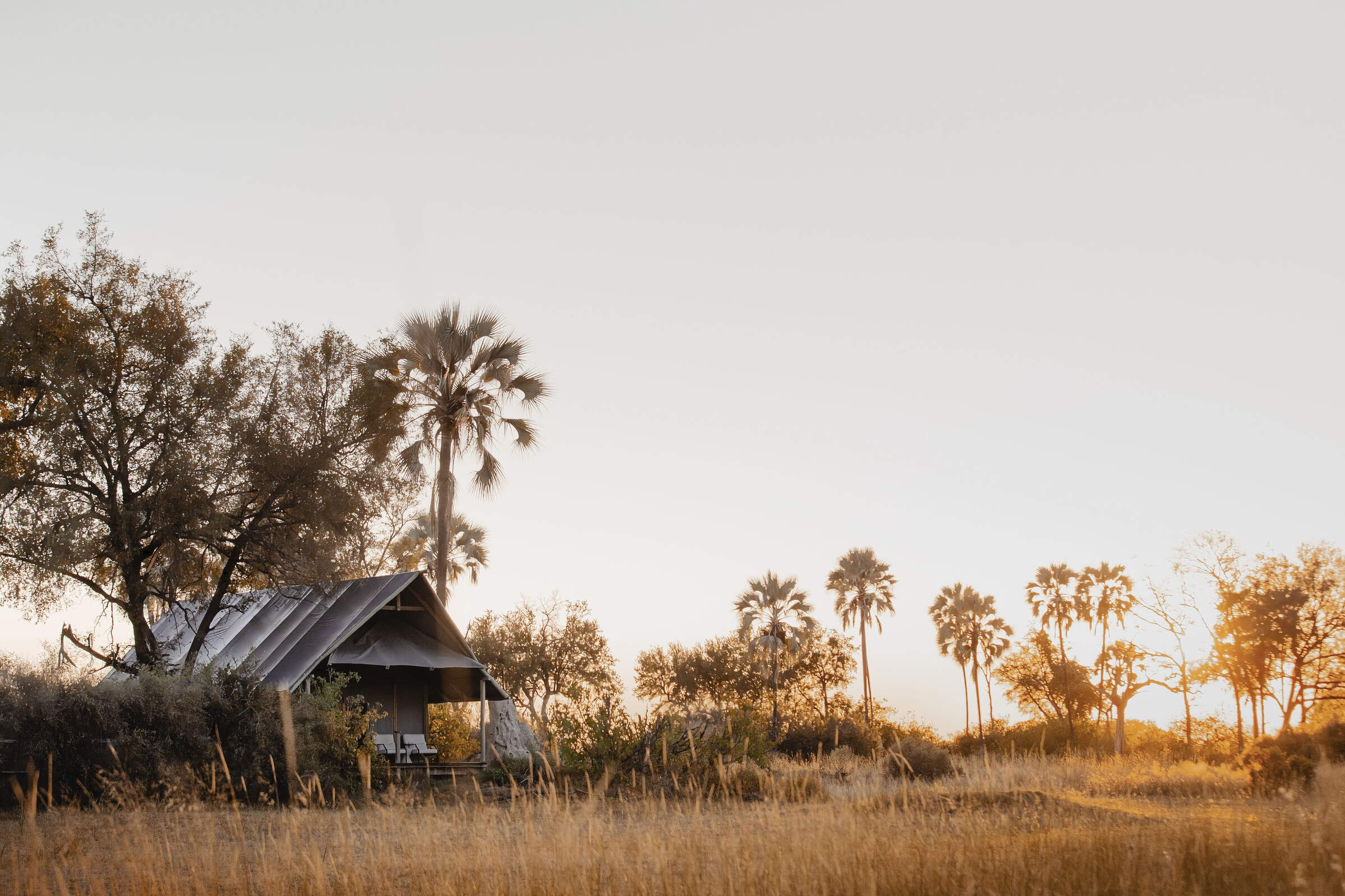
Chitabe Lediba
Chitabe Lediba, in Botswana's southern Okavango Delta, is a small family friendly safari camp; it offers great dry-land safaris and in our experience consistently delivers good game sightings.
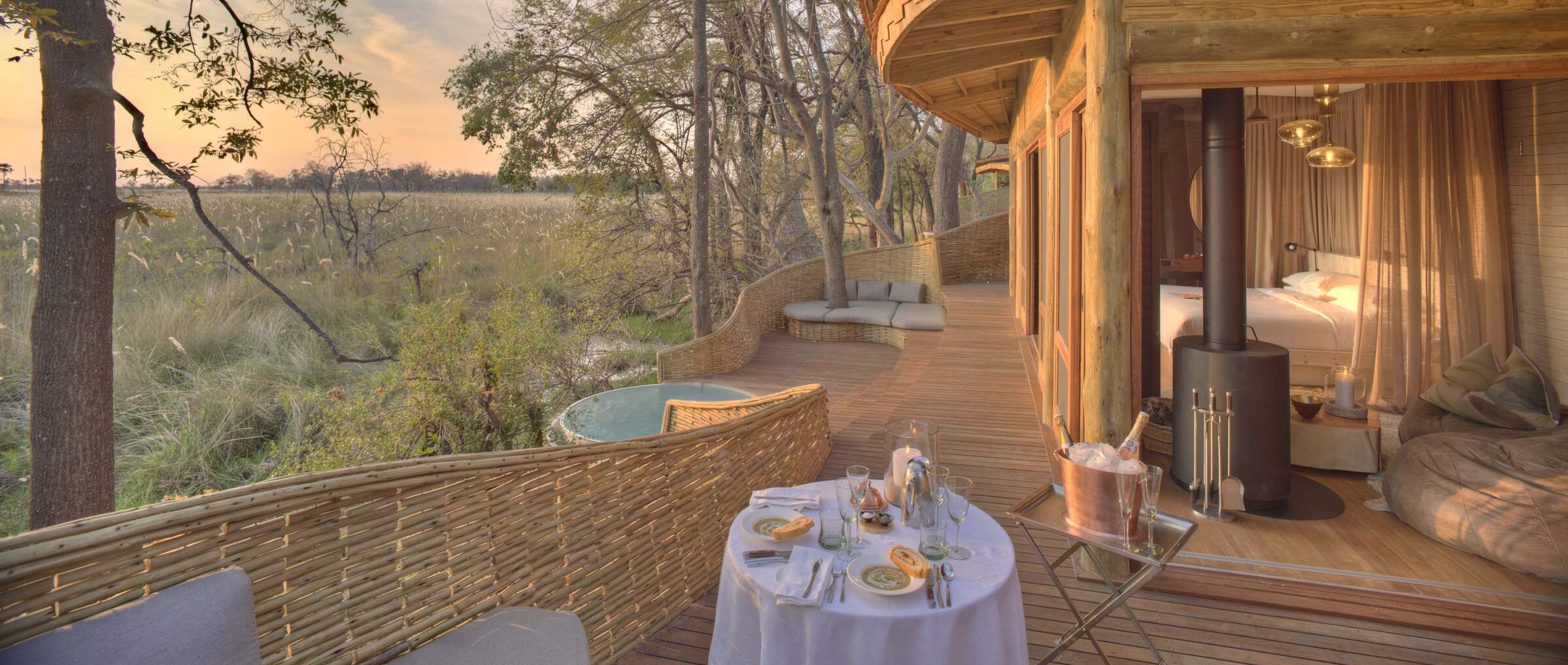
Sandibe Safari Lodge
The luxurious Sandibe Okavango Safari Lodge lies in a private concession in the heart of the Okavango Delta, beside Moremi Game Reserve, with superb big-game viewing.
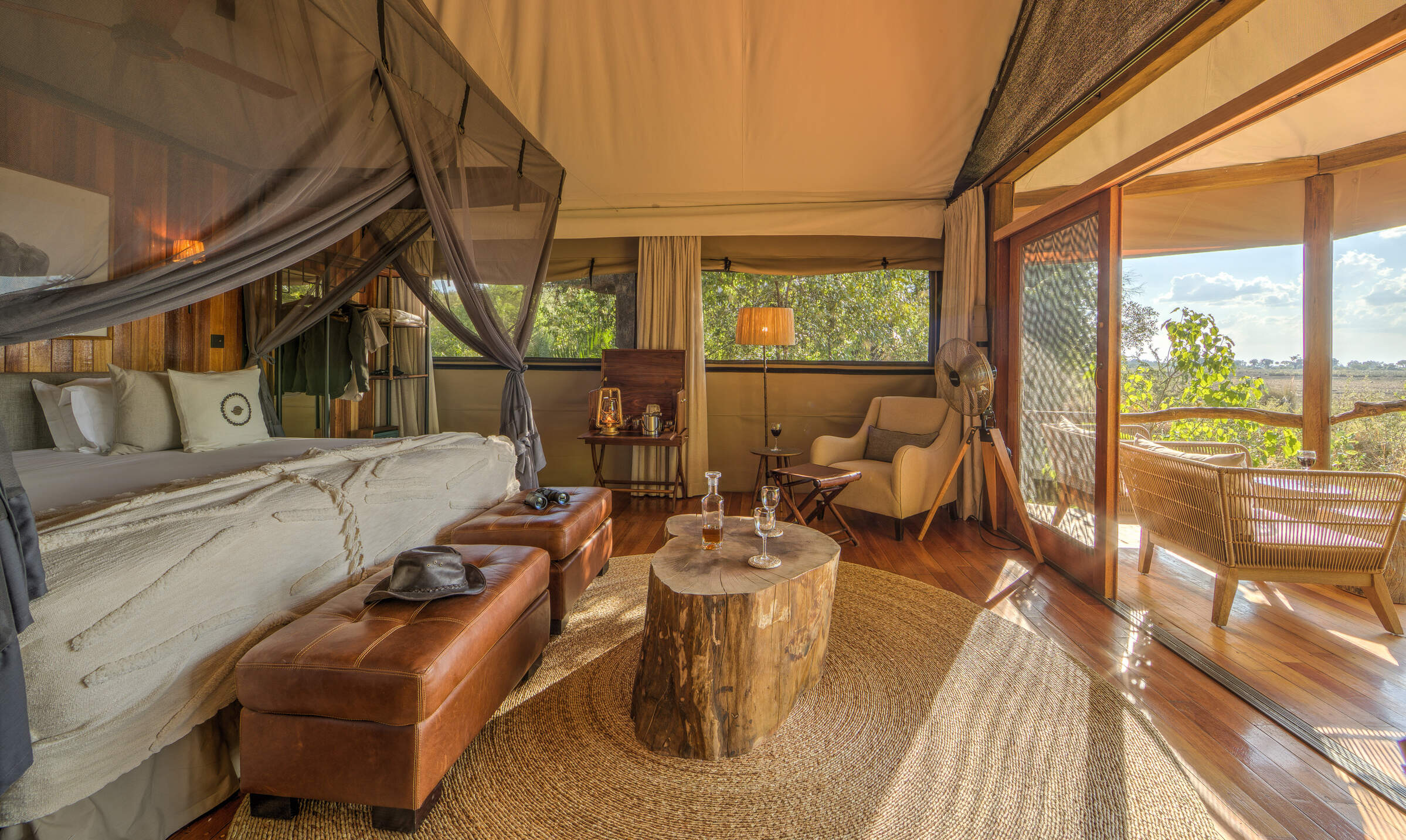
Kanana
In a beautiful part of the Delta, Kanana focuses on fantastic water activities and birding – including exclusive access to an impressive heronry.
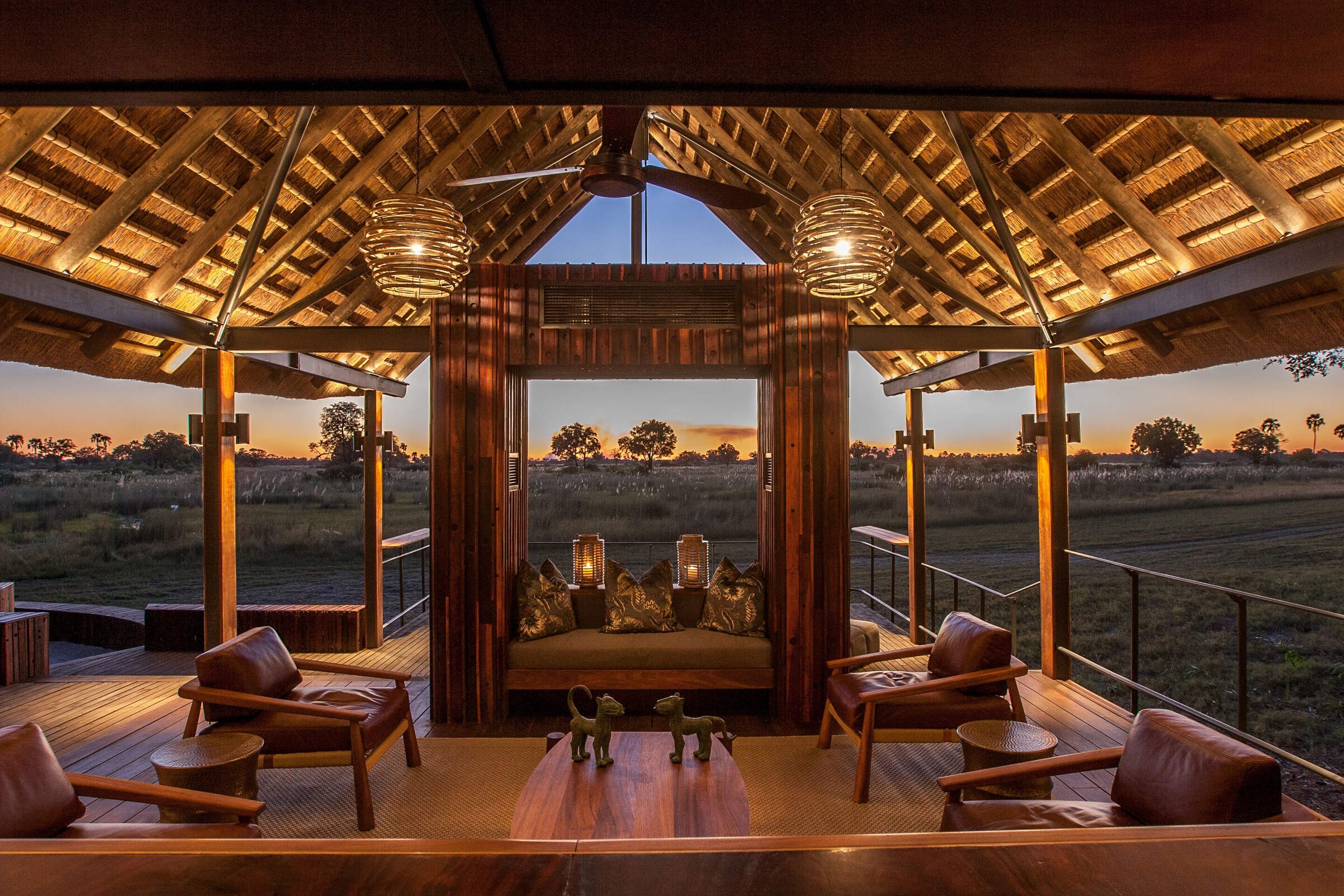
Chitabe Camp
In the southern Okavango Delta, the excellent Chitabe Camp concentrates on dry-land safaris in an area that we've found particularly good for wild dog sightings.
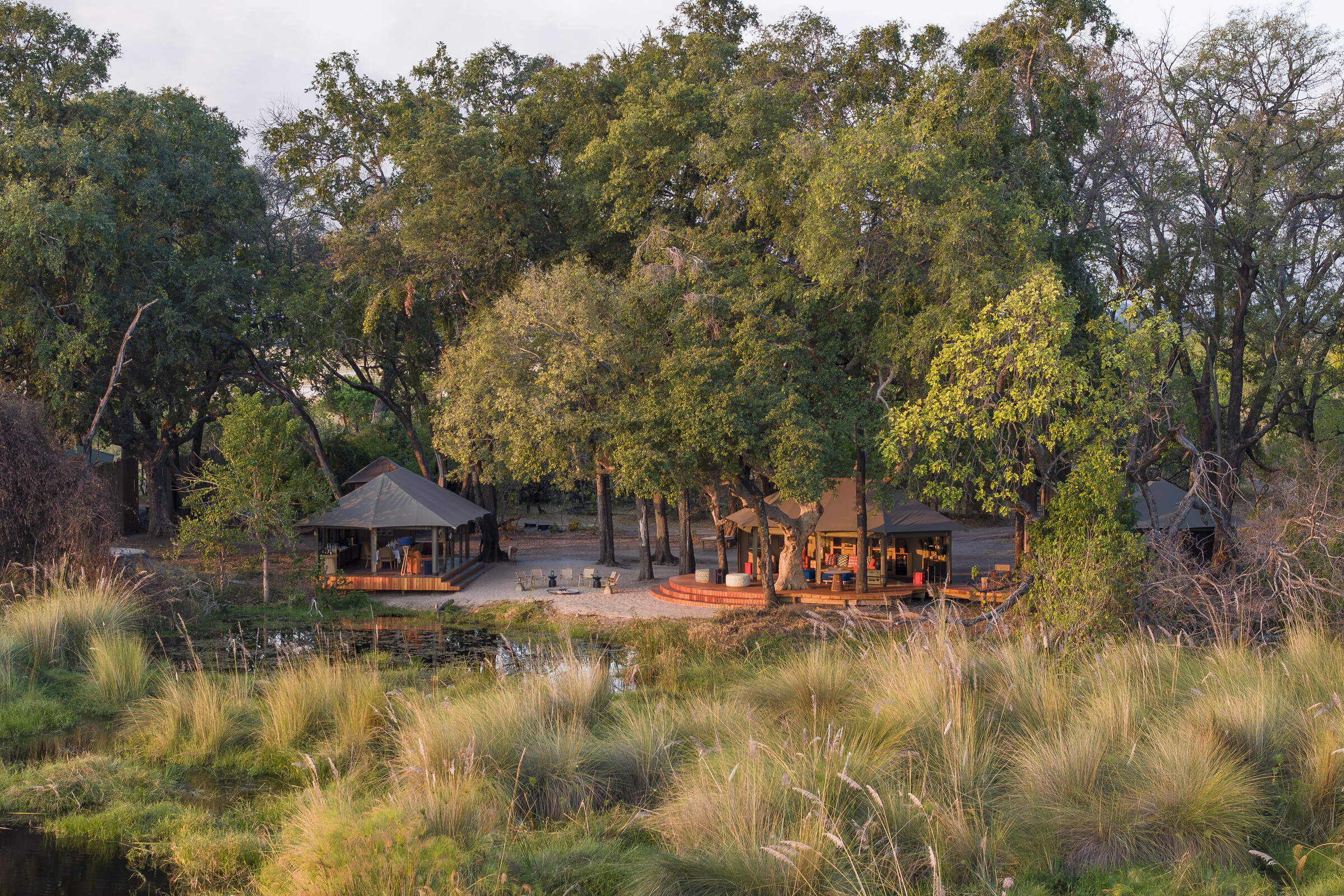
Shinde Footsteps
Small and simple, but comfortable, Shinde Footsteps focuses on walking safaris as well as game drives; it also runs a special children's programme so is particularly suitable for families.
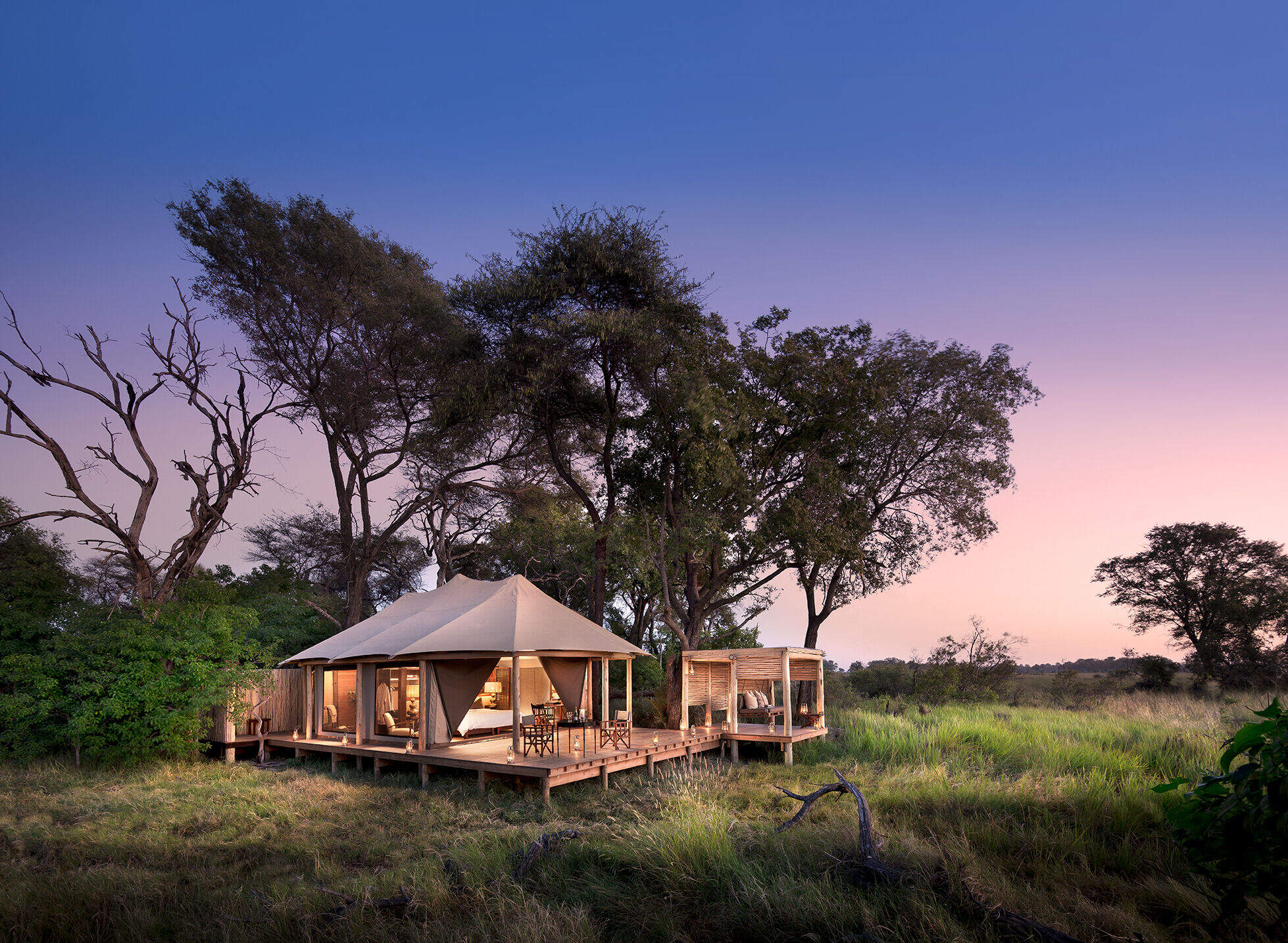
Nxabega Tented Camp
Nxabega offers a selection of both land- and water-based activities, plus very good guiding, food and service, but game viewing can be somewhat erratic.
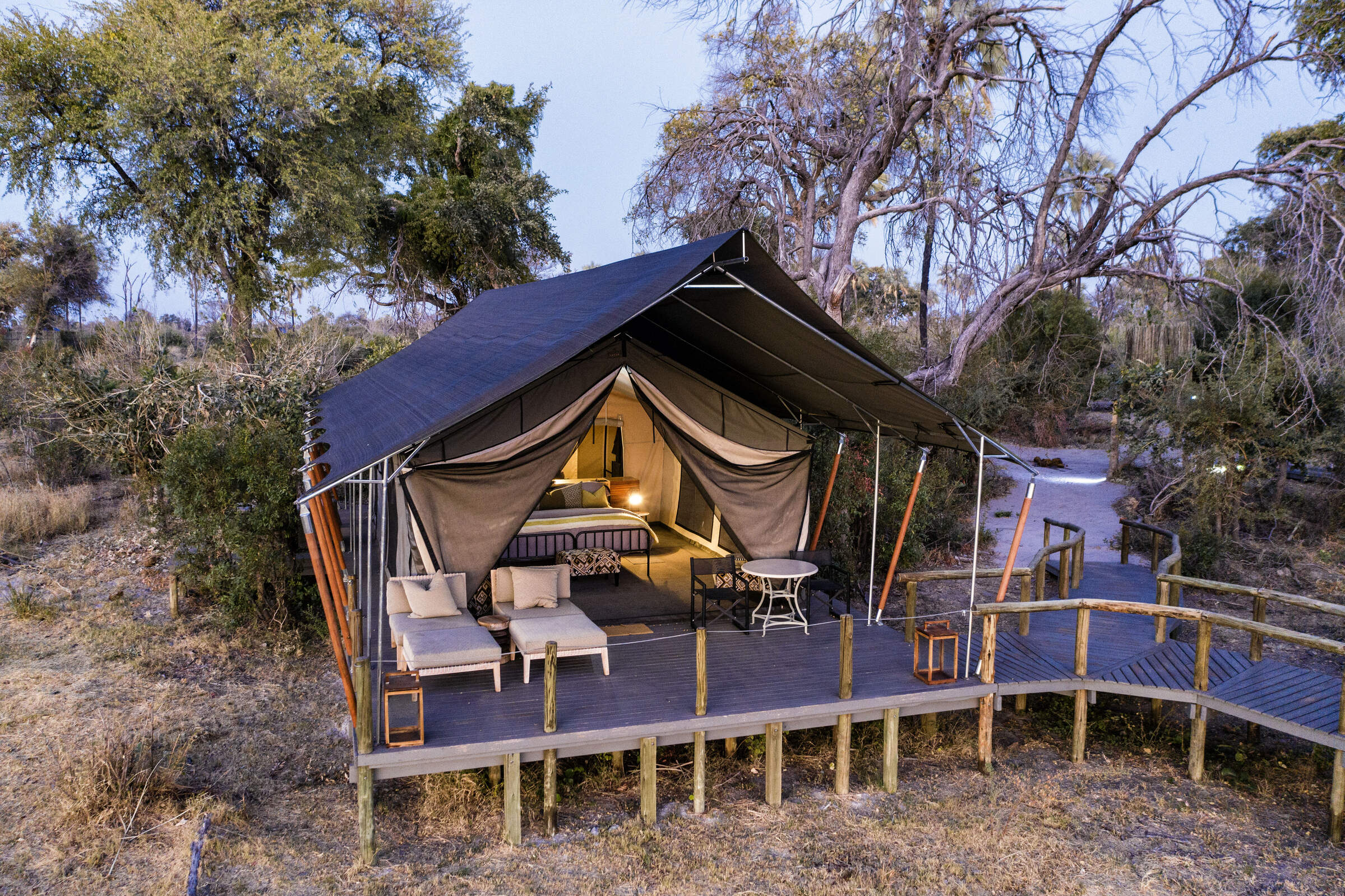
Gomoti Plains
Overlooking a tributary of the Gomoti River, Gomoti Plains Camp is a classically designed camp with very comfortable tents in a good game-viewing area.
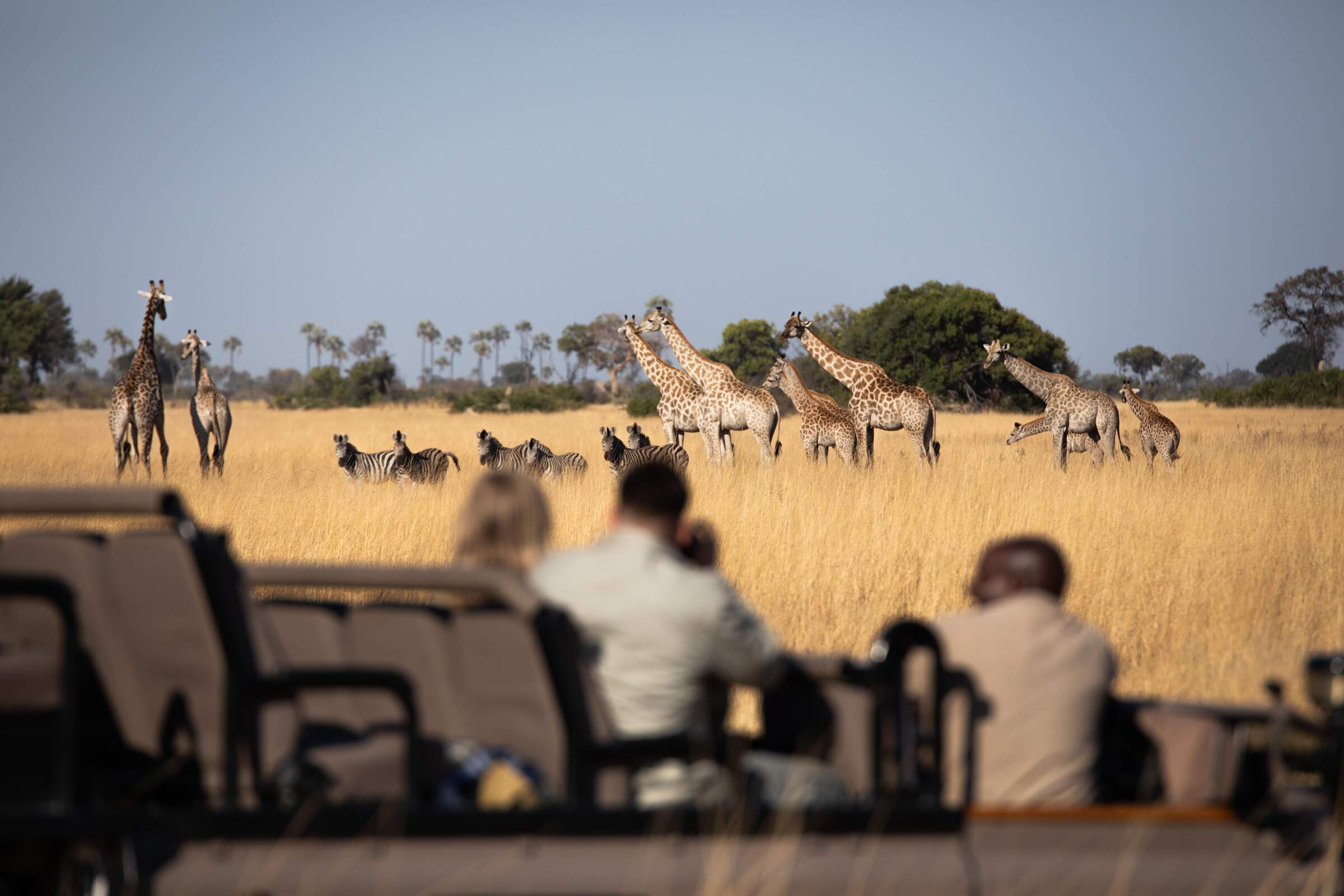
Tubu Tree Camp
A traditional tented camp with a distinctive tree-house feel, Tubu Tree offers some of the best game viewing in the Jao Reserve.
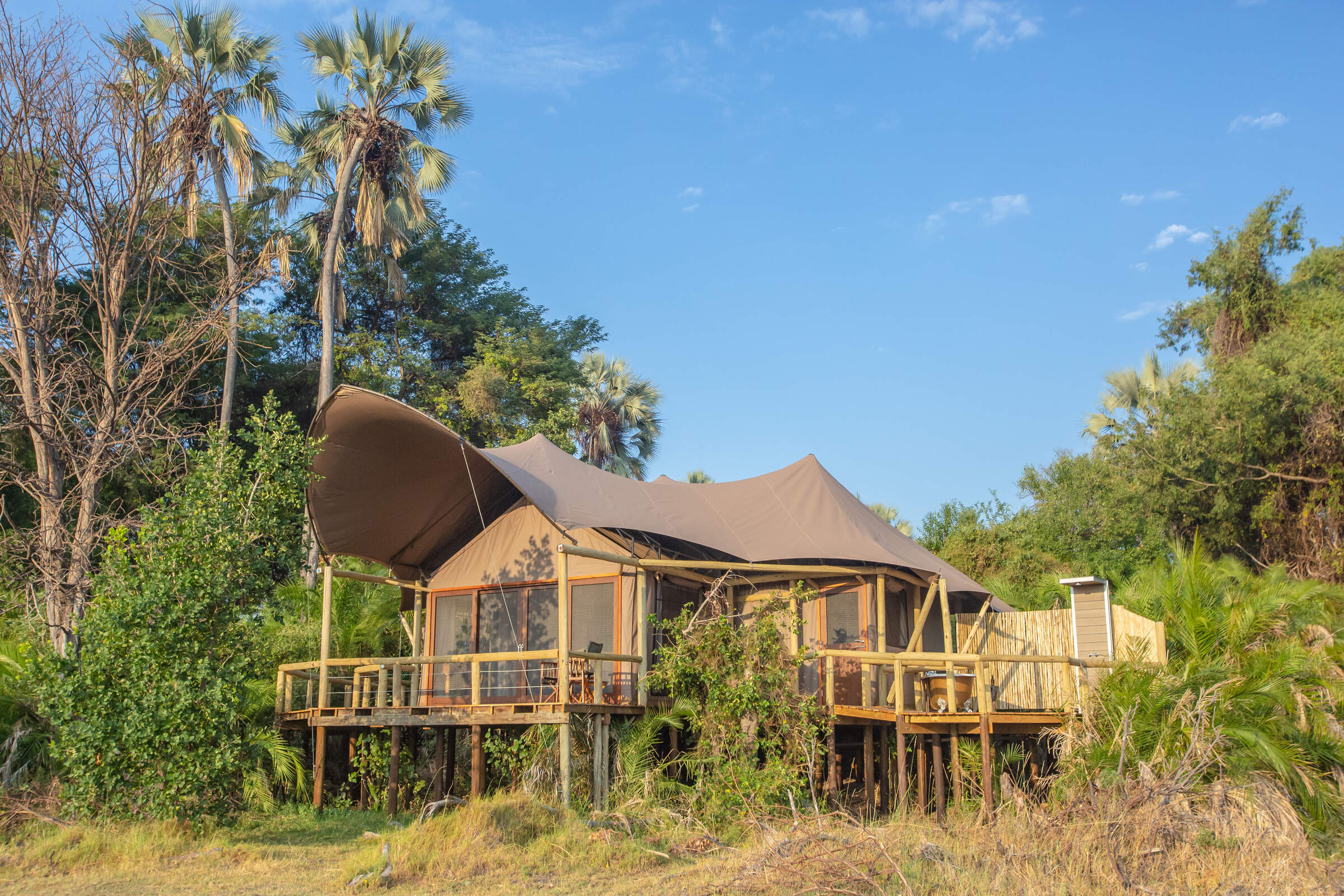
Jacana Camp
Jacana Camp is a small safari camp with an informal island feel; it is ideal for water-based activities in the Delta and offers excellent birdwatching.
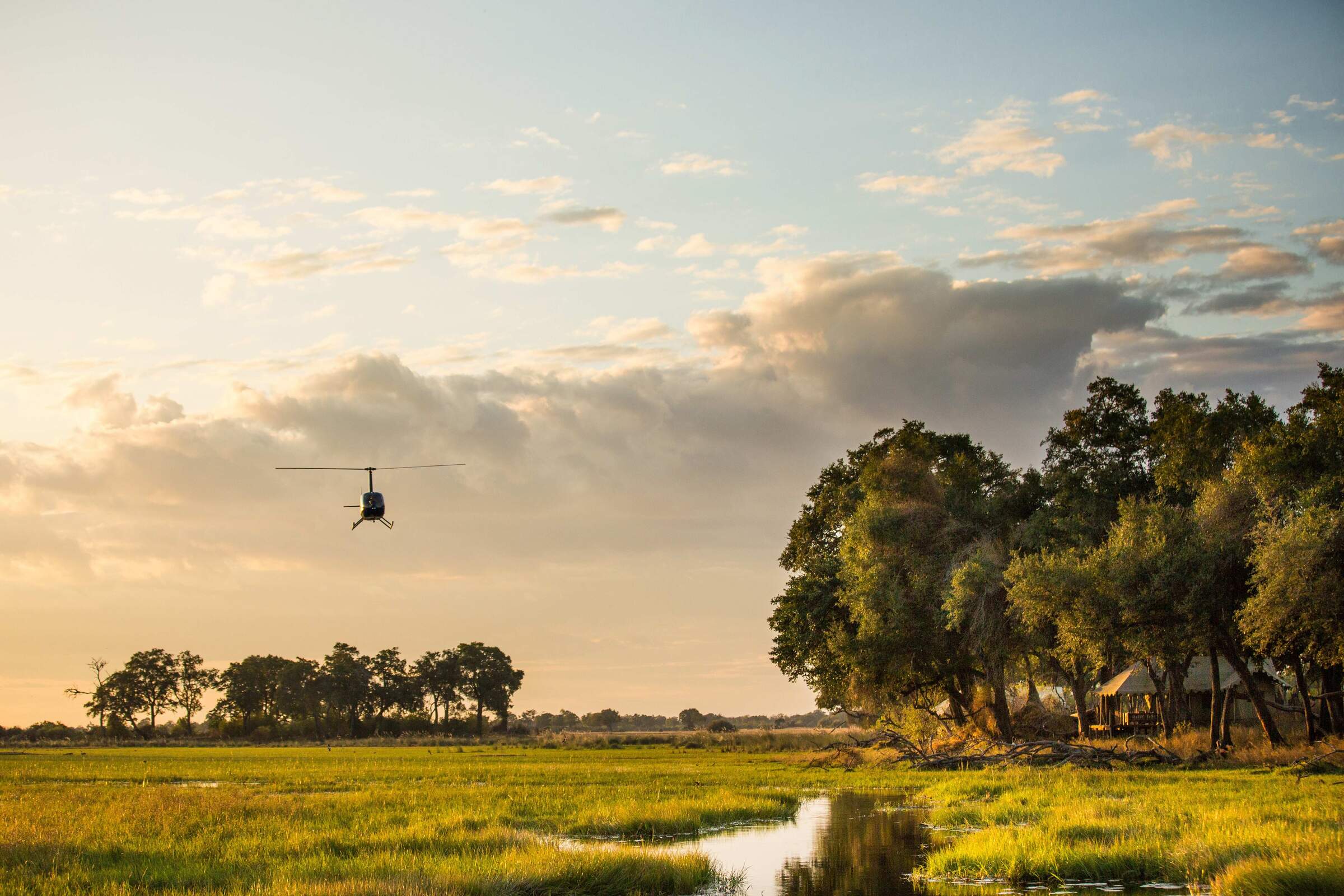
Duba Explorers Camp
Intimate and elegant, Duba Explorers Camp promises a firm safari focus in a remote corner of the Okavango, led by a team who value the highest guiding and hosting standards.
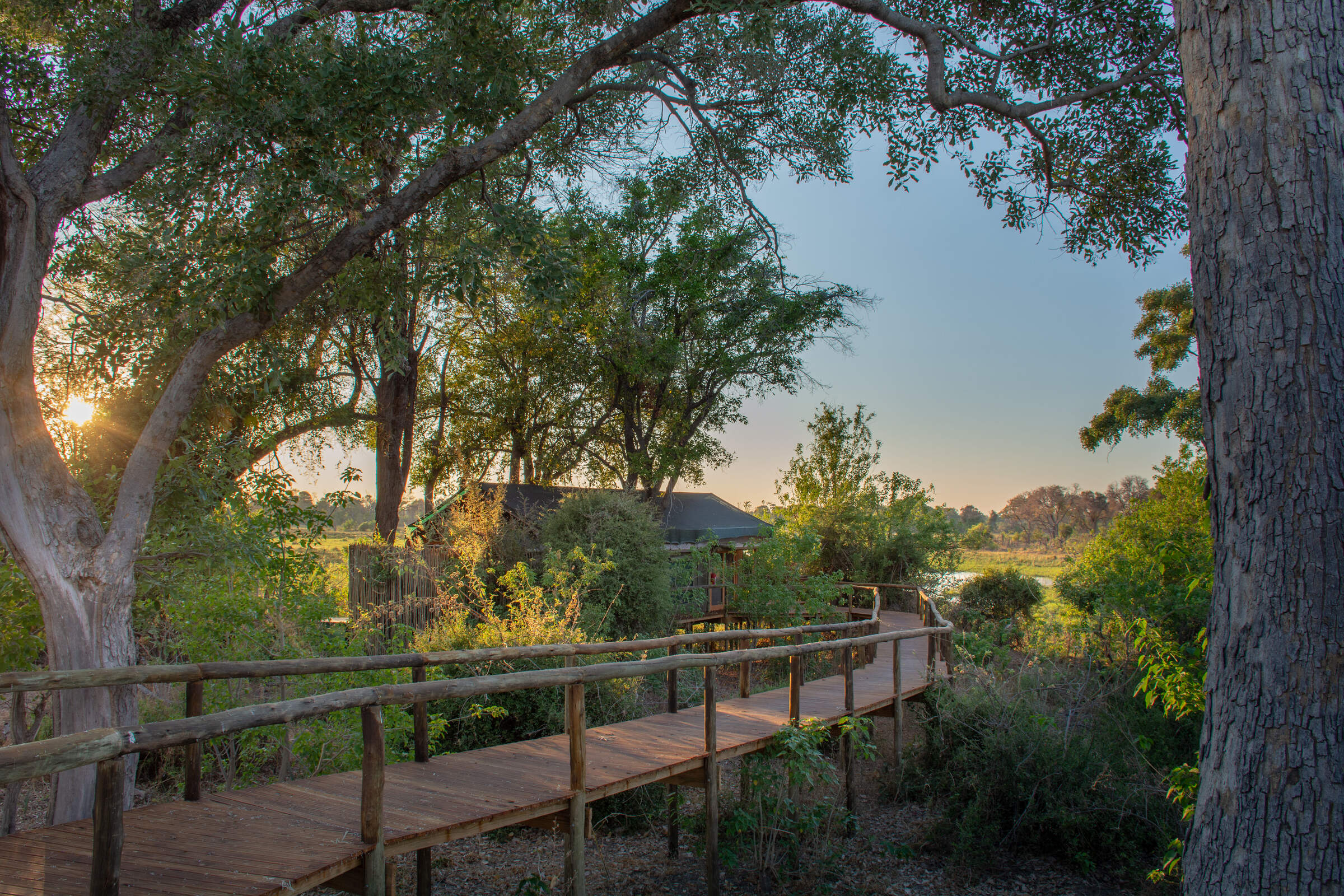
Mma Dinare
Beautifully located in a private concession overlooking the Gomoti River, the traditional Mma Dinare is very well-priced for the Okavango Delta.
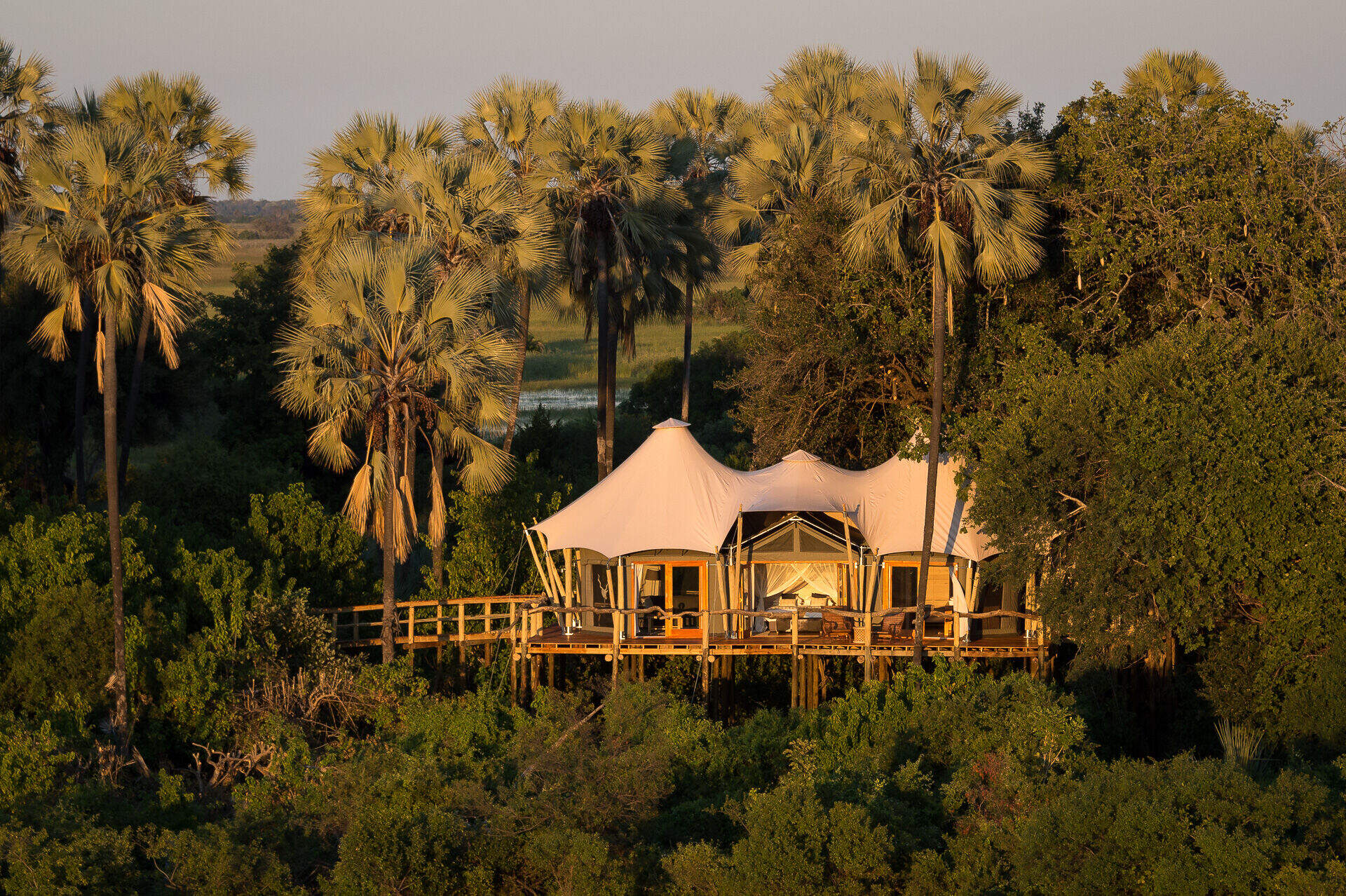
Kwetsani Camp
Deep in the Delta, overlooking a floodplain, Kwetsani Camp is a small, high-end camp with good access to areas for land and water-based activities.
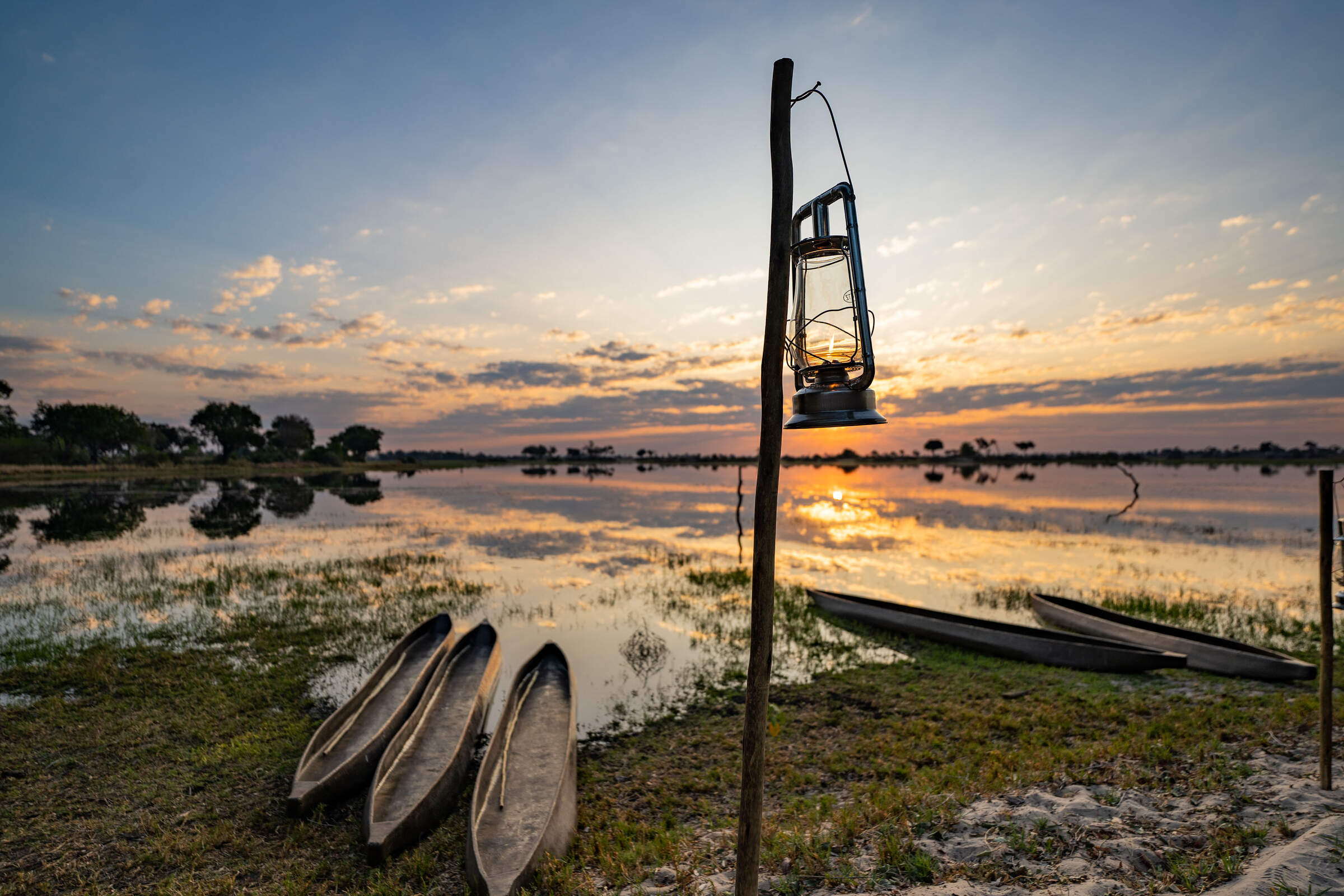
Pom Pom Camp
Amidst stunning Okavango Delta scenery, Pom Pom offers idyllic mokoro trips in season, great birdwatching, and increasingly good big-game sightings, especially leopards.
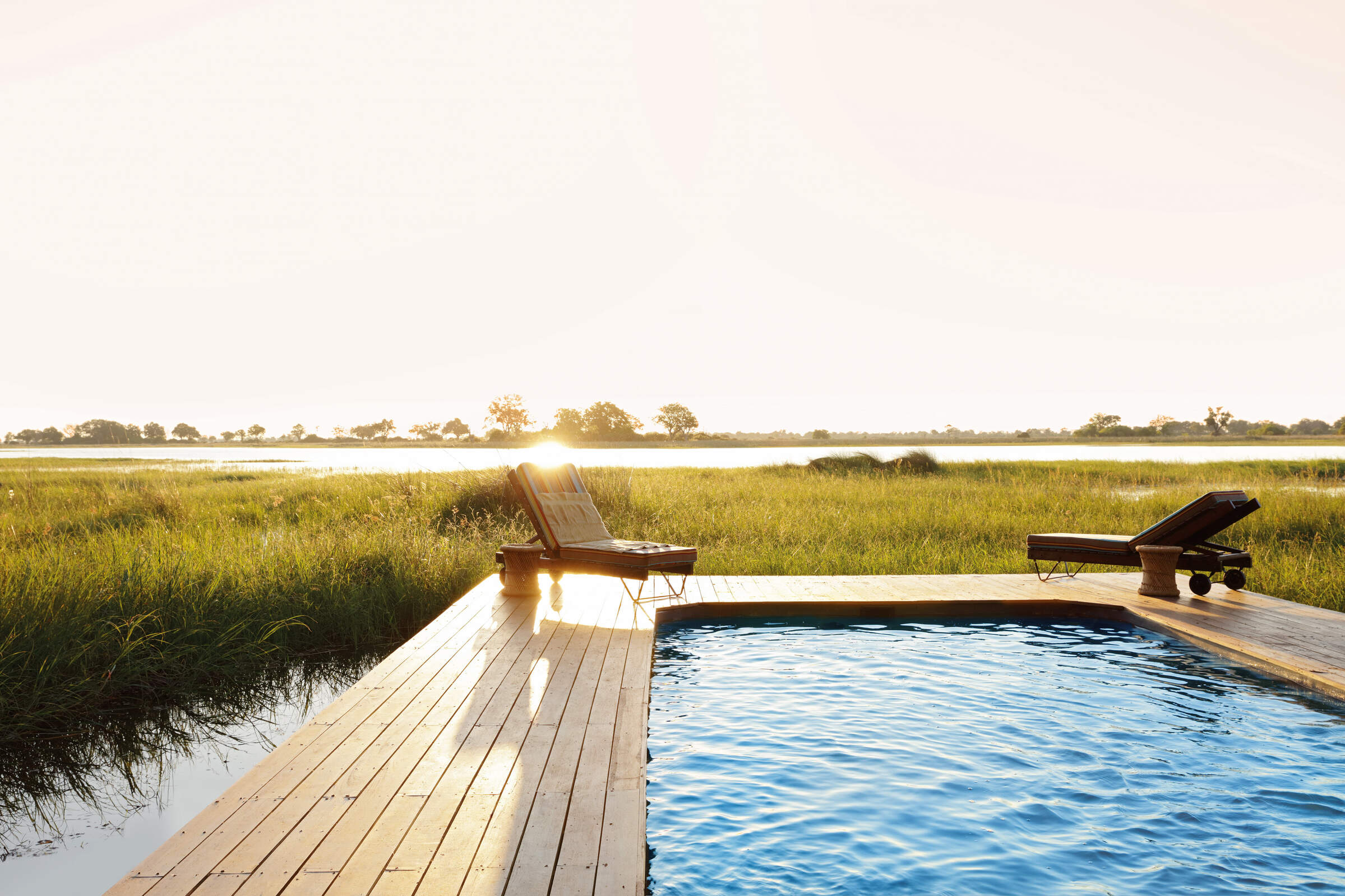
Mapula Lodge
For an affordable yet varied safari encompassing a range of eco-systems, the traditional Mapula Lodge takes a lot of beating.
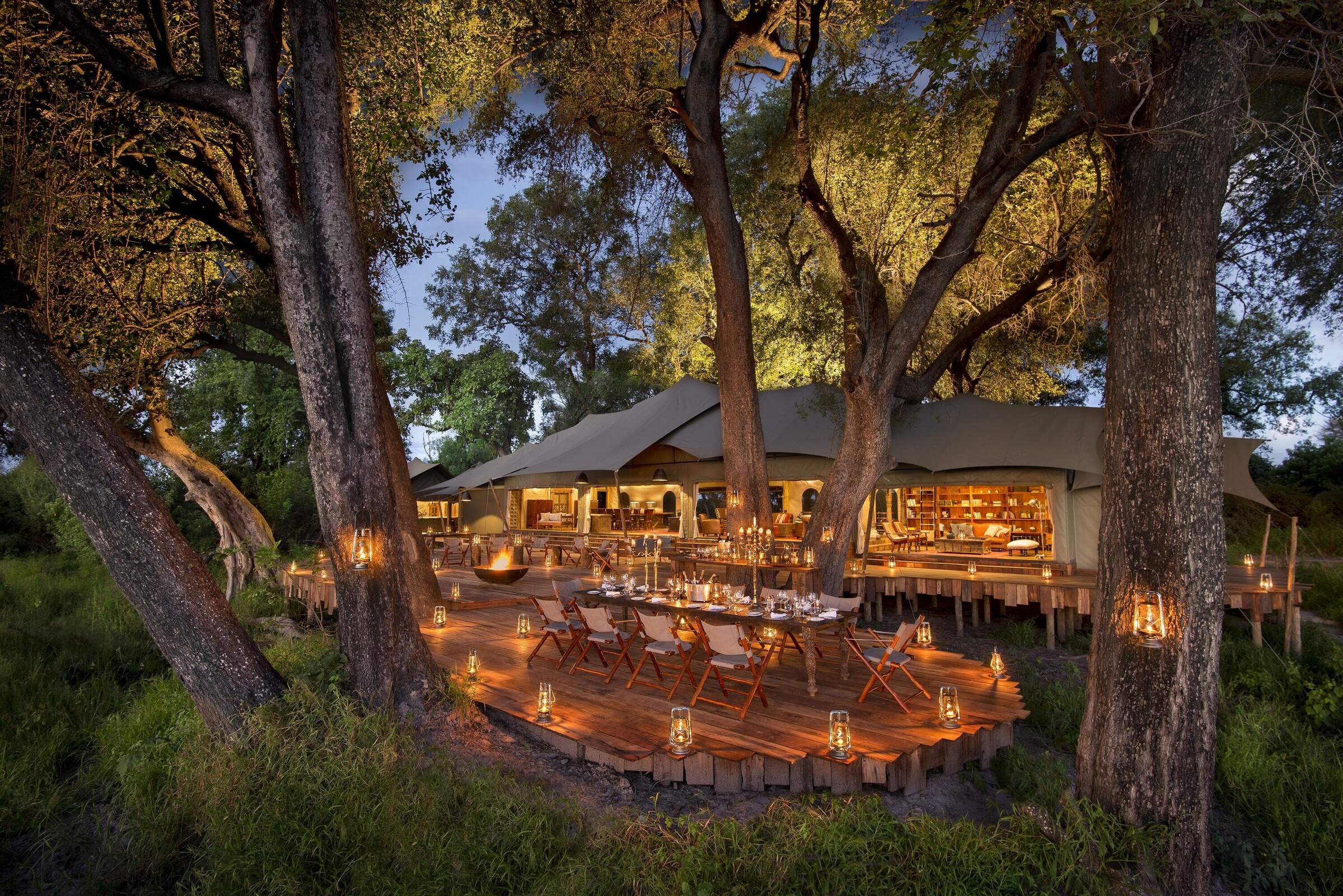
Duba Plains Camp
Duba Plains Camp is a traditional yet luxurious safari camp, best known for the thrilling lion behavior interaction that is often see during the day.
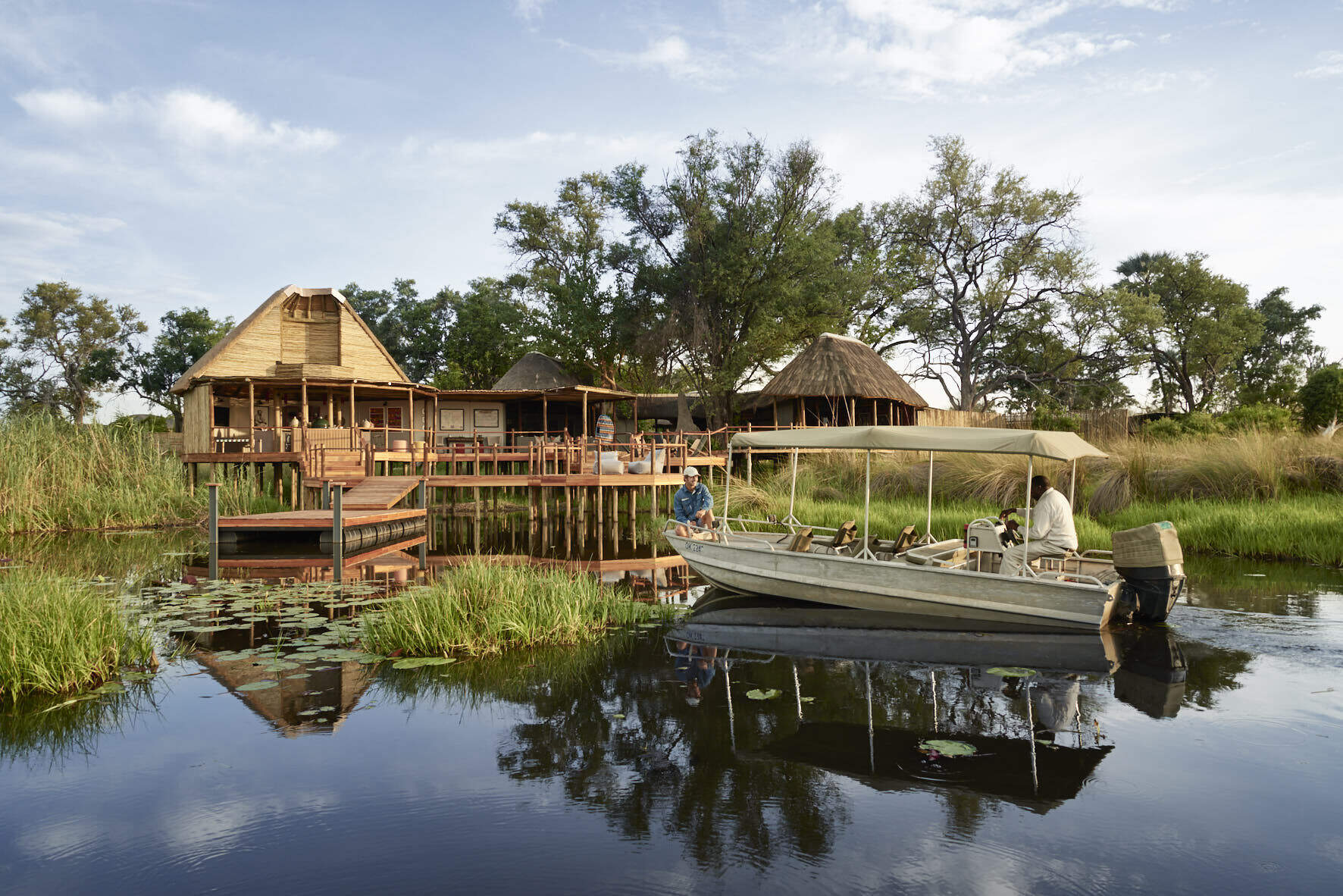
Baines' Camp
Baines' Camp is a well-run, intimate camp in a pretty part of the Okavango, offering a range of activities and the option to spend a morning walking with elephants.
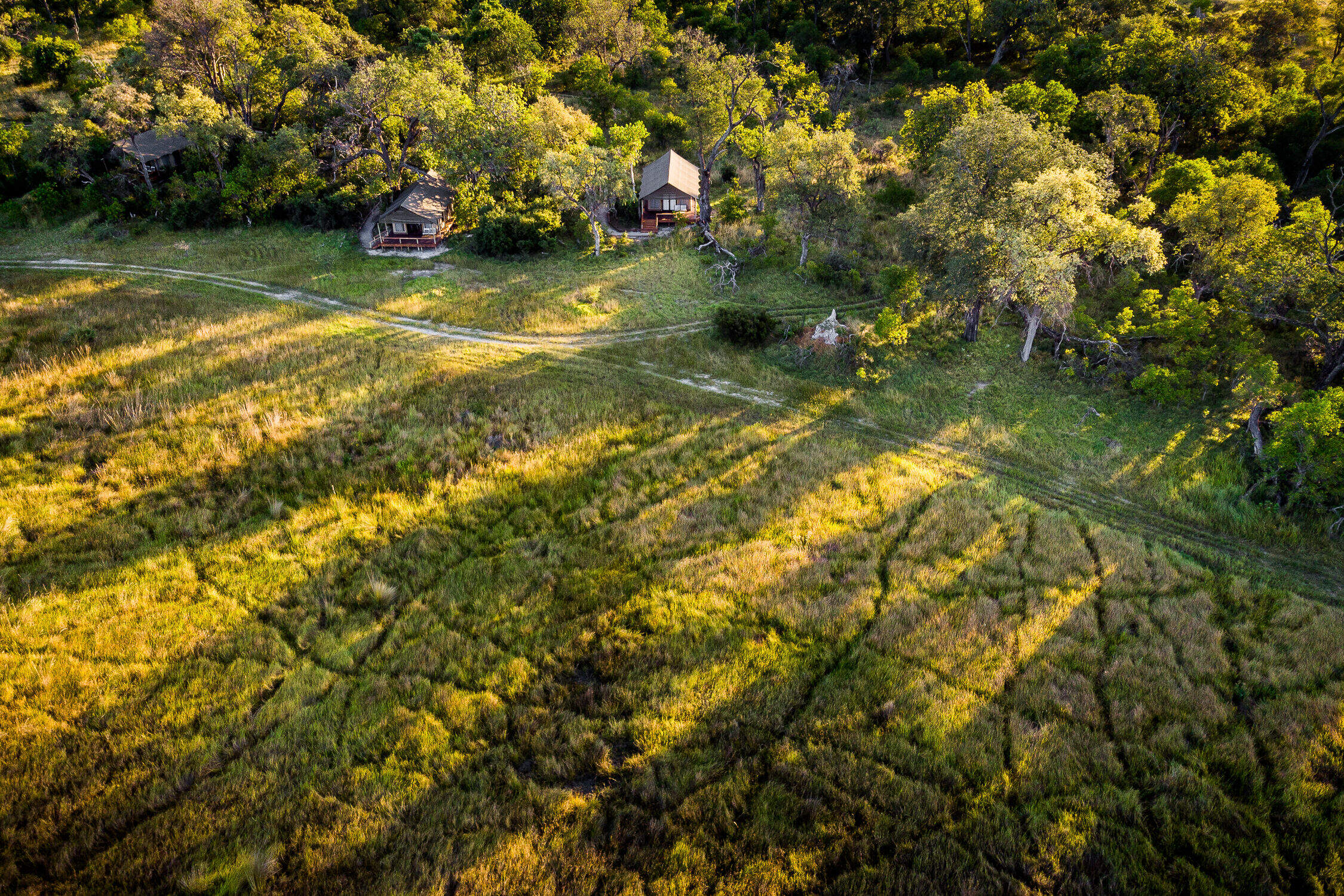
Stanley's Camp
In a private concession south of Moremi Game Reserve, Stanley's Camp offers 4WD game drives, seasonal water activities and a superb elephant interaction.
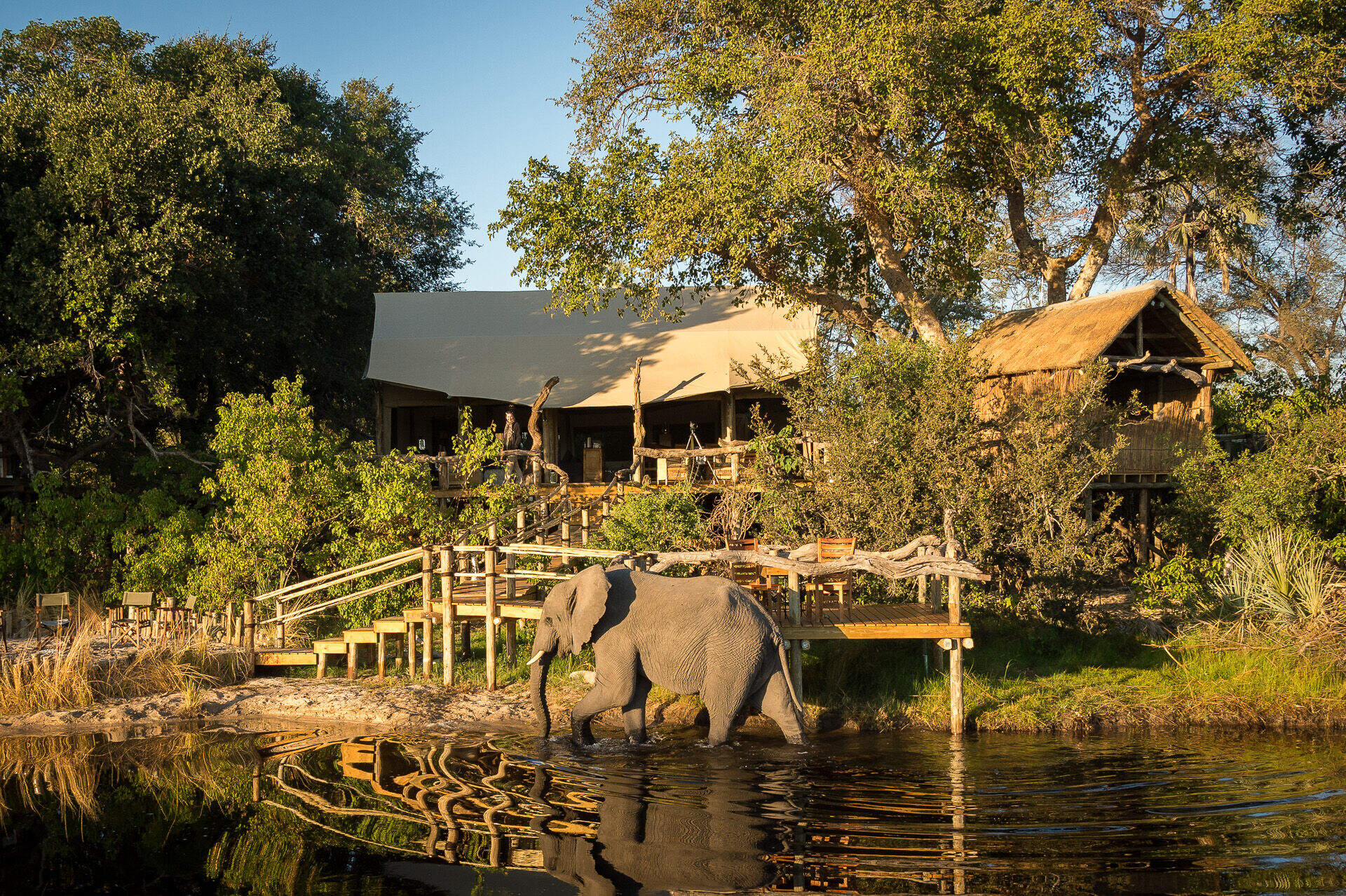
Little Tubu
Little Tubu is a new, traditional camp with just three tented chalets and a distinctive tree-house feel. The areas around it can be explored by water and land-based activities year round.
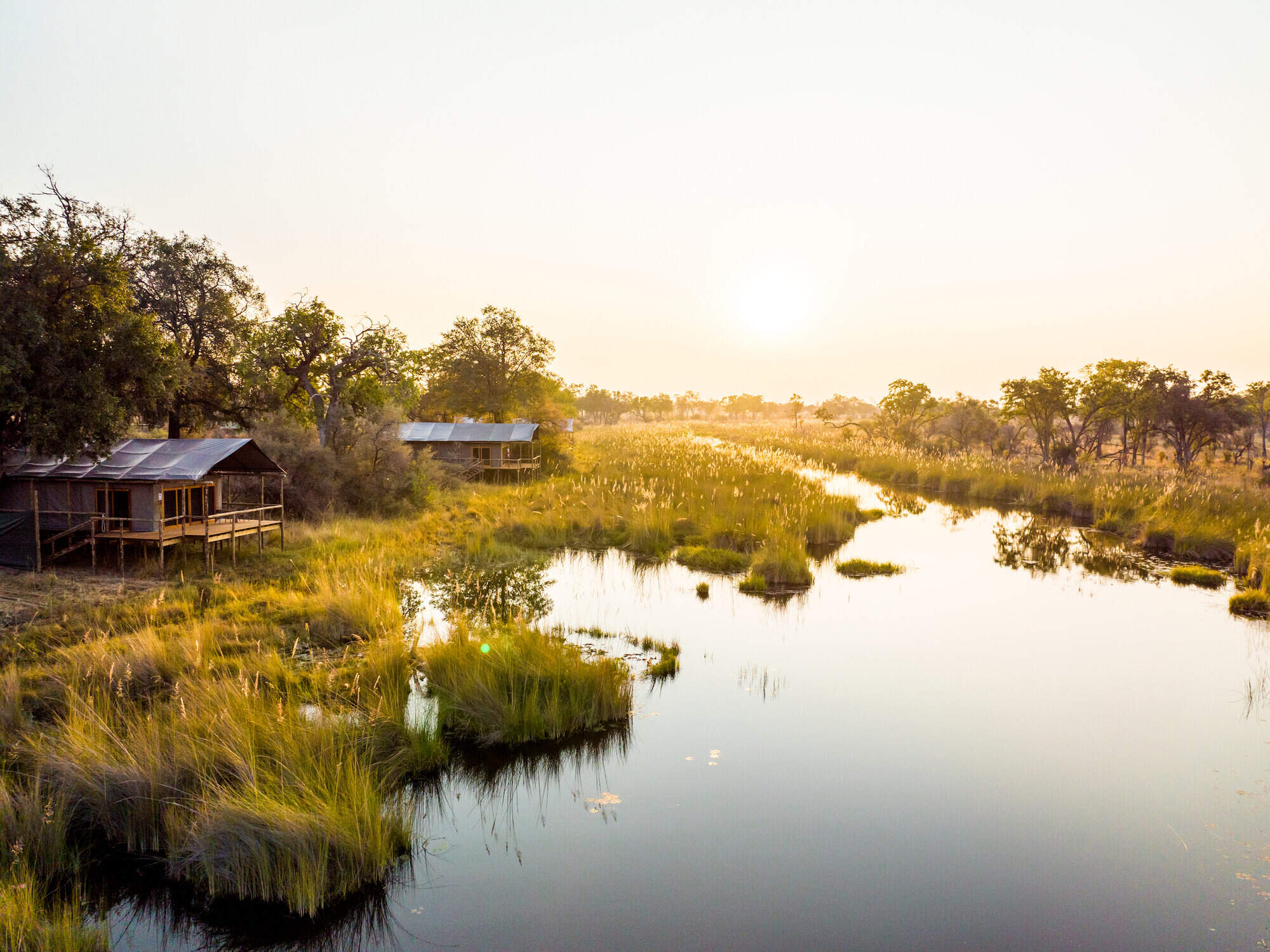
4 Rivers
4 Rivers is a new camp in a previously in accessible area of the excellent Kwara concession.
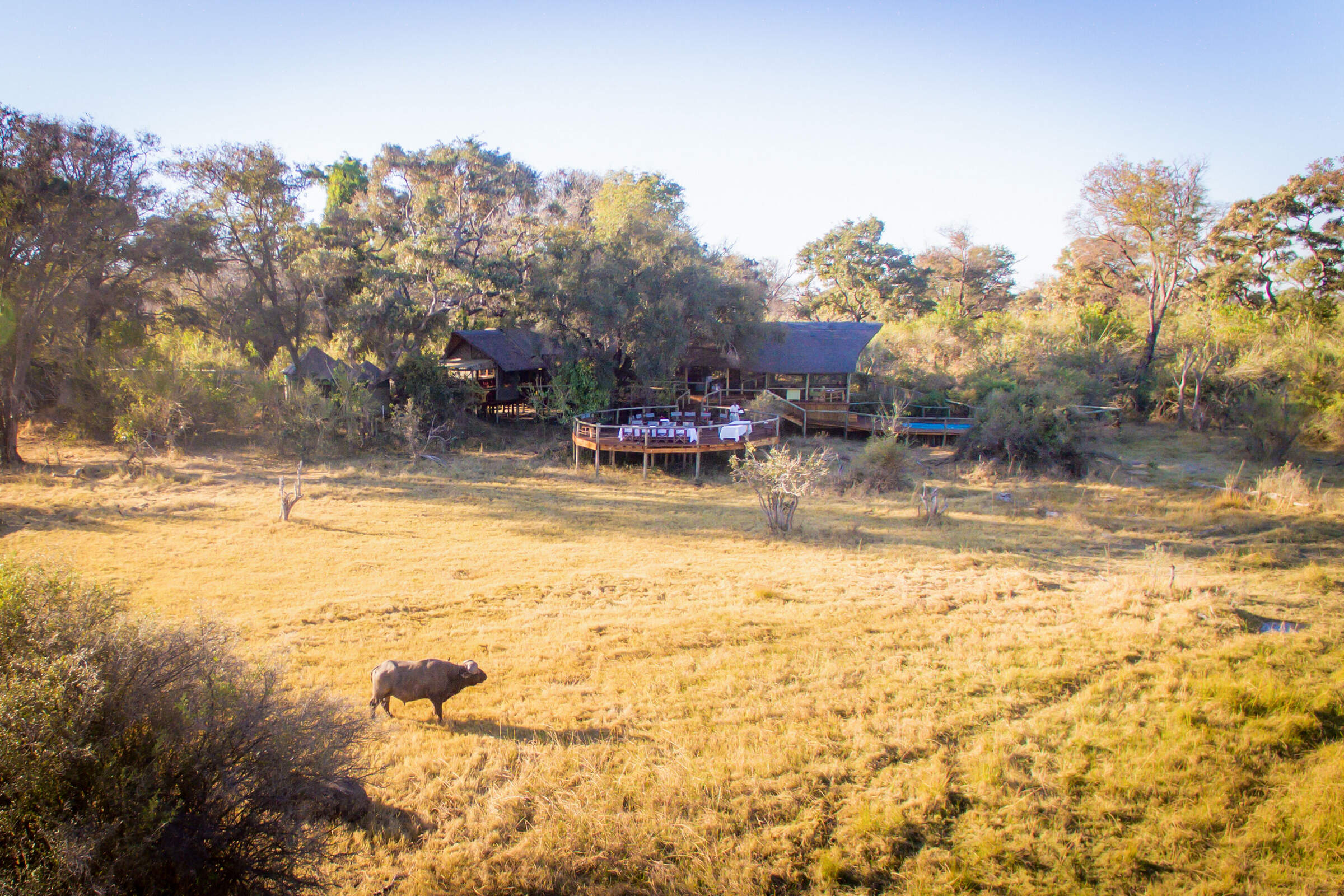
Rra Dinare
Located in a private concession in the southern reaches of the Okavango Delta, overlooking the Gomoti River, Rra Dinare is a traditional-style, well-priced camp.
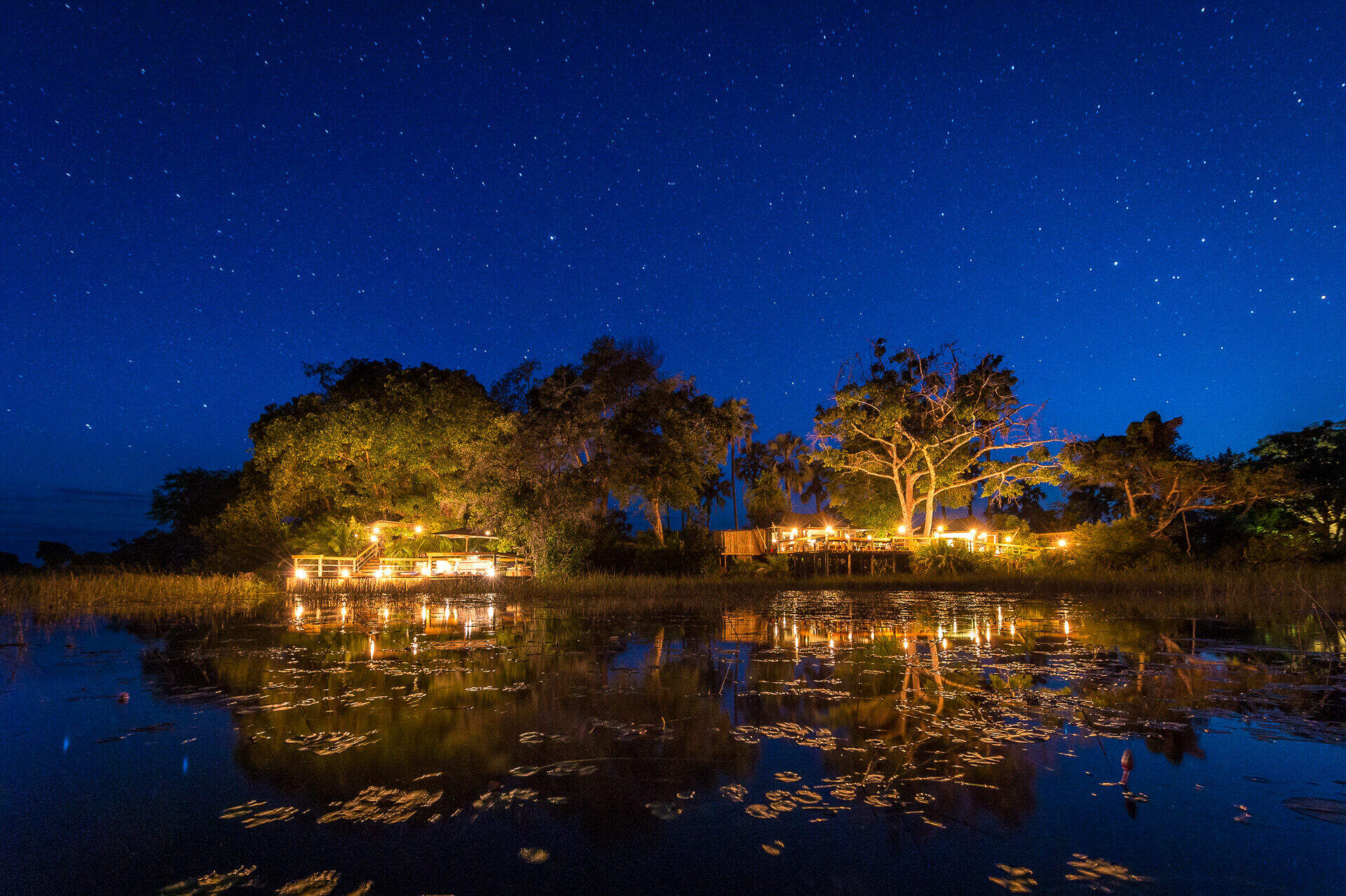
Pelo Camp
In a pristine wilderness environment deep in the Okavango Delta, the seasonal Pelo Camp is tented yet comfortable, with activities focusing on excursions by mokoro.
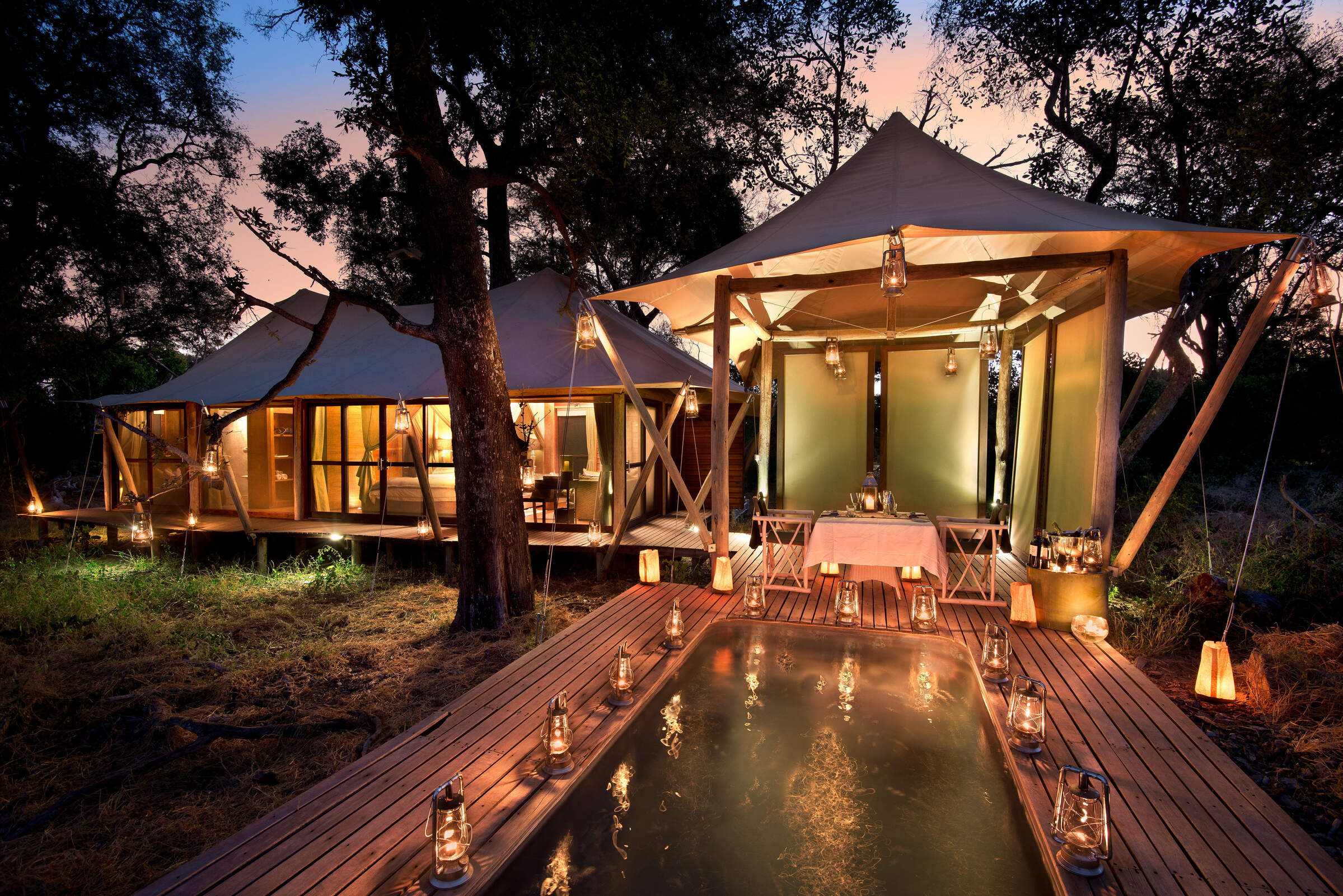
Xaranna
Xaranna is a plush tented camp amongst the idyllic waterways and islands of the Delta. Each air-conditioned tent has a plunge pool. Water activities and pampering are the focus here.
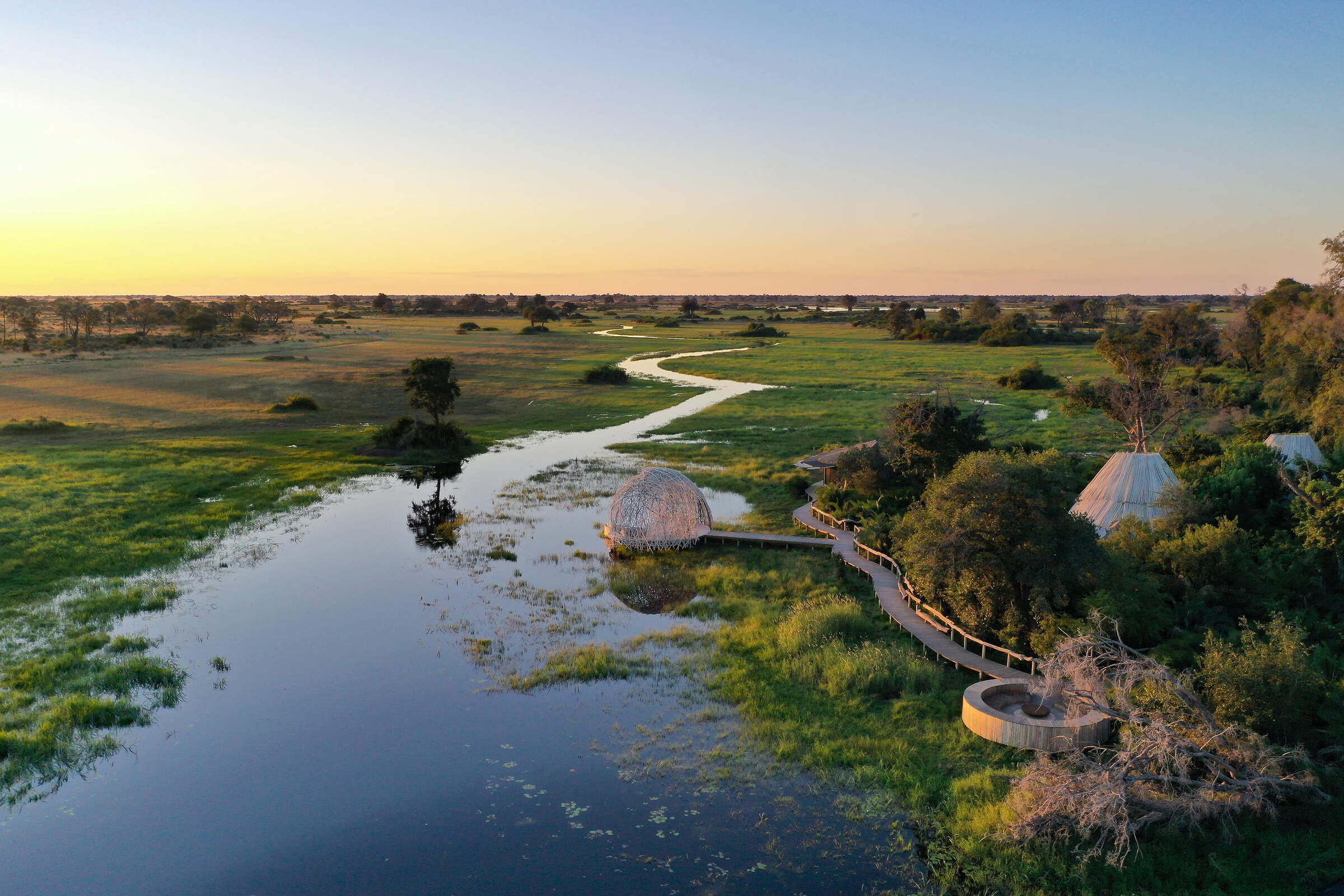
Jao Camp
In a beautiful area with fantastic water activities, Jao combines an idyllic location with high levels of luxury and service, and a top-end spa.
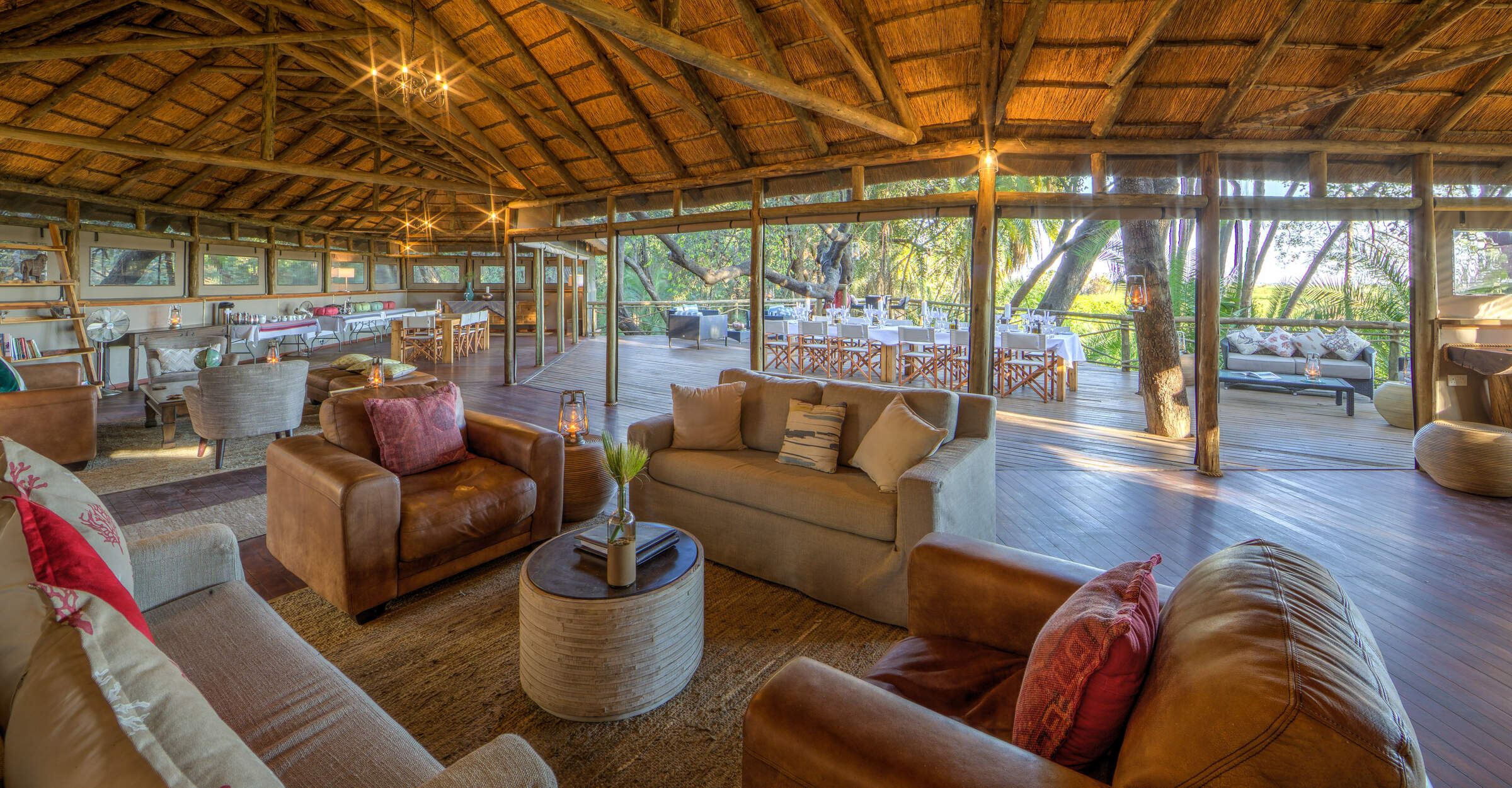
Setari Camp
Setari Camp stands on an island dotted with palm trees, close to the base of the Okavango’s ‘Panhandle"
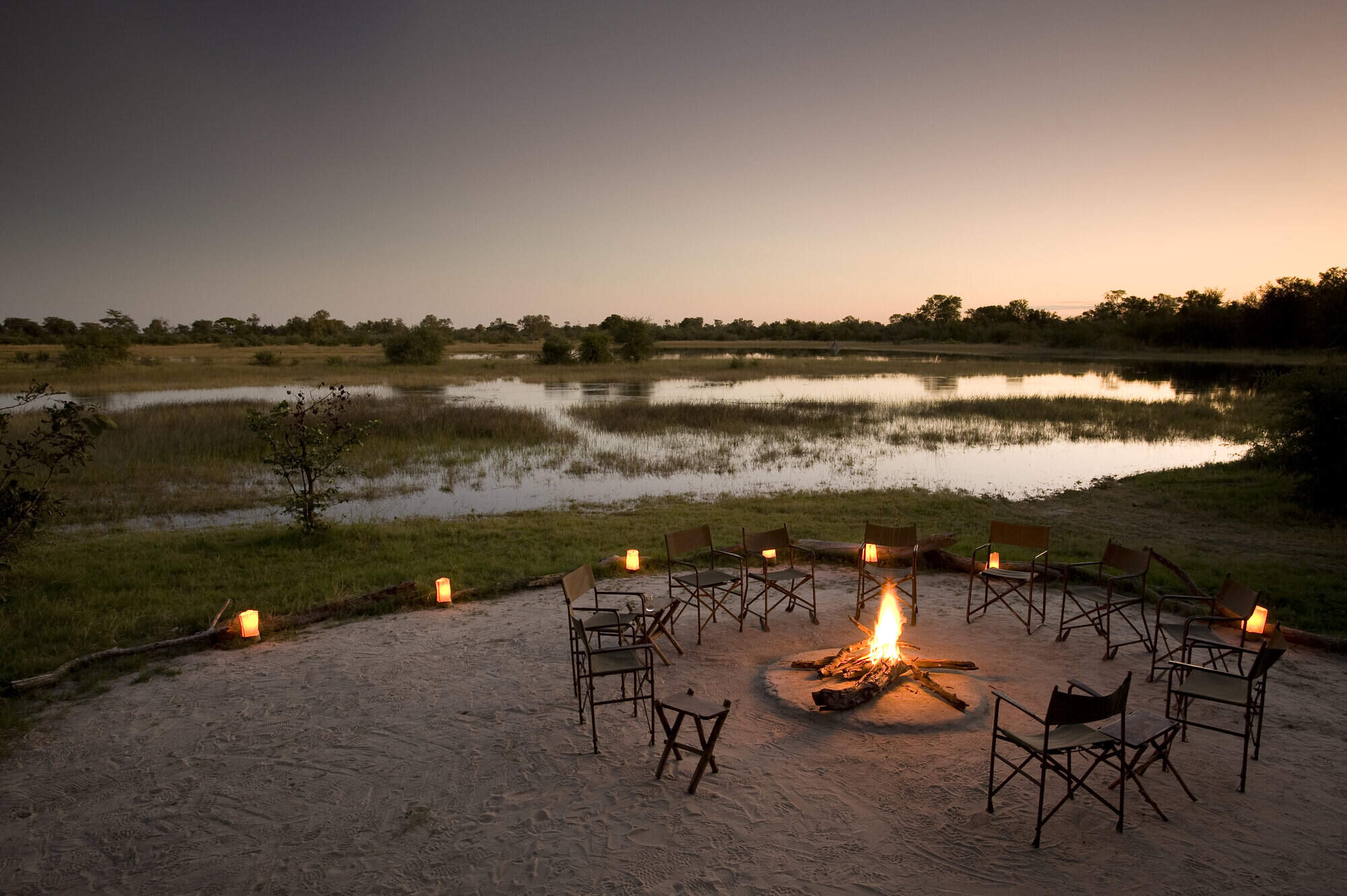
Okavango Explorers
The traditional, tented Okavango Explorers Camp offers a mix of walking, canoeing and game drives led by great guides in a wildlife-rich area.
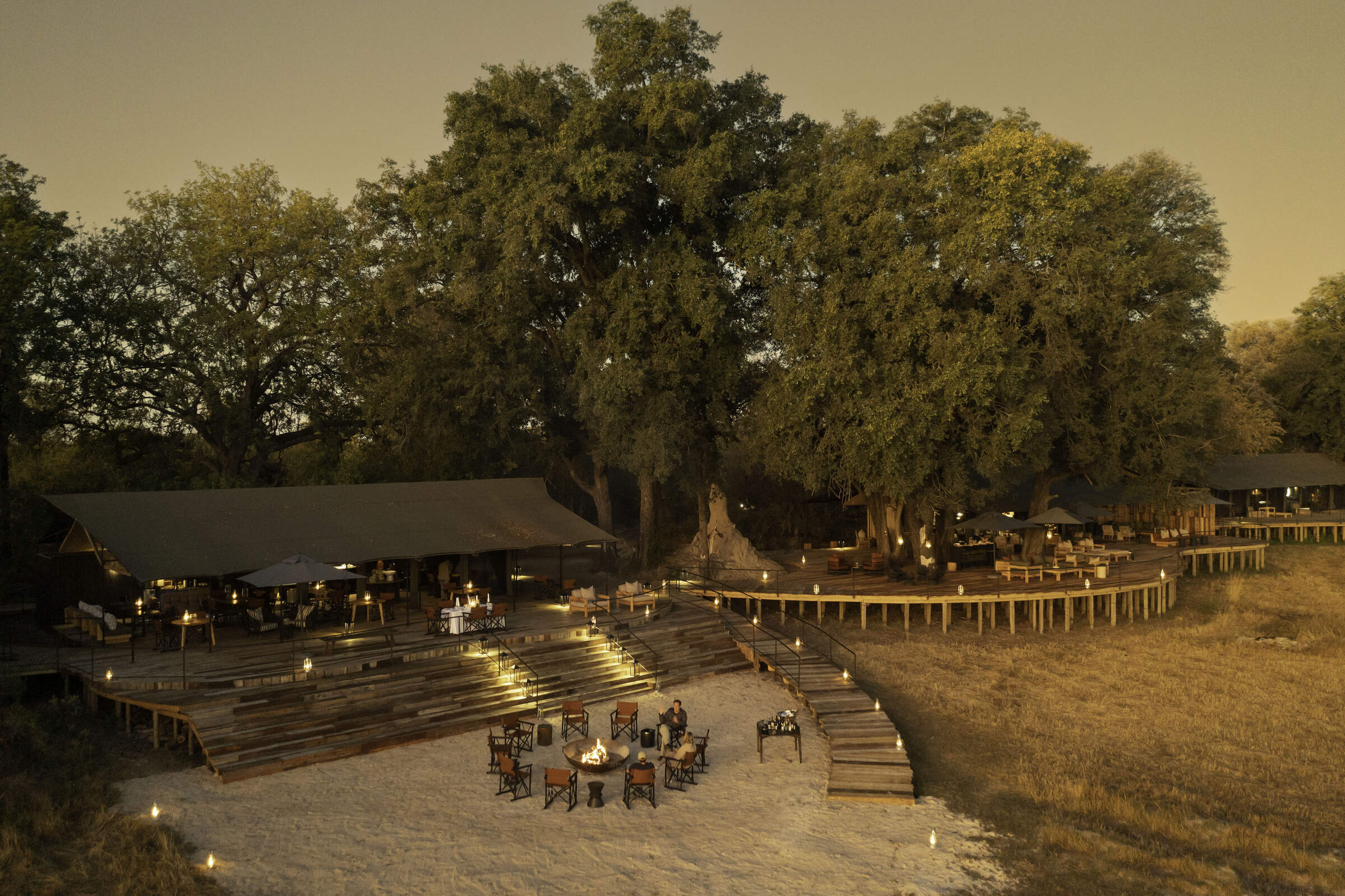
Kiri Camp
Kiri Camp is the latest Okavango offering from the excellent team behind Machaba. In an exciting new location in the heart of the Delta we cannot wait to visit this new camp.
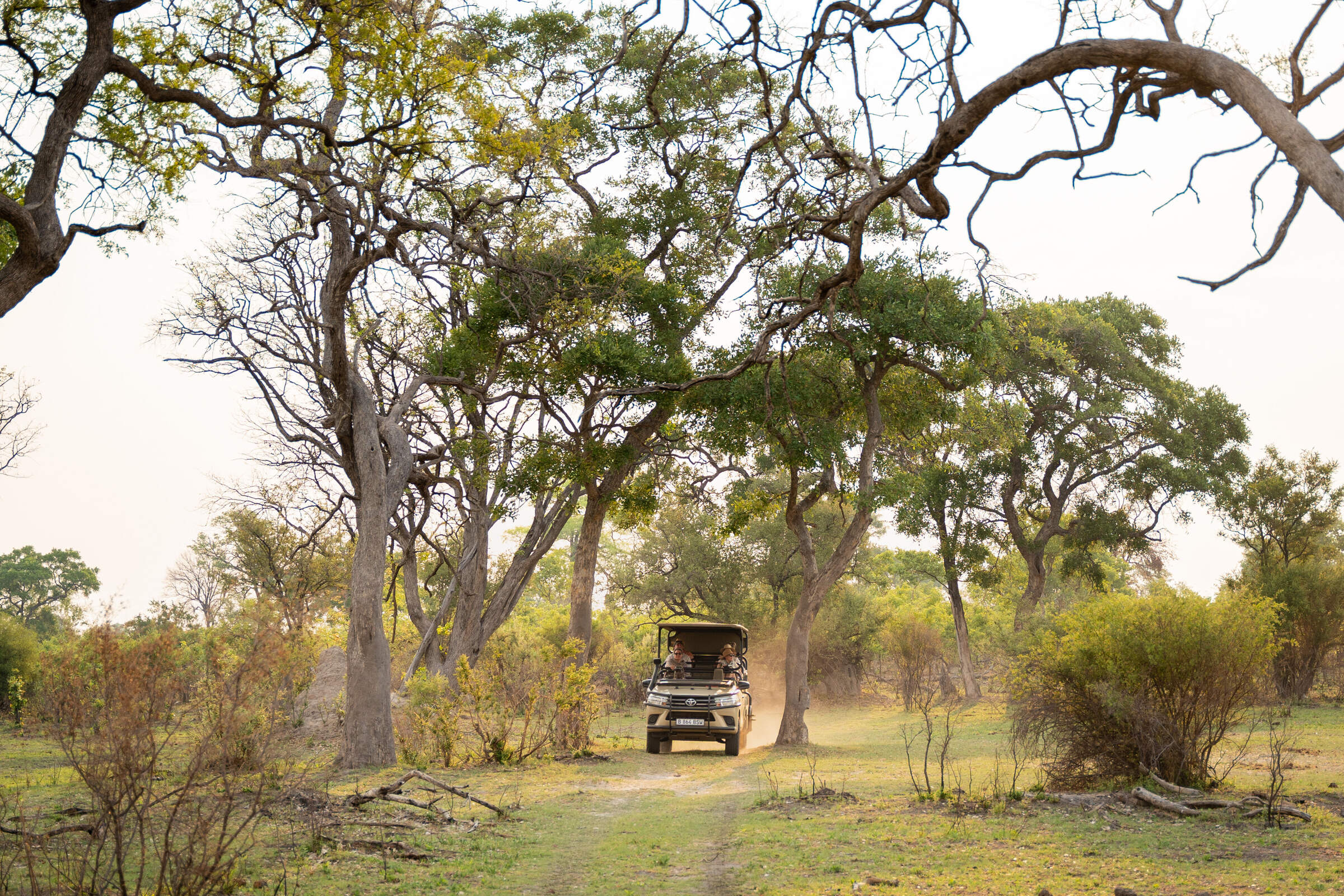
Karangoma
New for 2024, Karangoma is a classic, tented camp offering walking, canoeing and game drives, in partnership with the local Bukakwe San clan.
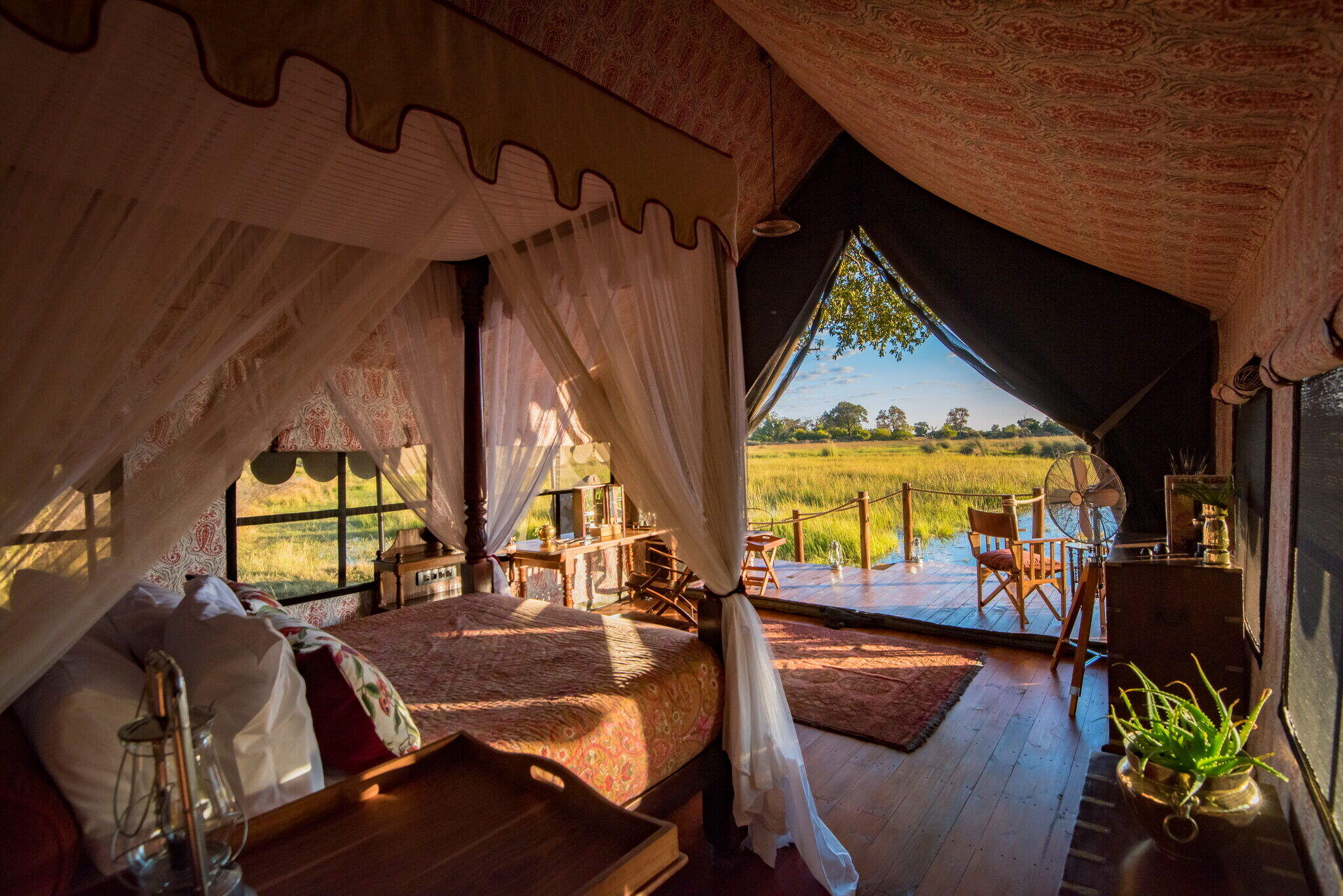
Duke’s Camp
On a remote island within a large concession, the romantic Duke's Camp and smaller Duke’s East are nestled among mature trees overlooking wildlife-rich plains and waterways of the Okavango.
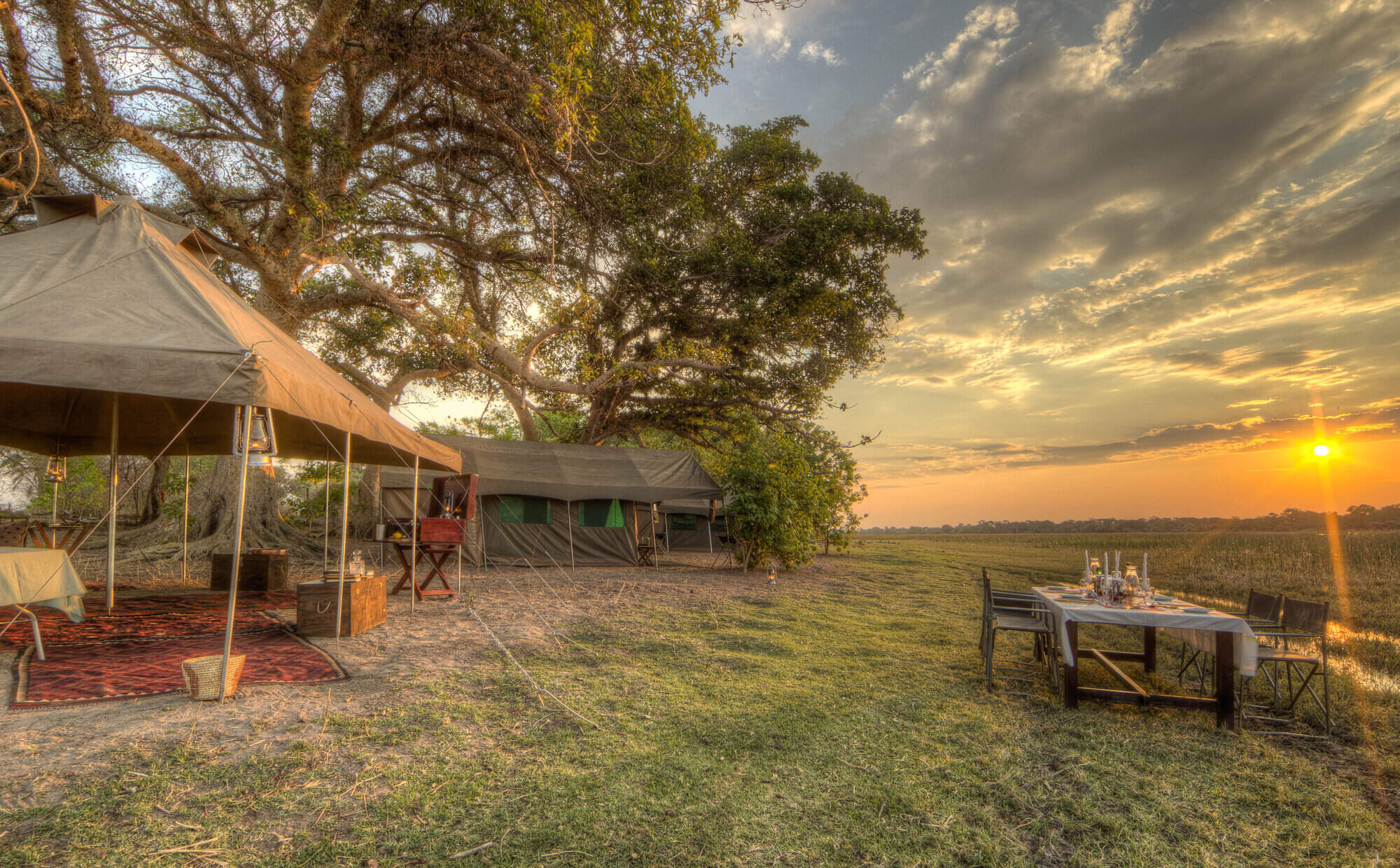
Okavango Walking Safari
The Okavango Delta Walking Safari camps in a secluded Okavango Delta Reserve where there are few roads; the ideal location for a walking trail led by an expert guide.
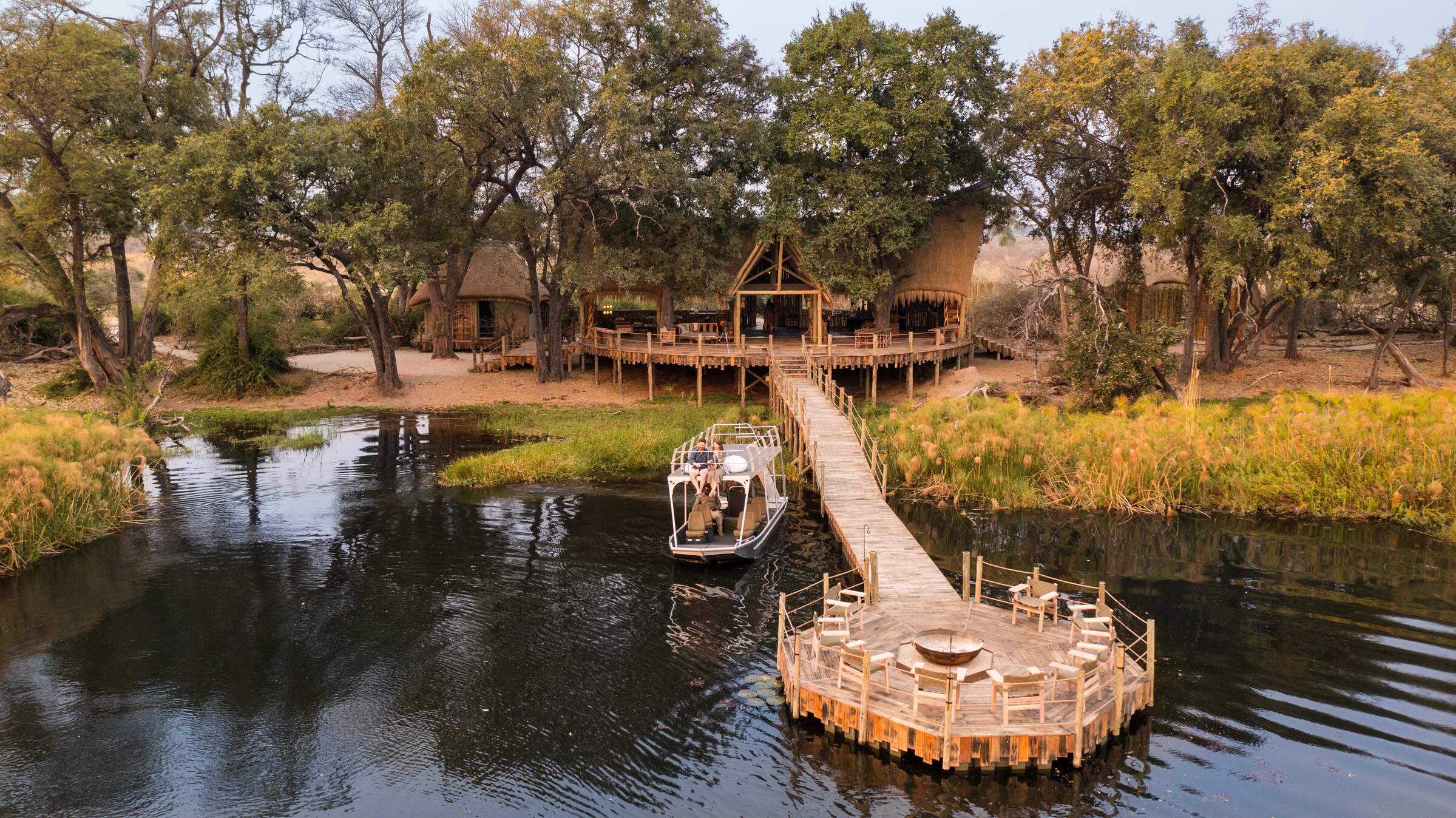
Sitatunga Island Camp
Tucked away in a pristine corner of the Okavango Delta, the exclusive Sitatunga Private Island is a water-based camp offering boating, mokoro trips and fishing.
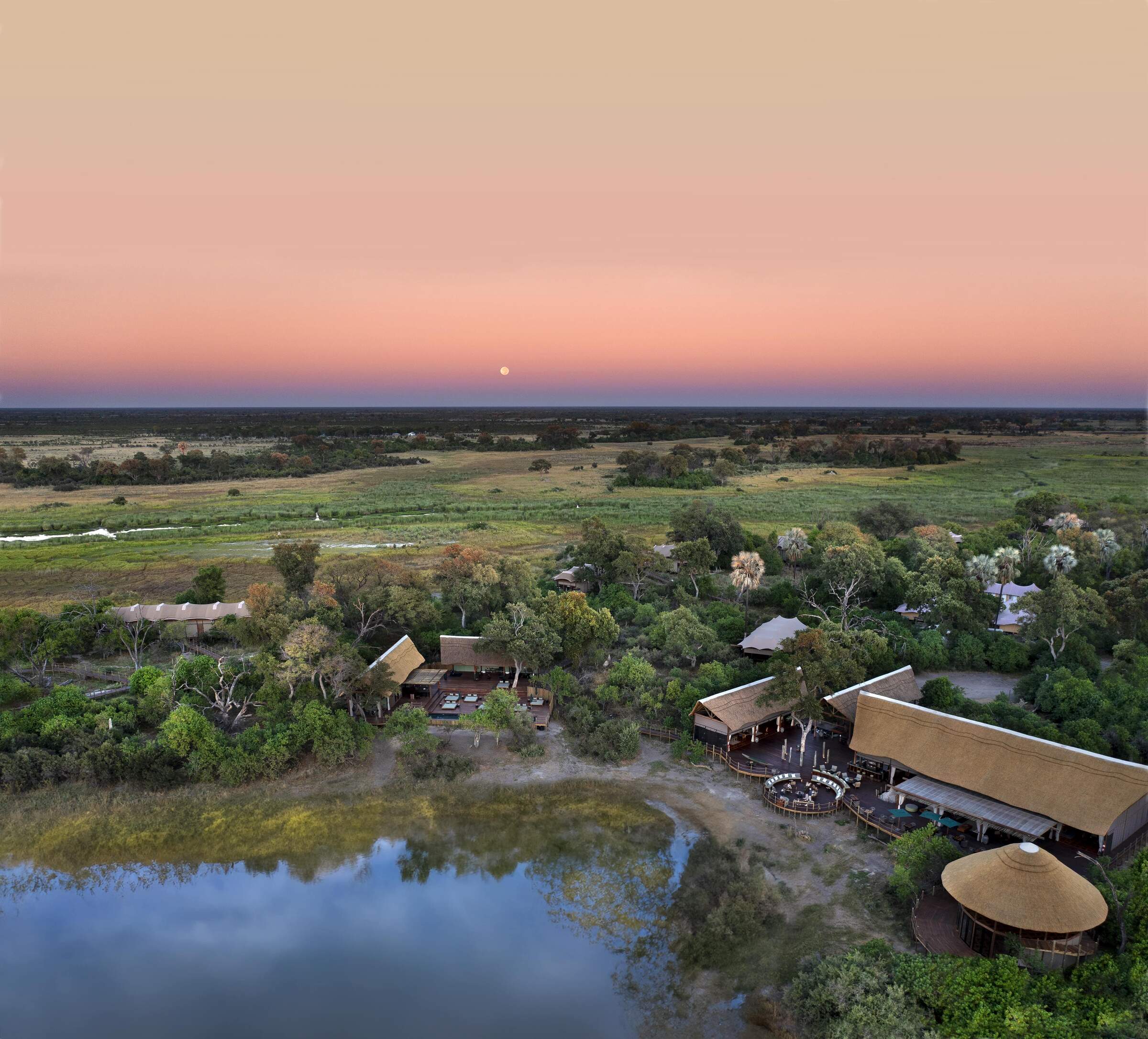
Atzaro Okavango
With a high level of tasteful luxury promised at Atzaro, we think it will be best suited to travellers seeking a touch of pampering alongside their safari.
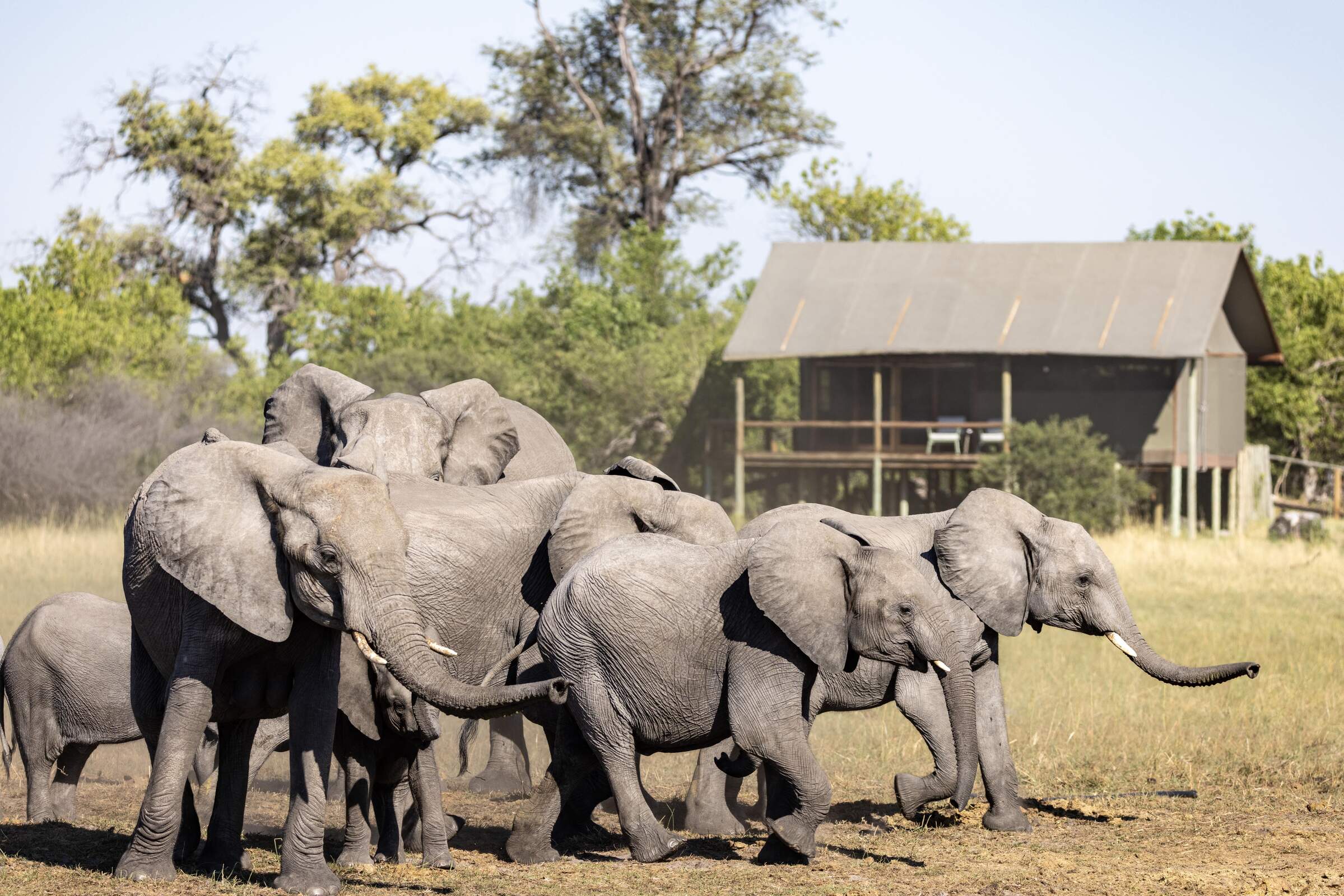
Mokolwane
Deep in the heart of the Okavango, the simple Mokolwane focuses on wildlife viewing in a large, untouched area.
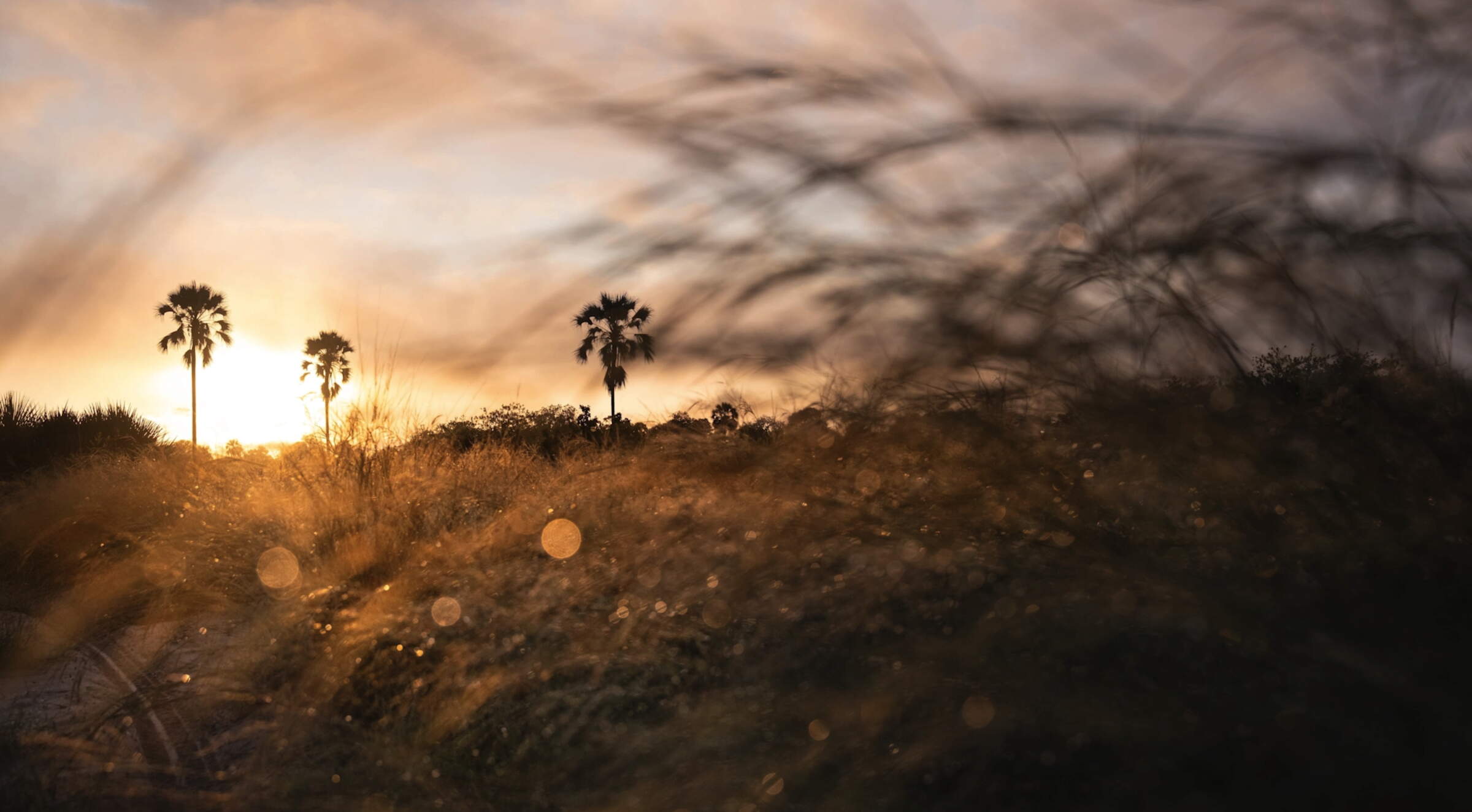
Singita Elela
Singita Elela is an exclusive safari camp on the western side of the Botswana's Okavango Delta - offering superb wildlife and water based opportunities depending on the seasonality.
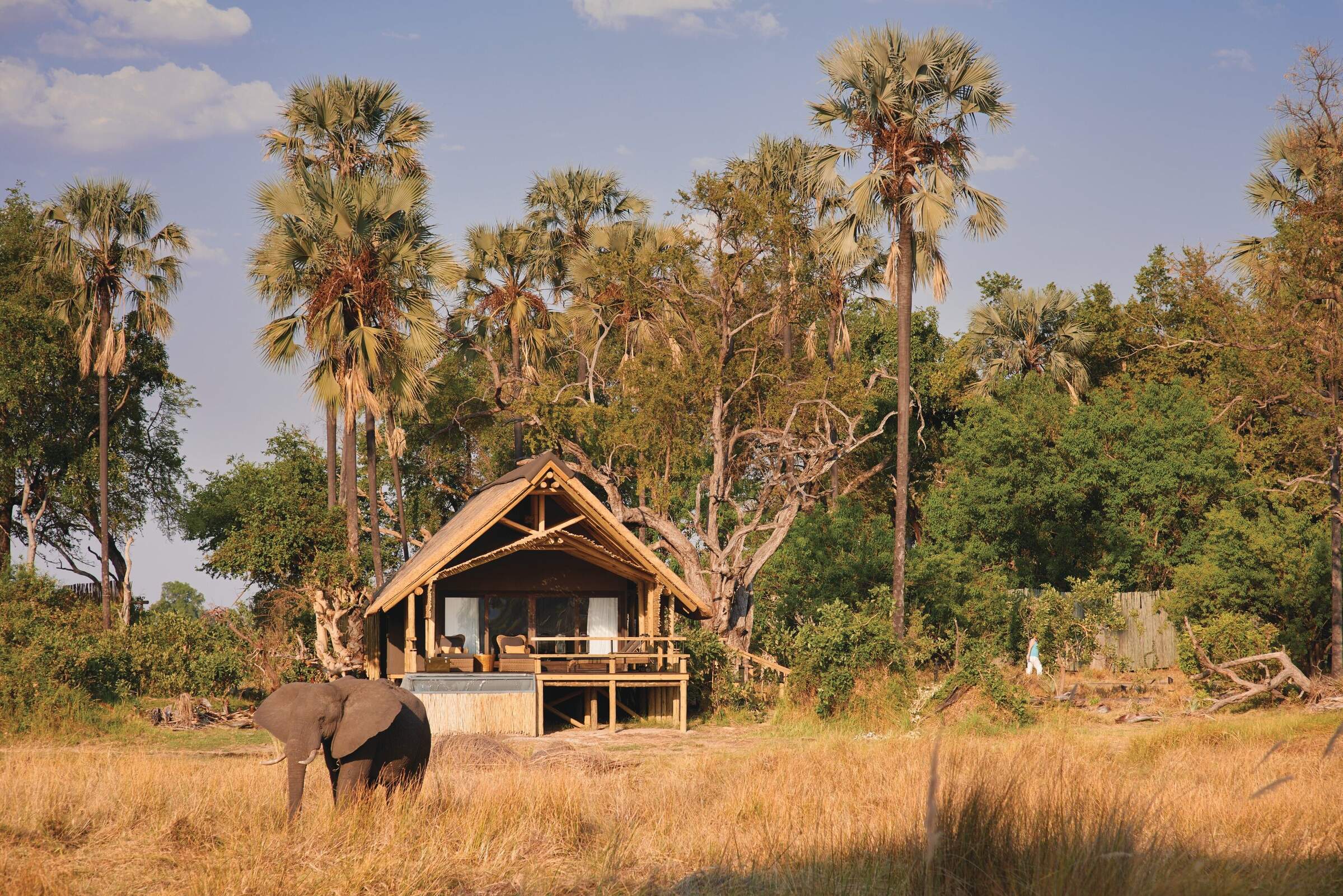
Eagle Island Lodge
Eagle Island Lodge is a luxurious camp with international-style facilities including air conditioning and intercom in each room; offering water based activities in the Okavango Delta.
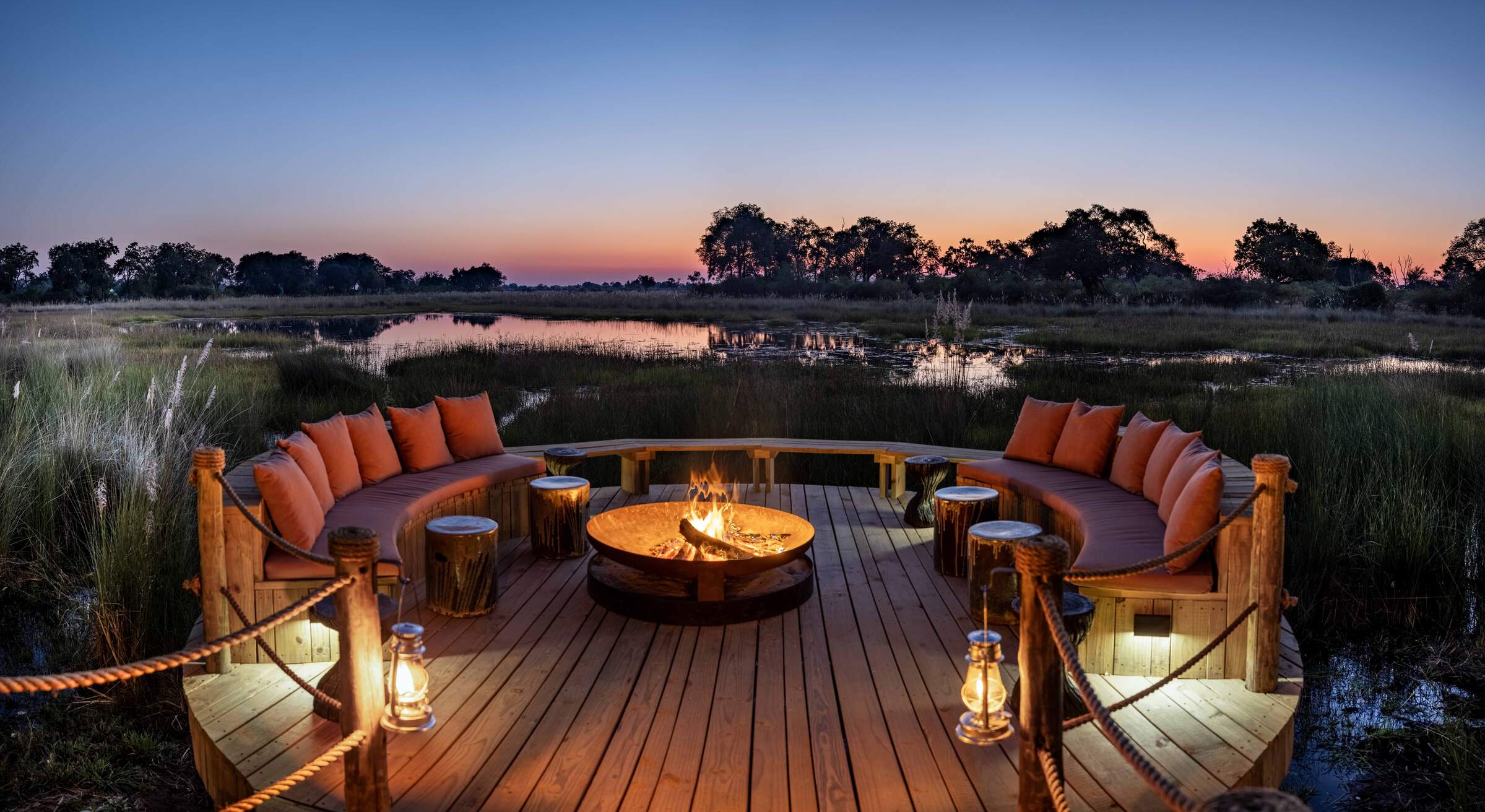
North Island Okavango
Deep in quintessentially “Okavango” territory, between deep-water and dry-land habitats, North Island focuses on a luxury safari experience with very good wildlife viewing opportunities.
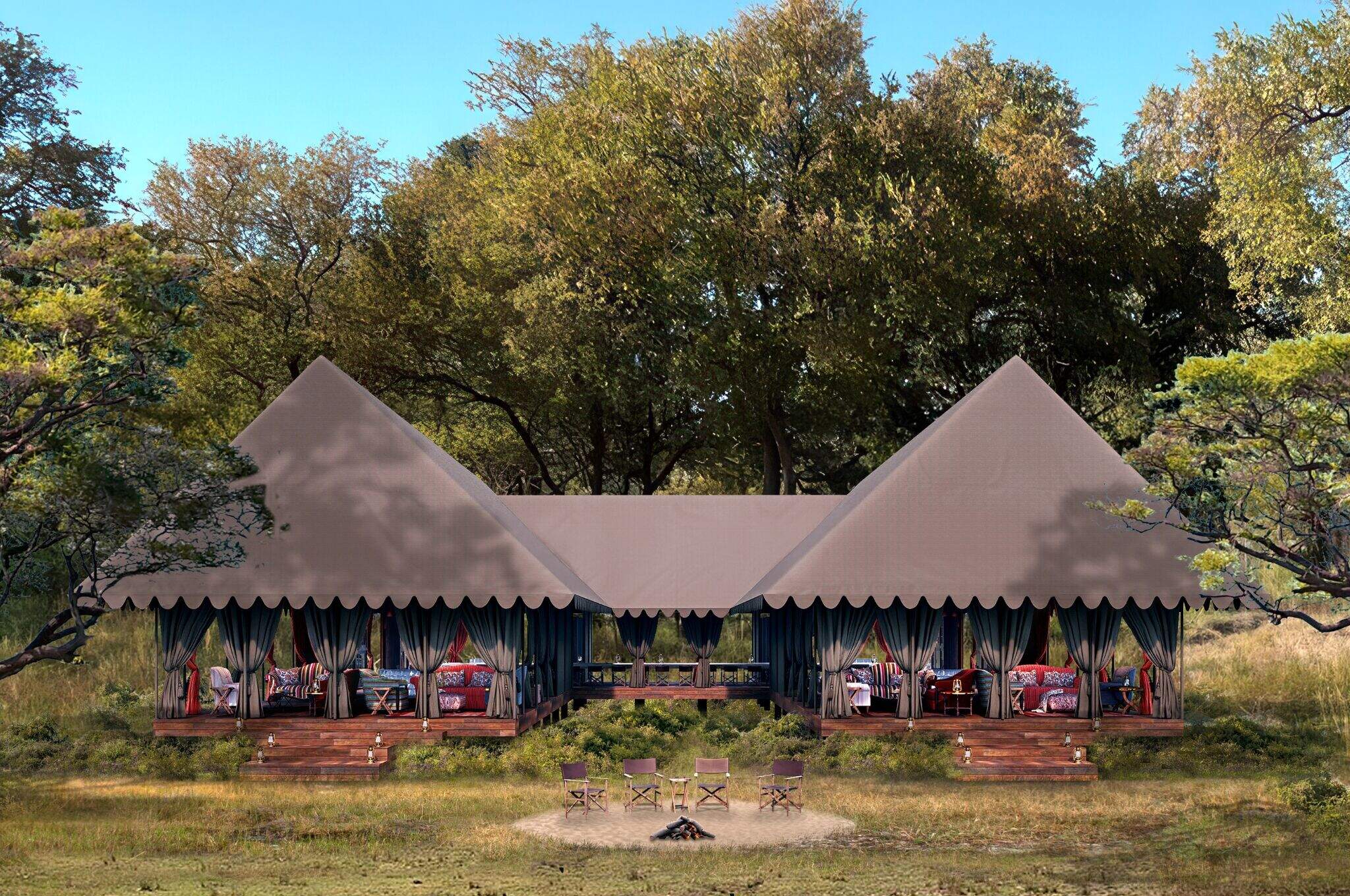
Mbamba
Deep within the northern Okavango, the classically styled Mbamba is set to open in a wildlife-rich private concession in April 2025.
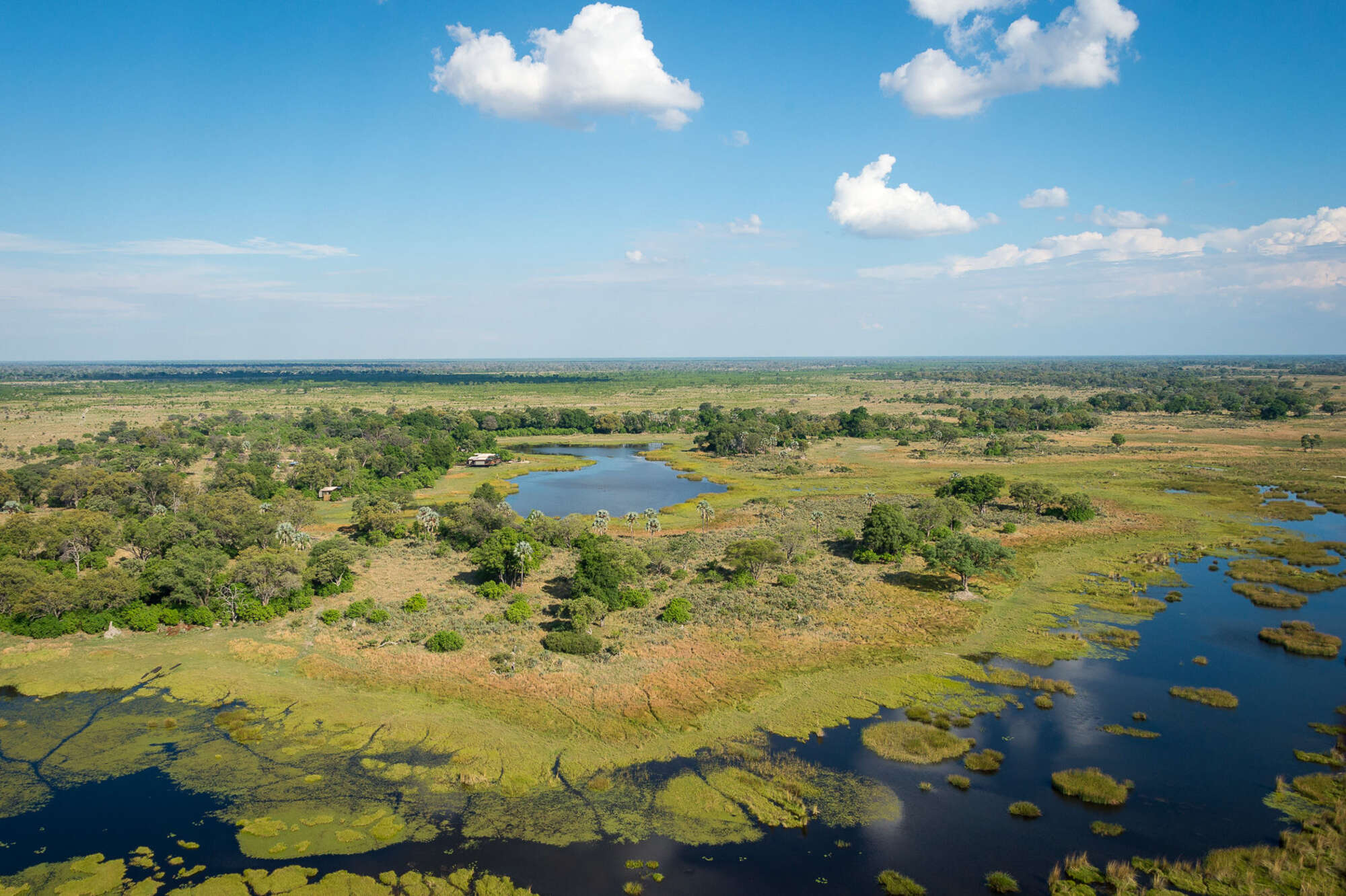
Qorokwe Camp
Luxurious and contemporary, the relatively new Qorokwe Camp is a gem in the Okavango Delta, offering land- and occasionally water-based activities in a prime wildlife area.
When to go to Okavango Delta Safari Reserves
Our month by month guide: What it's like to visit Vumbura Plains in Okavango Delta Safari Reserves
Jan
Feb
Mar
Apr
May
Jun
Jul
Aug
Sep
Oct
Nov
Dec
Okavango Delta Safari Reserves in January
January marks the peak of the rainy season in the Okavango Delta. Evening rains are often short but heavy, accompanied by occasional dramatic thunderstorms. Temperatures remain high, although cooler than the preceding months of October to December. Wildlife can be harder to spot as animals spread out across the lush floodplains.
This month is a birdwatcher’s paradise, with migratory species in abundance over flooded areas. Rising water levels in parts of the Delta make mokoro safaris possible, offering serene and immersive experiences. The vibrant greenery and dramatic skies provide stunning opportunities for photography. With relatively low rates and fewer visitors, January is ideal for those seeking a quieter, budget-conscious Botswana safari.
- Warm temperatures with frequent evening showers
- Birdlife at its most spectacular in the Delta
- Wildlife dispersed, but insects and smaller creatures abound
- Excellent availability in Delta lodges and camps
Our view
A good time to visit, with pros & cons
Weather in January
Okavango Delta Safari Reserves in February
February mirrors January’s weather patterns, with heavy rains and slightly cooler temperatures. The Delta’s landscape is at its greenest and teeming with life. Smaller animals, insects, and vibrant birdlife dominate, as many species raise their young. The rains create temporary pools and waterholes, further dispersing larger game, while thick vegetation and tall grass adds to the challenge of spotting big wildlife.
However, Moremi Game Reserve and select areas of the Delta still offer excellent game viewing opportunities. Rising water levels enhance water activities, with boat safaris providing unique access to the Delta’s watery beauty. February is particularly rewarding for photographers seeking lush landscapes and dramatic skies and birdwatchers, with many migratory species present.
- Warm with occasional thunderstorms
- Many animals with young in the Delta
- Big game dispersed throughout wetlands
- Big game dispersed, but viewing improves in drier areas
- Lower visitor numbers and great lodge availability
Our view
This is not a great time to visit
Weather in February
Okavango Delta Safari Reserves in March
March marks the gradual end of the main rainy season in the Okavango Delta. Sunny days become more frequent, with occasional afternoon thunderstorms. The Delta remains lush and vibrant, with wildlife activity increasing as animals finish raising their young and begin congregating around permanent water sources.
Rising water levels make boat safaris a highlight, offering intimate access to the Delta’s waterways. Birdwatching is excellent, with both resident and migratory species thriving. With fewer visitors, March offers a quieter, more personal safari experience.
- Rains taper off but temperatures remain warm
- Occasional small thunderstorms in Delta
- Wildlife begins congregating around water sources
- Ideal conditions for boat safaris
- Few tourists and attractive rates at camps
Our view
A good time to visit, with pros & cons
Weather in March
Okavango Delta Safari Reserves in April
April brings clearer skies to the Okavango Delta, with the landscape remaining green and lush. Night temperatures begin to drop, especially in the southern Delta. The annual floods from Angola start to flow through the northern Delta, filling channels and lagoons, creating ideal conditions for water-based activities like boat safaris.
Wildlife viewing improves as vegetation thins and predator activity increases with cooler evenings. Moremi Game Reserve and the private concessions offer rewarding game drives, and walking safaris on the larger islands, such as Chief’s Island, become popular during this time. Birdwatching remains excellent, with many migratory species still present. April’s combination of pleasant weather, wildlife activity, and relatively low rates makes it a rewarding time to visit.
- Cooler evenings and occasional light showers
- Floodwaters begin to fill Delta channels
- Predator-prey interactions increase
- Ideal for walking safaris and boat trips
- Popular shoulder season, rates fairly low
Our view
A good time to visit, with pros & cons
Weather in April
Okavango Delta Safari Reserves in May
May is a popular time to visit the Okavango Delta, marking the last month of the shoulder season. The annual floods continue to spread through the Delta, transforming the landscape. Cooler mornings and evenings encourage predator activity, while thinning vegetation makes wildlife spotting easier, though some tall grasses may still obstruct views.
May offers excellent photographic opportunities with clear, crisp air. It's a favourite time for many visitors, combining good wildlife sightings with pleasant weather. Camp bookings throughout the Delta fill up quickly during this period.
This is a perfect month for scenic flights, offering breathtaking views of the advancing floodwaters. Mokoro trips through the Delta’s tranquil waterways provide a unique perspective on the environment. Camps start to fill quickly as the Delta’s combination of pleasant weather and excellent wildlife sightings makes it a favourite among safari-goers.
- Cool mornings and evenings with little rain
- Improved game viewing as Delta grasses thin
- Predator activity increasing in drier areas
- Scenic flights and water activities highly recommended
- Last month of shoulder season for camps
Our view
A very good time to visit
Weather in May
Okavango Delta Safari Reserves in June
June signals the start of the dry season in the Okavango Delta. Days are warm, with clear skies, while mornings and evenings can be cold, occasionally reaching freezing temperatures. The annual floods reach their peak, creating spectacular conditions for water-based activities like boat safaris along the Khwai River and in private concessions.
Wildlife concentrates around permanent water sources as surface water dries up, improving game viewing. The thinning vegetation and crisp, clear air make June perfect for photography. High demand for camp bookings reflects its popularity, as this month combines great game viewing and pleasant weather.
- Warm days, cold mornings and nights
- Peak floodwaters make boat safaris unforgettable
- Wildlife congregates around permanent water sources
- Excellent conditions for photography
- High demand for camps and lodges
Our view
Fantastic: the very best time to visit
Weather in June
Okavango Delta Safari Reserves in July
July offers cool mornings and evenings with warm, sunny days, making it ideal for wildlife viewing. The floodwaters remain at their peak, providing excellent opportunities for boat safaris. Vegetation continues to thin, enhancing visibility on game drives in Moremi Game Reserve and the Okavango’s private reserves.
Large herds of elephants and buffalo are common sights as they gather near water sources. Predator sightings, including lions and leopards, increase as prey concentrates. Birdwatching is rewarding, and the crisp winter air creates stunning photographic conditions. July is one of the most popular months to visit, with many lodges fully booked well in advance.
- Comfortable days, cold mornings and nights
- Excellent game viewing and predator activity
- Moremi and Khwai areas become busy
- Private concessions offer exclusivity
- High season rates; advance bookings essential
Our view
Fantastic: the very best time to visit
Weather in July
Okavango Delta Safari Reserves in August
August remains a highly sought-after month for visiting the Okavango Delta. Nights are cool, while daytime temperatures rise gradually. Wildlife viewing is exceptional as animals concentrate near water sources, while the Delta’s floods are typically at their peak, offering picturesque settings for excellent boat safaris.
Walking safaris and game drives in areas like Moremi Game Reserve and Chief’s Island are particularly rewarding. Large herds of elephants and buffalo are common sights, and predator activity is high, with increased chances of seeing lions, leopards, and wild dogs hunting. The clear skies and lack of humidity create excellent stargazing conditions. With many travellers visiting during European and North American holidays, lodge availability can be challenging.
- Dry, warm days and cool nights in the Delta
- Fantastic wildlife viewing near water sources
- Excellent opportunities for game drives and boat safaris
- Cloudless skies, spectacular stargazing
- High demand for accommodation – book early
Our view
Fantastic: the very best time to visit
Weather in August
Okavango Delta Safari Reserves in September
September is a favourite for many safari-goers in the Okavango Delta. Daytime temperatures rise, but nights remain cool. The landscape transforms as greenery fades, and hazy conditions create dramatic sunsets. Wildlife viewing peaks as animals cluster around permanent water sources, with especially large numbers of elephants and buffalo. This concentration of prey attracts predators, increasing chances of witnessing exciting hunts.
The return of migratory birds enhances birdwatching. Water levels begin to recede, but boat cruises are still possible. Dusty conditions may challenge photographers, but the stunning landscapes and wildlife action more than make up for it.
- Warm days, cool nights in the Delta
- Prime month for Okavango wildlife viewing
- Migratory birds return, enriching birdwatching
- Spectacular sunsets and dramatic scenery
- High season rates, many Delta camps full
Our view
Fantastic: the very best time to visit
Weather in September
Okavango Delta Safari Reserves in October
October is the hottest and driest month in the Okavango Delta. Wildlife concentrates around the last remaining water sources, creating some of the most dramatic game viewing opportunities of the year. Predator-prey interactions are frequent and visibility is excellent, making for thrilling safaris.
Walking safaris are particularly rewarding, especially on smaller islands, but early starts are essential to avoid the midday heat. Towards the end of the month, the first rains may bring relief and begin rejuvenating the parched landscape. Despite the heat, October offers excellent big-game viewing and dramatic photographic moments of animal interactions.
- Hot days, with late-month chances of rain
- Outstanding big-game viewing near water sources
- Water activities limited as floods recede
- Walking safaris provide unique experiences
- Final month of the peak safari season
Our view
Fantastic: the very best time to visit
Weather in October
Okavango Delta Safari Reserves in November
November marks the start of the green season in the Delta. Rising humidity and temperatures often lead to the first heavy rains; these are typically short, heavy showers in the late afternoon or night, creating spectacular scenes and bringing a flush of green to the parched landscape. Wildlife begins to disperse as waterholes refill, but game drives still offer rewarding sightings.
Water levels may be low, limiting boat activities, but November is exceptional for birdwatching, with the arrival of many migratory species. Scenic flights highlight the contrast between dry and wet areas. The first two weeks are popular for travellers seeking good game viewing at lower rates as the Delta transitions into its shoulder season.
- Hot, humid days in the Delta
- Dramatic rain showers , increasing as month progresses
- Migratory birds arrive in abundance
- Wildlife watching good, but less predictable
- Shoulder season offers mid-range rates
Our view
A good time to visit, with pros & cons
Weather in November
Okavango Delta Safari Reserves in December
December sees the rainy season in full swing across the Okavango Delta, bringing some respite from high temperatures. Game viewing becomes more challenging as wildlife disperses, but great sightings can still be had. The landscape transforms dramatically, with lush vegetation sprouting across the Delta. This period is excellent for birdwatching, with numerous migratory species present.
Water levels begin to rise, gradually improving conditions for boat safaris. The green season offers unique photographic opportunities, with dramatic skies and newborn animals. December is ideal for visitors seeking a more intimate Delta experience, with fewer tourists and lower rates at many camps and lodges. The combination of wildlife, birdlife, and scenic beauty makes it a rewarding time to visit.
- Warm temperatures
- High chance of rain in short, heavy storms
- Wildlife more dispersed across Delta
- Game viewing more challenging in wetlands
- Low-season rates and fewer visitors in most Delta camps
Our view
A good time to visit, with pros & cons
Weather in December

Looking for inspiration on where to travel next?
Visit our trip chooser to explore your options and find inspiration for your perfect African adventure
Inspire me